HOW ISRAEL USED AN AI PROGRAM TO OBLITERATE

DISPLAY UNTIL 2/29/2024







































































































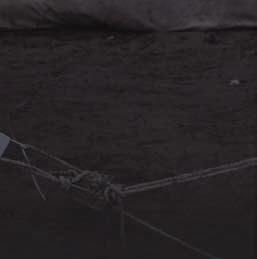




























DISPLAY UNTIL 2/29/2024


































































































































Blew Up Israeli Houses on Oct. 7, Says Israeli
Masterful Propaganda of “Deadliest Day for Jews Since the Holocaust”—Thomas Suárez
Roosevelt and the 75th Anniversary of the Universal Declaration of Human Rights
of Thousands Defy Campaign of Lies and Intimidation in Britain John Gee
Air Strikes and Apple Strudels: Stuck in Jerusalem With My Father Diana Safieh
Democratic Erosions in Türkiye
Author Describes What Prompted Her to Write Gendered Islamophobia: My Journey With a Scar(f) Candice Bodnaruk
ON THE COVER: A mother covers her child’s face trying to protect it from the smoke of burning homes in Gaza City on Nov. 10, 2023. More than 1.8 Palestinians were ordered to leave northern Gaza to flee south, which is crammed with displaced people without enough food, water, shelter or toilets.
PHOTO BY BELAL KHALED/ANADOLU VIA GETTY IMAGES
Israel Apologists Relentlessly Gaslight and Attack Our Sense of Reality, Caitlin Johnstone, www.caitlinjohnstone.com.au OV-1
A Tale of Two Sets of Dead Babies: The Preemies of Gaza And Imaginary Beheadings, Juan Cole, www.juancole.com
Gaza War: Israeli Government Has Haaretz Newspaper in its Sights as it Tightens Screws on Media Freedom, Colleen Murrell, www.theconversation.com
Israel’s War Crimes in Gaza Are by Design, Not Default, Marwan Bishara, www.aljazeera.com OV-5
Gaza’s Christians Fear “Threat of Extinction” Amid Israel War, Federica Marsi and Ruwaida Amer, www.aljazeera.com
Guterres, Gaza and the Consequences of Countering “Israelspeak,” Belen Fernandez, www.aljazeera.com
Israel Arrests Almost as Many Palestinians As it Has Released During Truce, Zena Al Tahhan, www.aljazeera.com
61 DIPLOMATIC DOINGS: Pakistani Ambassador Advocates for Kashmiri Self-Determination
62
71
72
(A Supplement to the Washington Report on Middle East Affairs available by subscription at $15 per year. To subscribe, call toll-free 1-888-881-5861.)
Compiled by Janet McMahon
“We’re on the Right Side of History”: Celtic’s Growing Feud Over Palestine, Liam O’Hare, www.aljazeera.com OV-9
“Boycott Israel” Breathes New Life Into 100-Year-Old Egyptian Soda Brand, Yasmin Shabana, www.aljazeera.com
Tel Aviv’s Man in Washington, James Carden, www.antiwar.com
Guardian Removes bin Laden Letter to America After Viral Resurgence, Olivia Rosane, www.commondreams.org
Adhering to the U.N. Charter: Barbados First and the United States Last, Jeffrey D. Sachs and Guillaume Lafortune, www.commondreams.org
In the Face of Death, Destruction and Displacement, Beauty Plays a Vital Role in Gaza, Stephanie Acker, www.theconversation.com
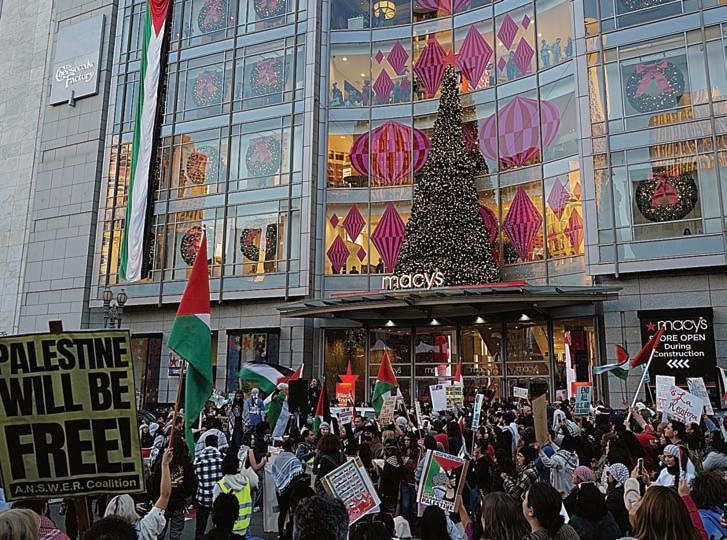
Amid constant bombardment by Israel’s army, the U.N. Security Council was meeting to vote on an immediate humanitarian ceasefire in Gaza. U.N. Secretary General António Guterres invoked Article 99 of the U.N. Charter, saying hostilities threatened “international peace and security...The situation is fast deteriorating into a catastrophe with potentially irreversible implications for Palestinians as a whole and for peace and security in the region. Such an outcome must be avoided at all cost.”
Despite Israel’s claim of establishing “safe” zones, its army is attacking Khan Yunis, Rafah and other cities in the south of Gaza, where over 1.8 million Palestinians, more than 80 percent of Gaza’s 2.3 million people, were told to go in October. Now Israel has declared a tiny, 2.5 sq. mile strip of desolate terrain in al-Mawasi as a “safe” zone. According to Al Jazeera, “That is an area half the size of London’s Heathrow Airport. About 61 million passengers passed through Heathrow in 2022, or about 167,000 a day on average. In other words, the population density in the ‘safe’ part of al-Mawasi would be more than 20 times that of Heathrow—even if all of the airport’s daily passengers were present there at the same time.” Ramallah-based legal expert Bushra Khalidi told Al Jazeera, “Gaza was already overpopulated…[now] we’re talking about 1.8 million people in an airport.” Khalidi added that cholera and gastroenteritis are rapidly spreading due to the congested conditions. And this nightmare version of Heathrow has no food, water, shelter, electricity, internet or bathrooms. In fact, there’s an...
As the world witnesses Israel’s obliteration of Gaza with American-made bombs and missiles, countless activists have rolled up their sleeves, donned their keffiyahs and tatreez, left their comfort zones and gotten to work (see pp. 13-19). People have taken to the streets to protest, launched hunger strikes, interrupted hearings and fundraising speeches, written impassioned letters to
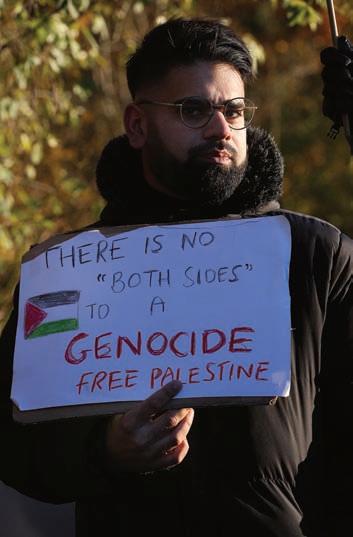
In Congress, lawmakers—notoriously slow to respond to the voices of constituents— are finally demanding a ceasefire and an end to the “blank check approach” to Israel. As we go to press, an emergency $14.3 billion spending bill for Israel is being blocked by Republican senators (OK, we admit it, for the wrong reasons). Rep. Cori Bush (DMO), a former nurse, joined her fellow “squad” members and Doctors Without Borders on Capitol Hill on Dec. 7 to call for a ceasefire: “The targeting of civilians is a war crime, the targeting of medical facilities is a war crime, the starvation and withholding of water and electricity is a war crime....We refuse to be silent.” She speaks for all of us who fear an effort to ethnically cleanse the territory may be under way.
lawmakers and media, and tried to meet in person with their elected officials. It may just end this carnage.
Accepted without question the Israeli narrative and repeated unsubstantiated claims of atrocities committed by Hamas fighters in the aftermath of the Oct. 7 attack. Today, thanks to fact-checkers, whistle-blowers and meticulous investigations (see pp. 3235 and “Other Voices” articles), these tall tales have been debunked by Electronic Intifada, Mondoweiss, Al Jazeera and other alternative media. To ensure access to this reporting, we are offering “Other Voices” for free to all subscribers this issue. We hope you subscribe to the supplement for just $15 a year. While Israel has cut electricity and internet access to Gaza and even killed reporters, it hasn’t managed to block the images and words coming from Gaza and the West Bank. It is slowly dawning on journalists that they’ve been hoodwinked and fed propaganda to distract them from reporting on the catastrophic scale of death and destruction inflicted on Gaza (see pp. 24-26).
We hope to heaven that the world has united behind peace on earth and agreed to a Christmas/ Hanukkah/ New Year’s permanent ceasefire and that Israel’s 16-year siege on Gaza is lifted, with massive aid miraculously pouring into the moonscape that is now Gaza. But this story won’t end until Palestinians can enjoy peace, dignity and freedom wherever they want (and not get shot in their homeland, nor on a Thanksgiving weekend in Vermont).
Even as construction and renovation is underway, Middle East Books and More has been supplying Palestinian keffiyahs, flags, olive oil and books to supporters around the world. We’ve also received huge shipments of Palestinian pottery from Hebron via Jerusalem. In fact, we can hardly keep up with demand as people show solidarity. We are also sending masses of magazines to events and potential subscribers. Unprecedented traffic is flowing to our websites, <www.wrmea.org> and <www.MiddleEast Books.com>. We thank you for your support, subscriptions and donations because, as we’re witnessing in real time, it’s more essential than ever to provide accurate information to…
Make a Difference Today!
Executive Editor: DELINDA C. HANLEY
Managing Editor: DALE SPRUSANSKY
Contributing Editor: IDA AUDEH
Other Voices Editor: JANET McMAHON
Middle East Books and More Director: NATHANIEL BAILEY
Middle East Books and More Assistant Director: JACK MCGRATH
Finance & Admin. Dir.: CHARLES R. CARTER
Art Director: RALPH UWE SCHERER
Founding Publisher: ANDREW I. KILLGORE (1919-2016)
Founding Exec. Editor: RICHARD H. CURTISS (1927-2013)
Board of Directors: HENRIETTA FANNER
JANET McMAHON
JANE KILLGORE
Washington Report on Middle East Affairs (ISSN 87554917) is published 7 times a year, monthly except Jan./Feb., March/April, June/July, Aug./Sept. and Nov./Dec. combined, at 1902 18th St., NW, Washington, DC 20009-1707. Tel. (202) 939-6050. Subscription prices (United States and possessions): one year, $29; two years, $55; three years, $75. For Canadian and Mexican subscriptions, $35 per year; for other foreign subscriptions, $70 per year. Periodicals, postage paid at Washington, DC and additional mailing offices. POSTMASTER: Send address changes to Washington Report on Middle East Affairs, P.O. Box 292380, Kettering, OH 45429. Published by the American Educational Trust (AET), a nonprofit foundation incorporated in Washington, DC by retired U.S. foreign service officers to provide the American public with balanced and accurate information concerning U.S. relations with Middle Eastern states. AET’s Foreign Policy Committee has included former U.S. ambassadors, government officials, and members of Congress, including the late Democratic Sen. J. William Fulbright and Republican Sen. Charles Percy, both former chairmen of the Senate Foreign Relations Committee. Members of AET’s Board of Directors and advisory committees receive no fees for their services. The new Board of Advisers includes: Anisa Mehdi, John Gareeb, Dr. Najat Khelil Arafat, William Lightfoot, George W. Aldridge and Susan Abulhawa.
The Washington Report on Middle East Affairs does not take partisan domestic political positions. As a solution to the Palestinian-Israeli dispute, it endorses U.N. Security Council Resolution 242’s land-for-peace formula, supported by nine successive U.S. presidents. In general, it supports Middle East solutions which it judges to be consistent with the charter of the United Nations and traditional American support for human rights, self-determination, and fair play. Material from the Washington Report may be reprinted without charge with attribution to Washington Report on Middle East Affairs. Bylined material must also be attributed to the author. This release does not apply to photographs, cartoons or reprints from other publications.
Indexed by ProQuest, Gale, Ebsco Information Services, InfoTrac, LexisNexis, Public Affairs Information Service, Index to Jewish Periodicals, Ethnic News Watch, Periodica Islamica.
CONTACT INFORMATION: Washington Report on Middle East Affairs Editorial Office and Bookstore: 1902 18th St. NW, Washington, DC 20009-9062 Phone: (202) 939-6050 • (800) 368-5788 Fax: (202) 265-4574
E-mail: wrmea@wrmea.org • bookstore@wrmea.org circulation@wrmea.org advertising@wrmea.org • donations@wrmea.org Web sites: http://www.wrmea.org http://www.middleeastbooks.com
Subscriptions, sample copies and donations: P.O. Box 292380, Kettering, OH 45429 Phone: (800) 607-4410 • Fax: (937)-890-0221 Printed in the USA
In the wake of the Gaza crisis, the stark contrast between the principles enshrined in the U.S.’ foundational documents and the actions of Congress beg reflection. As Israel escalates its assault on Gaza, Congress’ move to censure Palestinian American Rep. Rashida Tlaib (D-MI) sheds light on the troubling “Palestine exception” to free speech.
What's particularly striking is the poignant response from 87-year-old Holocaust survivor Marione Ingram. Her persistant and impassioned plea at the White House, urging President Joe Biden to call for a ceasefire, resonates deeply. Ingram’s harrowing personal history drives her condemnation of the violence in Gaza, while hailing Tlaib as a hero for advocating for peace.
Tlaib’s stance is hardly controversial or an outlier. More than 1,000 Jewish academics, artists and clergy, including esteemed scholars like Omer Bartov and Ilan Pappé, have united in a resounding call for an immediate ceasefire and an end to the Israeli occupation.
These collective voices underscore a crucial message: opposing ongoing atrocities is not an act of anti-Semitism, but a vital imperative gleaned from history. The phrase “never again,” cherished by Holocaust survivors and their descendants, should embrace the protection of all lives, irrespective of nationality or ethnicity.
Jajit Singh, Los Altos, CA
Speaking of founding principals, we wonder why Congress and the White House have been largely silent about Israel’s rampant killing of journalists. The Committee to Protect Journalists (CPJ) reports that the month following Oct. 7 was “the deadliest month for journalists since CPJ began gathering data in 1992.” Indeed, as we went to press on Dec. 7, we received word that Dr. Refaat Alareer, a journalist, author and co-founder of We Are Not Numbers (WANN), was killed by Israel. We are proud to work closely with WANN to offer readers vital reporting
from Gaza (see p. 20) and deeply mourn Alareer’s murder. On Nov. 1, he posted a final testament on Twitter, which ended: If I must die let it bring hope let it be a tale
Canadian Prime Minster Justin Trudeau recently cautioned Canadians against heated exchanges over the ongoing GazaIsrael hostilities. Trudeau “stressed the importance of free speech,” even though his government has embraced a working definition of anti-Semitism that actually stifles open expression and support for the BDS movement. This embrace encourages the false notion that even accurate criticism of Israeli conduct is anti-Semitic.
Unfortunately, Canada’s Middle East policy ignores the Geneva Conventions, international law and United Nations resolutions regarding Israel’s behavior toward Palestinians.
For example, Canada quietly accepts Israel’s gradual annexation of the Occupied Palestinian Territories (OPT), where over three million Palestinians endure martial law, as well as Israeli military control over Gaza’s land borders, coastline and airspace.
Operation Proteus is the Canadian military mission in the OPT. Behind the façade of peace enhancement, Canada is committed to supporting and training the security forces of the Palestinian Authority, a collaborationist administration whose governance of the OPT primarily serves the Palestinian elite and facilitates Israeli seizures of Palestinian land.
Canada signed the Canada-Israel Free Trade Agreement in 1997 for political and economic reasons. Canada’s free trade accord with Israel includes the illegally occupied West Bank. The trade agreement is thus based on the areas Israel maintains territorial control over, not on internationally-recognized borders.
Trudeau has not commented on the many Canadian-Israeli dual nationals who exploit a loophole in the 1985 For-
eign Enlistment Act serving in the Israeli military. Although, no Canadian would be permitted to resist Israel military aggression in Gaza or the OPT. It is glaringly obvious that official Canada is indifferent to the fate of Palestinians in the OPT and Gaza.
Morgan Duchesney, Ottawa, ON
I would like to comment on Ron Forthofer’s excellent article, “Blatant Hypocrisy in Response to Russian, Israeli and U.S Aggressions” in the October issue. Forthofer writes, “The U.S. makes clear its shameful hypocrisy about war and occupation in its contrasting treatments of actions taken by Russia and Israel, as well as of Ukrainians and Palestinians.”
Well, I would like to add this is not the first time that the U.S. showed its hypocrisy and double standards in foreign affairs. Remember Yugoslavia (Serbia-Kosovo) in 1999? Why did the U.S. and NATO bomb Yugoslavia for 78 days for Serbia’s alleged ethnic cleansing of Albanians in Kosovo, but never intervene on behalf of Palestinians who have been going through non-stop genocide for the last 75-plus years? Why did the U.S. and most of the world recognize Kosovo’s independence but not Palestine’s? And back in 2021, the hypocritical Israelis had the chutzpah to recognize Kosovo’s independence and Kosovo had the chutzpah to not only recognize Israel’s independence but also become the first Muslim-majority country to open their embassy in Jerusalem.
Forthofer writes at the end of the article, “Ukraine seems to have studied the Israeli playbook on how to control the narrative.” I would like to add a reminder that Ukrainian President Volodymyr Zelenskyy said Ukraine will become a “big Israel.”
Yehuda Littmann, Brooklyn, NY
Once again the Palestinians have committed hari-kari. I’ll say it again: of course they have a right to resist with armed force, but it’s a bad strategy, especially when it involves attacking civilians. It just feeds the Zionist entity-U.S. propaganda machine,
Send your letters to the editor to the Washington Report, P.O. Box 53062, Washington, DC 20009 or e-mail <letters@wrmea.org>.
with ever more dire consequences for Palestinians. The Palestinians appear to say, “Butt out—we’ll figure it out!” Well, after 75 years, they’re not figuring it out, it’s only getting worse.
Dale Carnegie of How to Win Friends and Influence People fame wrote, “Do not do the impulsive thing—it is always wrong.” In this case, indiscriminate violence was the wrong strategy. What’s a better strategy? Perhaps a Palestinian has answered that: Dr. Mustafa Barghouti. But will they hear, much less heed, his advice?
Meanwhile this magazine, despite its general excellence, continues to use some of the euphemistic red herring terms of the Zionist entity such as “Israel Defense Forces.” As you otherwise document so well, the Zionist entity’s armed forces are wolves in sheep’s clothing. They’re not about “defense.” They’re all about aggression, occupation, dispossession, ethnic cleansing, murder and apartheid. Using the language of the criminal validates the criminal. Please cut it out or count me out.
Gregory DeSylva, Rhinebeck, NY
You will see in this issue that we have stopped using the term “Israel Defense Forces” (except where reprint agreements forbid us from altering the text). While this is the official name of the Israeli military, we agree using alternative descriptors such as “Israeli occupation forces” provides greater context and clarity.
Regarding the issue of violent resistance, in this issue (see p. 57) Katie Halper discusses the discourse (or lack thereof) surrounding the Palestinian non-violent movement: “I think it’s really important to remind people—look at what happens when there is non-violent resistance. Look at how Israel works to make BDS—the Boycott, Divestment and Sanctions movement—illegal. Israel itself is doing everything it can to make non-violent resistance impossible, including, of course, killing non-violent resisters.” ■
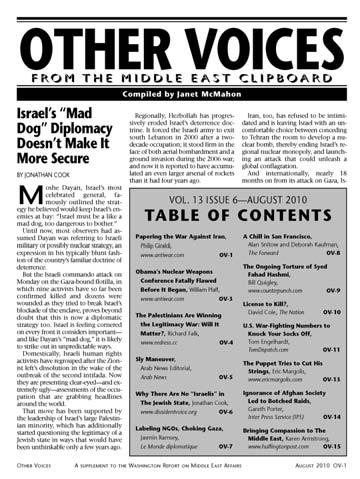
OTHER VOICES is an optional 16-page supplement available only to subscribers of the Washington Report on Middle East Affairs. For an additional $15 per year (see postcard insert for Washington Report subscription rates), subscribers will receive Other Voices inside each issue of their Washington Report on Middle East Affairs. Back issues of both publications are available. To subscribe, telephone (800) 607-4410, e-mail <circulation@wrmea. org>, or write to P.O. Box 292380, Kettering, OH 45429.
BEEN RESISTING the Israeli colonial war machine for 75 years, and that resistance took a dramatic turn on Oct. 7, 2023.
On that day, an audacious Hamas military operation (Operation alAqsa Flood) allowed Gazans to breach if only briefly Israel’s 17-year siege of the Gaza Strip. Militants paraglided into areas beyond the fence separating the Gaza Strip from Israel; others cut the fence and drove through on motorcycles and in trucks. They entered kibbutzim in the south, engaged with Israeli military forces, and took back to Gaza about 240 prisoners of war to exchange for Palestinian prisoners in Israeli jails. The Israelis claimed that Hamas killed 1,400 civilians but then revised the number to 1,200 when it realized that 200 of those burned beyond recognition were in fact Palestinians and not Israelis; the Apache helicopter pilots could not tell Palestinians and Israelis apart and torched them all. An Electronic Intifada article published on Nov. 19 deconstructs Israeli lies about the event.
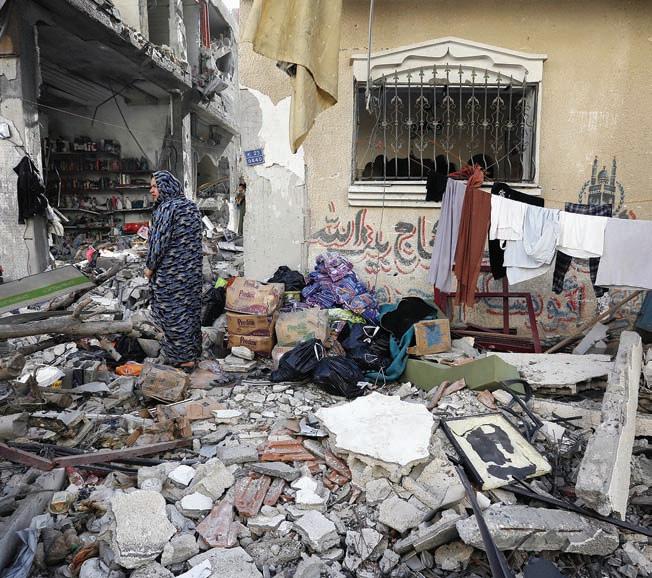
During the third day of the humanitarian pause, on Nov. 26, 2023, Palestinians are trying to carry on with their daily lives amid the wreckage of their homes in Khan Yunis, Gaza after Israeli attacks.
By Ida Audeh
The U.S. media would have us believe that the Oct. 7 attack was “unprovoked.” Omitted from the framing is any reference to Israel’s 75 year colonial regime, which has always employed ethnic cleansing and other forms of violence to keep the indigenous Palestinians in check; the medieval siege and blockade it has imposed on Gaza since 2007, making it nearly impossible to leave without hard to secure permits (yes, a pass system is in place in the Israeli-occupied Palestinian territories in the 21st century); and its bombardment of Gaza. Can we really call what Israel does in Gaza—in 2008, 2012,
2014, 2021 and now 2023—war?
For months prior to the October surprise attack and continuing to the present, Israel had been unleashing a reign of terror in the West Bank, with settlers backed by the army conducting pogroms whenever they please and violating the sanctity of the al-Aqsa Mosque and making it offlimits to most Palestinians. Hamas cited these facts as triggers for its Oct. 7 operation.
Israel responded with genocidal rage. For years, Israelis have lamented the presence of Palestinian citizens in the state, a result of a suboptimal (in their view) Nakba in 1948; Israel’s leaders have on numerous occasions promised to deliver another Nakba to Palestinians that would rectify that careless oversight by the state’s founders. In 2023 the world sees Israel moving to deliver on that promise.
Two days after the attack, Israel’s defense minister announced that food, fuel and electricity would be prevented from reaching Gaza and its 2.3 million residents, offering a textbook definition of genocide. In fact, Israel’s genocidal intent is easy to document because its leaders are not shy about expressing it. Yoav Gallant, the Israeli war minister, announced on Oct. 11, “[the military] will annihilate everything,” and Giora Eiland, a former national security adviser stated, “Gaza will become a place where no human being can exist.” Likud Party member of the Knesset Ariel Kallner called for “a Nakba that will overshadow the Nakba of ’48.” Other examples are easy to find; just ask Google.
Israel’s stated objective, to eradicate Hamas, has little chance of succeeding for obvious reasons: how do you eradicate a movement
born from resistance to oppression unless you remove the oppressive conditions, which colonial Israel is incapable of doing? Its other goal, to empty the Gaza Strip by pushing Gazans into the Sinai Desert (more ethnic cleansing), is not likely to succeed either. Egypt is unwilling and Gazans, the majority of whom were ethnically cleansed in 1948 from towns in the area attacked on Oct. 7, will resist a repeat of that experience. (Israel is eager to empty the Gaza Strip of pesky Gazans in part to facilitate its seizure of natural gas reserves off the coast of Gaza.)
In the absence of a realizable military goal, Israel seems to have opted for total devastation: It bombs residential buildings, hospitals, ambulances, schools, U.N. facilities, bakeries, refugee camps, displaced people following Israeli instructions and heading south, and gathering points in the south for these same displaced people. It is futile to even attempt to give accurate numbers for the dead, so quickly and exponentially do they rise. On Nov. 24, when the first “humanitarian pause” went into effect, Al Jazeera reported that 14,854 Palestinians had been killed; the number excludes an indeterminate number of corpses that have not been extracted from the rubble. About 41 percent of the dead are children: on average, one child is killed and two are injured every 10 minutes during the war, turning Gaza into a “graveyard for children,” in the words of the U.N. Secretary-General.
When they were still functioning, hospitals had to find ways to identify the social status of some of their child patients and coined WCNSF for “wounded child, no surviving family.” There is an equivalent acronym for sole surviving fathers and mothers. Parents write their children’s names on their limbs, so they can be identified in the very likely event that the parents aren’t alive to identify them.
As of Oct. 26, 192 families had lost 10 or more members. And 600 families were removed from the civil registry because Israeli bombardment brought the family lines to an end.
Other facts worth noting: Israel killed 102 U.N. staff members, the highest number of
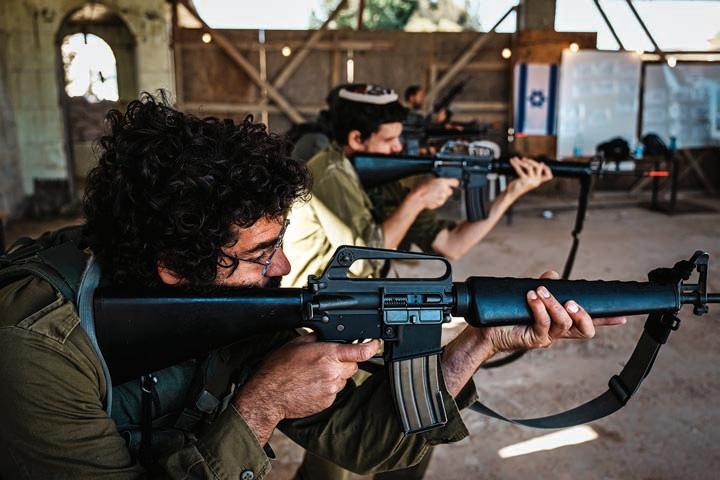
Reservist soldiers, settlement residents, local and some volunteers from Israel and the U.S. take part in a close quarter combat weapons training in an empty building in Mitzpe Yair, an Israeli settlement that sits close to the town of Susya, in the occupied West Bank, on Nov. 9, 2023. Armed settlers man checkpoints and often descend on Palestinian lands, destroying hundreds of olive trees and blocking villages in deadly provocations that have led to retaliatory knifings and ambush shootings by Palestinians.
staff dead in a single conflict since the organization was founded. The Committee to Protect Journalists reported that as of Nov. 29, at least 50 Palestinian and 3 Lebanese journalists and media workers had been killed; 3 were reported missing; 11 were reported injured; and 19 had been arrested.
The Euro-Med Human Rights Monitor reports that Israel has dropped more than 25,000 tons of explosives on the Gaza Strip since Oct. 7, equivalent to two nuclear bombs. It is using internationally banned cluster and phosphorus bombs. A Nov. 22 report on Democracy Now described a satellite study of Gaza showing that about half of the construction in northern Gaza had been destroyed. The Biden administration and the U.S. Congress have opposed a ceasefire, preferring to give Israel some latitude, but they did agree to a “humanitarian pause,” during which aid could be delivered and the prisoner exchange could take place.
Even dead Palestinians are not guaranteed safety from Israel’s sadism and desecration. Euro-Med Human Rights Monitor reports this little known barbaric practice, which should be added to the charges for which Israel must be held accountable: “Israel is the only country that systematically
holds the dead bodies of those it kills, and is classified as one of the world’s biggest hubs for the illegal trade of human organs under the pretext of ‘security deterrence’ and in total violation of international charters and agreements.”
When National Security Minister Itamar Ben-Gvir announced on Oct. 10 that his department would be buying 10,000 rifles and distributing them to settlers, no one needed to be told who they would be aimed at.
Even before Oct. 7, the year 2023 was the most deadly for West Bank Palestinians since 2005, when the U.N. began recording that data. By early July, Medical Aid for Palestinians was reporting that 153 Palestinians had been killed by Israelis in the first six months of the year, and 242 were killed between Oct. 7 and late November. Jewish settlers have been on a rampage, attacking Palestinians without constraints.
With the prospect of ethnic cleansing bandied about by Israeli ministers, it is no surprise that settlers feel empowered to act on their sociopathic impulses. The pogroms in Huwwara (in February 2023) and three
months later in Turmusayya led to several Palestinian injuries, at least one death, and substantial property damage, and they are by no means the only pogroms of note.
The Israeli military has engaged in combat with militants in Jenin, Nablus, Tubas, and Tulkarm and conducted mass arrests of activists. In 11 neighborhoods in the H2 area of Hebron, an estimated 750 families have been confined to their homes in nearly round-the-clock curfews in retaliation for the Gaza attack. Early morning Israeli raids against West Bank cities are ongoing.
In the Jenin refugee camp, more than 20 Palestinians have been killed by Israel between Oct. 7 and Nov. 14, and battles between militants and the army continue. Israeli attacks have rendered four out of six hospitals in Jenin inoperable.
To learn more about the conditions in the West Bank in recent months, the Washington Report spoke to Jamal Juma’, coordinator of Stop the Wall, the Palestinian grassroots anti-apartheid campaign, in late October. In his view, the current situation in historic Palestine is the most dangerous phase facing Palestinians in a long time.
Juma’ believes that Israel’s strategy seems to be to make life so unbearable that people will choose to leave. Member of Knesset Bezalel Smotrich outlined what he viewed as the choices available to Palestinians in 2017: Suffer under apartheid, leave, or be killed. He is now fi-
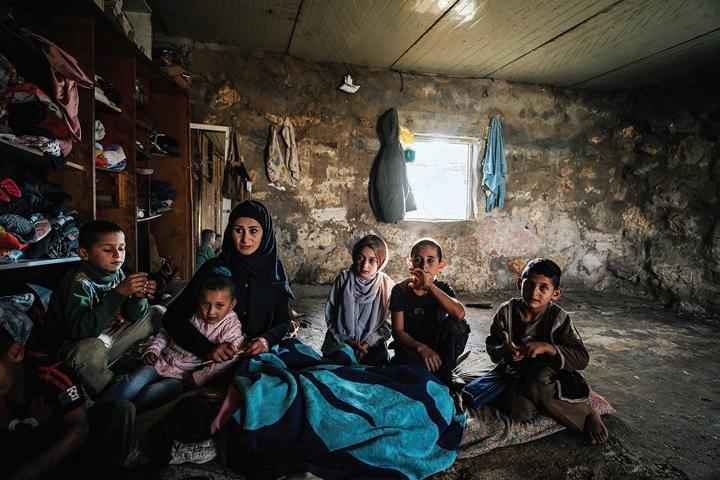
Iman Jabarin, 28, stays at home with all her children, on close watch for Israeli settlers who have broken into their home to threaten their family in the past week, in Shaeb Al‐Botum, occupied West Bank, on Nov. 15, 2023. Nearly 1,000 Palestinians have fled West Bank villages and small communities in recent weeks after settlers demolished and burned homes, destroyed olive trees, blocked roads and cut off electricity and water.
nance minister and a member of the defense ministry.
Stop the Wall is working with communities in Area C, which makes up 60 percent of the West Bank and is under Israeli military and administrative control. The campaign has been rehabilitating caves and working on environmental challenges in places like Burin. It is trying to rehabilitate water springs and encourage agriculture as a way of maintaining a Palestinian presence.
Juma’ describes the campaign’s work in Masafer Yatta, a collection of 19 hamlets in the Hebron governorate. The campaign has worked to refurbish caves for Bedouin communities that are under ongoing threat of displacement. Juma’ describes how
Before the electricity to Gaza was cut, Gazans were active on social media, telling the world what was happening to them and writing what they knew could be their last messages. A sample of their postings is included here.
From a TikTok user: After 30 days, we discover that the whole world is occupied territory, except for Gaza.
In a video clip, a father and son in a hospital are stretched out on adjacent gurneys; the son’s head is wrapped. To comfort his distraught father, he keeps repeating: Khalas, baba, don’t worry. Really I’m fine.
roaming Jewish settlers work as a team to remove the Bedouin from the area: some of the settlers do the demolition work while their cohorts point their guns at the home occupants, preventing them from intervening. Residents have little recourse. At least 111 Palestinian households in 15 Bedouin herding communities, comprising 905 people, including 356 children, have been displaced between Oct. 7 and Nov. 7 by settler violence and access restrictions, according to the U.N. monitoring group OCHA. Another 120 Palestinians, including 55 children, have been displaced following demolitions in Area C and East Jerusalem, due to lack of permits, and another 27, including 13 children, following punitive demolitions.
From an Instagram message posted by a friend of Besan Helase, a 19-year-old medical student:
Besan was exceptional in all fields. She knew English well, she had a high school average of 98.7 percent, she enrolled in general medicine studies. She had a deep passion for endocrinology and hated “molecular biology”...
Most importantly, she loved the sea in Gaza very much.
I loved her conversations and the quotes she chose from novels. She was gentle and close to the heart.
She dreamed of having a small house in a quiet place, surrounded by nature and trees, waking up early every day, drinking tea, baking a cake, watering flowers and looking at the starry skies at night.
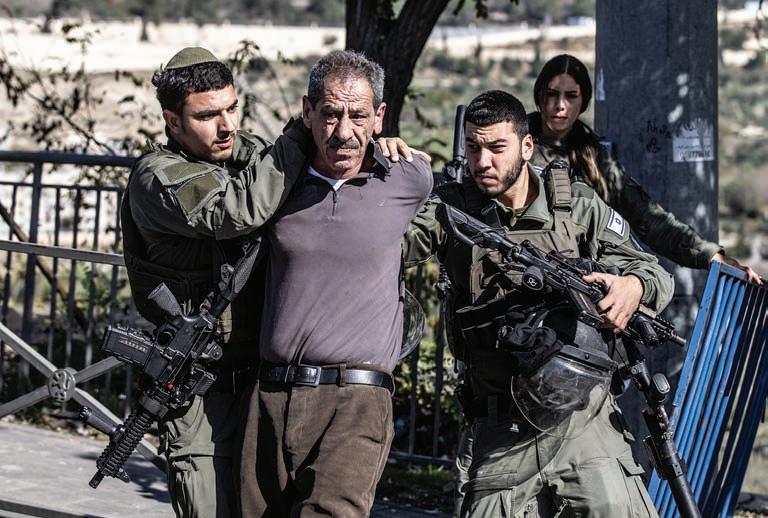
Land confiscations are ongoing, as are attacks on Shu‘fat, Dheisheh, Aida, Nour Shams and Aqbat Jaber camps.
When asked whether he wants to see more international volunteers, Juma’ replied that he’d like to see solidarity committees ratcheting up their efforts and going on the offensive.
With the most rabid settlers now in the Israeli cabinet, settlers are the state’s stormtroopers. Whether working in gangs or with police escorts, they wreak terror and destruction wherever they go. “In each town, we need self-protection. If the current situation continues, we will have massacres in villages. We need a national decision and we need to rely on ourselves. We can’t possibly withstand a massacre every few years.”
More than 6,000 political prisoners are currently held in Israeli jails; more than 1,000 of them were swept up in mass retaliatory raids after Oct. 7, and at least two have been killed in prison during that time. When Israel began bombing Gaza in October, the detainees included 18 children in administrative detention and 160 “security” detainees, according to the Defense for Children International-Palestine; the number has undoubtedly risen because Israel conducted mass arrests throughout the West Bank in anticipation of the prisoner exchange.
The plight of Palestinian prisoners in Israeli jails is one that touches almost every family directly. Because Israel gives itself
[Besan and her family were forced to leave their home to a place they believed to be safer. She was killed, along with her mother, brother, Omar, and elder sister, Marah.]
From an unnamed young woman’s post on Instagram, fighting back tears as she spoke into the camera with this message, possibly one of her last messages before she was killed: If I die [under rubble, dismembered], I beg you not to leave me. Don’t put me in a bag and write on it, “body parts of ___. I didn’t want to die this way. Life in Gaza has been one of hardship. Why should death be as bad as this? I don’t know, I had hopes that the future would be better.
the right to arrest and detain Palestinians indefinitely without trial or conviction, a huge percentage of the population has experienced detention since 1967. Because Israel does not respect international law and its courts typically endorse Israeli lawlessness framed as “security measures,” the incarcerated (and their families) have no recourse.
The slow pace with which Israel entered into negotiations for a prisoner exchange, and its carpet bombing of a territory in which its own prisoners are surely being held, suggests that securing their release has no bearing at all on its war plans.
Israeli state incitement against Palestinians is pervasive. About one month into Israel’s bombardment of Gaza, BADIL Resource Center for Palestinian Residency and Refugee Rights released some sobering statistics that demonstrate the precarious status of Palestinian citizens of Israel. Dozens have been detained and arrested, some while participating in protest actions and others as “precautionary arrests,” a peculiar category not found in countries that claim to be democracies. Dozens have lost their jobs because they identify as Palestinians or wrote social media posts sympathetic to Gaza. (Israelis are not immune; a Nov. 22 Democracy Now segment featured an Israeli history teacher who lost his job for old social media posts expressing sympathy with Gaza.) More
Caption on a photo circulating on Facebook: Gaza women who were orphaned as children insist on carrying their dead brother’s stretcher: “No! We will carry him! He raised us!”
From a farewell letter that the Gaza City Council sent to their colleagues in Barcelona, a snippet of which circulated on Facebook:
We don’t know if we’ll be able to keep in contact from now on. So please, tell the following generations about us if we don’t exist anymore. Tell them about how beautiful and charming the Palestinian people were and how committed they were to their land and cause.
It’s been a pleasure working with you these last few years. May God let us rest in peace. ■
than 40 Palestinian university students have been expelled or investigated “for not opposing the Palestinian resistance.”
In the last few weeks, the website Jerusalemstory.com has published accounts of Jerusalemites who are afraid to leave home because of the heavy police presence on horseback and armed settlers in the streets. Residents can be stopped in the street and asked to display their social media, and even a “like” of an article deemed unfavorable to the state can place a person in hot water. At least since October, people have found it more difficult to enter the Old City unless their ID card lists it as their place of residence. Jerusalem is becoming increasingly less accessible to Palestinian Muslims and Christians, which means the al-Aqsa Mosque compound is less protected from hostile Jewish settlers.
Both the ongoing struggle and the global response to it have a different feel than in previous violent episodes in the country.
Some, like Khaled Barakat of Masar Badil (the Palestinian alternative revolutionary path movement), are calling Oct. 7 the launch of the new Palestinian revolution. Poet and political scientist Tamim Barghouti calls the al-Aqsa Flood the beginning of the liberation of all of Palestine. Both the ongoing struggle and the global response to it certainly feel qualitatively different from any phase that has preceded it.
In the last several weeks, hundreds of thousands of people have taken to the streets repeatedly in cities around the world to protest Israel’s ravaging of the Gaza Strip and its deliberate targeting of noncombatants and civilian infrastructure. People everywhere understand that Palestinians are waging a heroic struggle to remain on their land, to assert their national will and to rid themselves of Israel’s colonial grip on them. For Palestinians the stakes are enormous.
But beyond honoring the struggle for Palestine, people around the globe understand the interrelatedness of the popular struggles that are being waged. They see Palestinians resisting an arrogant state that
is bent on destroying them as a nation. When Israel demonstrates in real time the ease with which it kills an indigenous population, people know that other oppressive governments will be emboldened by this precedent to dispose of their own unwanted population in a similar savage manner unless some meaningful way is found to stop the genocide.
Palestine exposes the disconnect between governments and the people they are supposed to represent who are taking to the streets in unprecedented numbers and the failure of international institutions that cannot act meaningfully to stop violations of international law because they are controlled by neoliberal political interests. The failure of international institutions to bring genocide to a halt has consequences for everyone on the planet.
Whether this is Israel’s final step in a process started in 1948 or the beginning of Palestinians’ war of liberation from Israeli colonialism, this chapter is being written in the blood of the people of Gaza and especially its children. ■

$20 plants 3 olive trees or 6 almond trees.
Last year friends of Palestinian farmers gifted 49,000 olive and almond saplings to over 350 farmers. Farmers who have lost land due to the occupation, young farmers, and women farmers are given priority in Trees for Life.
The Land of Canaan Foundation 2702 International Lane • Suite 111 • Madison, WI 53704 www.landofcanaanfoundation.org
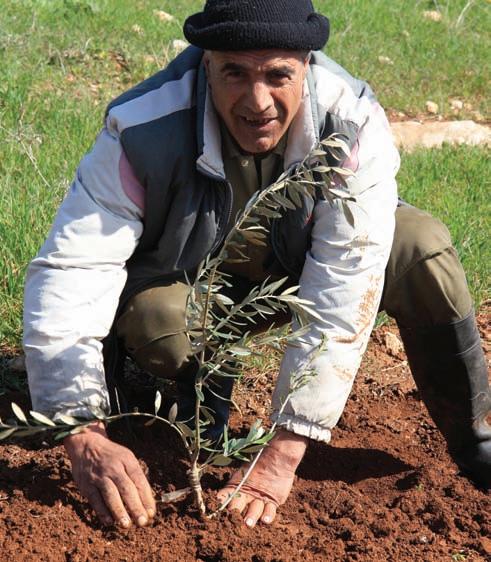
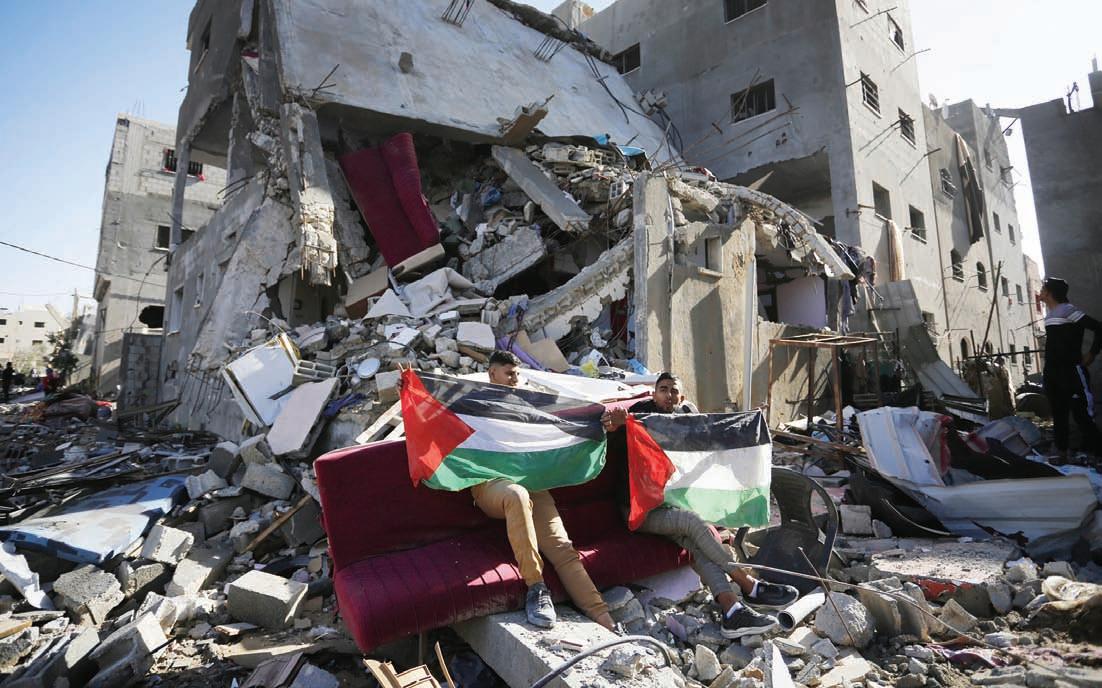
During the humanitarian pause, in Khan Yunis, Gaza on Nov. 24, 2023, displaced Palestinians hold onto their flag as they collect what‐ever items remain intact in the rubble of their homes destroyed in Israeli attacks. All Palestinians, regardless of their ideological back‐ground, show sumud or steadfastness.
By Ramzy Baroud
SHORTLY AFTER THE START of a seven-day ceasefire in the war on Gaza, Prime Minister Pedro Sanchez of Spain and
Dr. Ramzy Baroud is a journalist, author and the editor of The Palestine Chronicle. He is the author of six books. His latest book, co‐edited with Ilan Pappé, is Our Vision for Liberation: Engaged Palestinian Leaders and Intellectuals Speak Out, available from Middle East Books and More. Baroud is a Non ‐ resident Senior Research Fellow at the Center for Islam and Global Affairs (CIGA). His website is www.ramzybaroud.net.
Prime Minister Alexander De Croo of Belgium appeared in a joint press conference at the Rafah Crossing.
While Sanchez described “what is happening [as] a disaster,” De Croo called for a “permanent cessation of hostilities” and for an end to the killing of children.
Equally significant, the two European leaders declared that “we may decide to recognize the State of Palestine, if the European Union does not.”
Coupled with the strong position of Ireland, some in Europe seem to be waking up to the fact that the Israeli occupation is the primary cause of the recent Gaza “hostilities.”
Israel was not pleased by the evolving European position. It immediately summoned the ambassadors of both countries and sharply “rebuked” them. This exaggerated response shows that Israel is not willing to give Europe even the narrowest of margins—as in condemning the killing of children or
expecting some kind of a peaceful settlement centered around Palestinian sovereignty.
Spain and Belgium’s statement that “we may decide” to recognize Palestine even without EU consensus is indicative of an actual foreign policy schism within Europe itself. It suggests that not all EU governments have the same tolerance for genocide in Gaza as, for example, Germany and Britain.
Other EU officials, too, are calling for a Palestinian state, though their intention is neither to ensure Palestinian freedom nor to safeguard Palestinian rights.
Chief EU diplomat Josep Borrell, for example, argued on Nov. 20 that “the creation of a Palestinian state would be the best way of ensuring Israel’s security.”
Even the former British prime minister, now Secretary of State for Foreign Affairs, used similar logic. David Cameron said that Israel will not have security unless it guarantees “longterm safety, security and stability” for the Palestinian people.
Regardless of the reasoning behind the growing emphasis on a “solution” and rights for the Palestinians, this language was almost entirely absent from the Western political discourse prior to Oct. 7.
The truth is that Palestinians have succeeded, through their resistance and sumud, to reassert Palestine on the global agenda. But how did Palestinians succeed in doing so, despite the utter marginalization of their cause before the war?
First, unlike previous wars, especially those that preceded the Unity Intifada of May 2021, this time around Palestinians spoke in unison.
Without rehearsing or even coordinating, it felt as if the Palestinian message flew seamlessly, when all Palestinians, regardless of their ideological backgrounds, placed the focus on the Israeli atrocities, without falling into the trap of the typical factional blame game.
Second, the factional Palestinian suddenly disappeared. For years, factional narratives, dividing Palestinians into conflicting interest groups, have thwarted the Palestinian people’s attempt to unify behind a single leadership, one that is capable of conveying, representing and defending Palestinian political aspirations.
All Fatah-Hamas talks and agreements have failed, leaving the people with no other alternative but to explore different manifestations of unity that go beyond the interests of politicians.
This unity is now on full display, compelling everyone, including those affiliated with the Palestinian Authority itself, to adhere to the line of the people. While Gazans fought to free prisoners in the West Bank, West Bankers rose, and died in large numbers, in defense of Gaza.
This popular unity must continue, so that it can eventually be harnessed into political unity, which will bring all Palestinian groups together under a single leadership. This is the only way to ensure that the tremendous Palestinian sacrifices and the precious blood that was spilled in Gaza eventually translates into the freedom that all Palestinians covet.
While Gazans fought to free prisoners in the West Bank, West Bankers rose, and died in large numbers, in defense of Gaza.
Even children who have lost members of their families in Gaza stood bravely in front of cameras reiterating that they will never weaken and that nothing would remove them from their homeland. Young and old repeated the same sentiment, used similar language, even from their hospital beds.
This led Israel to do everything in its power to excommunicate the 2.3 million Palestinians in Gaza from the rest of the world and from one another, shutting down the internet, electricity and any form of communications.
Yet somehow a clear, united Palestinian message continued, amplified countless times by an army of social media activists who impressively helped balance out mainstream media bias, eventually overpowering corporate media’s control over the war narrative altogether.
The Palestinians have done this and more, without powerful lobby groups, media consultants or a hasbara machine, like that which unsuccessfully attempted to sway public opinion in favor of Israel.
Third, unity beyond Palestine also proved critical.
Arabs and Muslims have served as the core of Palestinian solidarity throughout Israel’s war on Gaza. They protested, boycotted, fought and mobilized. Tens of millions of people beyond the confines of the Arab and Muslim worlds also marched around Palestinian rights and priorities.
Indeed, whole new conversations on Palestine are now occupying many public spheres around the globe. The Global South is once more embracing the struggle for Palestine, while the Global North is challenging governments, big corporations and mainstream media for justifying, supporting and financing the Israeli genocide.
The Palestinian people now have to lead and direct this momentum of solidarity so that it may serve their righteous objectives, those of equality, justice and freedom—all enshrined in international law.
No public space should be left without engagement, no audience should be overlooked or neglected and no stone should be left unturned in the search of that critical mass needed to hold Israel accountable for its crimes.
Western leaders and officials are speaking out now because they understand that the Palestinian cause has become a global one and that the prolonging of Israeli occupation and apartheid will not bode well for Tel Aviv or for the collective West.
It is time for Palestinians to utilize this significant moment. It is time for them to lead the process of their own liberation. In fact, in Gaza, Jenin and elsewhere, this process has already begun.
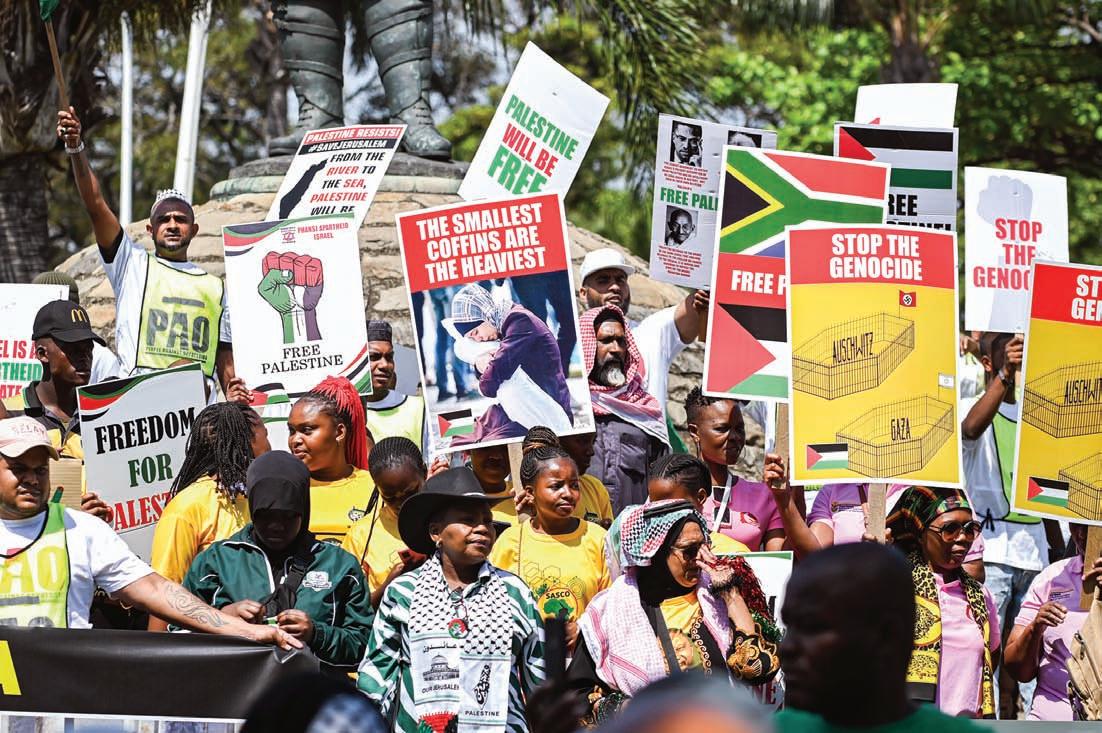
Supporters during the African National Congress (ANC) Palestinian Solidarity March to the U.S. Embassy in Durban on Oct. 26, 2023 in South Africa. The ANC and its alliance partners are standing in solidarity with the Palestinian resistance against Israel and over the war in the Gaza Strip.
By Suren Pillay
WRITING ON OCT. 27, the Associated Press’ Josef Federman shared some stark observations: “Just three weeks into the deadliest war between Israel and Hamas, it already is clear that the bloodshed has flipped long-standing assumptions in Israel and the region upside down. Israel’s military and intelligence services were exposed as incompetent and ill-prepared…Israelis’ sense of personal security was shattered.”
For months if not years, members of Hamas had covertly plotted their breakout from Gaza, long referred to as Israel’s open-air prison for Palestinians.
Even if many older paradigms have collapsed, as some observers have pointed out, Israel has turned with a vengeance to a familiar one: overwhelming brutal violence.
The death toll statistics coming out of Gaza now are unprecedented. The Israeli army’s relentless bombing has slain
Suren Pillay is the A C Jordan Chair in African Studies and director of the Center for African Studies at the University of Cape Town, South Africa. Published on Nov. 16 in Al Jazeera.
more than 16,000 people, including more than 6,150 children; thousands are also missing, buried under the rubble and likely dead as well.
The number of children killed in Gaza has surpassed the annual number of children killed in conflict globally; the number of civilians killed in Gaza has now exceeded the total death toll in Ukraine since February 2022.
These numbers are climbing every day, as the Israeli military continues to indiscriminately bomb civilian buildings, including hospitals and schools.
As a Black South African, watching these horrific events unfold, I cannot but reflect on my country’s own violent past.
I recall the relentless planning and violence that accompanied the last decades of white South Africa’s attempts to make apartheid work. I remember the fears that grew among white South Africans as they put their trust in a sophisticated military capability, a conscription army, a nuclear weapons capacity and steadfast friends in the West, particularly the United States, Britain and France.
It was the height of the Cold War and South Africa claimed to be the only democracy in Southern Africa, protecting “civilization” from the encroaching threats surrounding it.
Its military might and expansive police force were accompanied by a series of policies designed to maintain white minority rule.
Each attempt to impose new policies to further that aim failed in the face of mass resistance. The more they failed, the more brutal the violence meted out by the military and the police with the encouragement of white politicians and a terrified white electorate.
The “terrorists,” as the national liberation movements were referred to, could not be crushed by the mightiest army in Southern Africa. By mid-1985 a significant section of the white electorate and some in the ruling party realized that the problem of Black resistance was not going to go away. Something more drastic was going to be required.
The president at the time was the hawkish P. W. Botha, himself a former defense minister, and he was encouraged by a faction of his party to open parliament that year with a conciliatory speech, to make a grand policy statement that would offer the Black majority a hopeful sign that they would become part of the whites-only democracy that was South Africa. It was called the “crossing of the Rubicon speech.”
Botha played along but at the last minute balked and defiantly went in the opposite direction, instead giving a speech in which he vowed to intensify the fight against “terrorism,” refusing to negotiate with “terrorists” in prison, like Nelson Mandela.
What followed was the extension of the state of emergency in South Africa and the killing of thousands of people resisting apartheid rule, as Botha and his faction turned to more and more violence and repression.
Eventually, his own party leaders staged a palace coup and installed F. W. de Klerk in power. The new president and the faction he represented had realized that the end was nigh, that the decades of repression were not succeeding in making a political and economic system work that excluded the majority and only benefitted the white minority.
De Klerk and his faction realized that whites were not going to win the war, even if they had more guns, bombs, tanks and artillery and could probably continue to rule for a long time through sheer force. It was not sustainable because the more repression they deployed, the more resistance they faced and the more white South Africans lived in fear.
The more the violence was flashed across the world’s television screens, the harder it became for white South Africa’s friends in the West to steadfastly support it. It was a tipping point that led to political negotiations, to talking to “the terrorists” who they saw as their existential enemy. It was a tipping point that created the pathway to a single state with equal citizenship for all, based on residency, not origins, race, religion or ethnicity.
Until Oct. 7, Israel also had the confidence that its sophisticated military and intelligence capabilities, its design of urban space and use of walls and barriers to police, control and monitor every aspect of Palestinian life, were going to work to manage its “Palestinian problem” successfully.
Israel’s powerful allies in the West were even facilitating the making of new friends in Africa, the Gulf and South Asia through military cooperation and the sales of arms and intelligence technologies.
Most Israelis and their political leaders were so confident that this management of their “Palestinian problem” was working that any reference to “peace talks” or even rhetorical acknowledgment of a two-state solution to the outside world became unnecessary, moribund and superfluous.
Life could proceed. Rave parties could happen in the desert. The normality that had become normal continued in the abnormality of occupation. Until October 7.
Ordinary Israelis may begin to realize that no matter how sophisticated or strong the Israeli army, Mossad, or the apartheid regime appear, the “Palestinian problem” is not going to go away as long as the Palestinians are alive.
Just as with white South Africans, fear grows exponentially. And Israel is responding to that fear with a colossal bombing campaign of annihilation. But as white South Africans learned, violence cannot eradicate the “problem” or create the life of peace they might long for.
At this point, several questions arise. How far does the notion “the ends can justify the means” extend to make the scale of the killings of civilians acceptable to those who support Israel’s right to defend itself? How far will Israelis go before they realize they cannot live with the blood of thousands of children on their hands?
Can Israelis and the friends of Israel justify to themselves these actions as expressions of a civilization that claims to value human life in an equal manner? Do Israelis want to be remembered as the people who attempted to exterminate men, women and children through an act of collective punishment?
Whatever may be left in the ruins and rubble that awaits us after this war on Gaza, Israel’s “Palestinian problem” will not have gone away. Ordinary Israelis will surely never sleep again with the confidence that their state can fully protect them.
They will do well to learn from white South Africans who, after 300 years of minority rule, realized it was an impossible political project to continue to defend so violently and still maintain any semblance of a moral high ground.
There is a tipping point when even for the defenders of such a project, the faint question rings louder and louder in the collective conscience: how far is too far?
There can be no going back to the promises of security based on what was before. There can be no going forward in peace if it means more and more blood of children and civilians haunting successive generations who will have to take responsibility for the actions unfolding before our eyes today.
As a South African who has lived to cross the Rubicon, I hope this catastrophe will force Israelis to see that only a just and inclusive political solution based on equal citizenship for all is going to bring them freedom from fear.
By John Gee
THE STRONGEST REACTION in South-East Asia against Israel’s assault on Gaza came, predictably, from its Muslim-majority states—Indonesia, Malaysia and Brunei Darussalam,
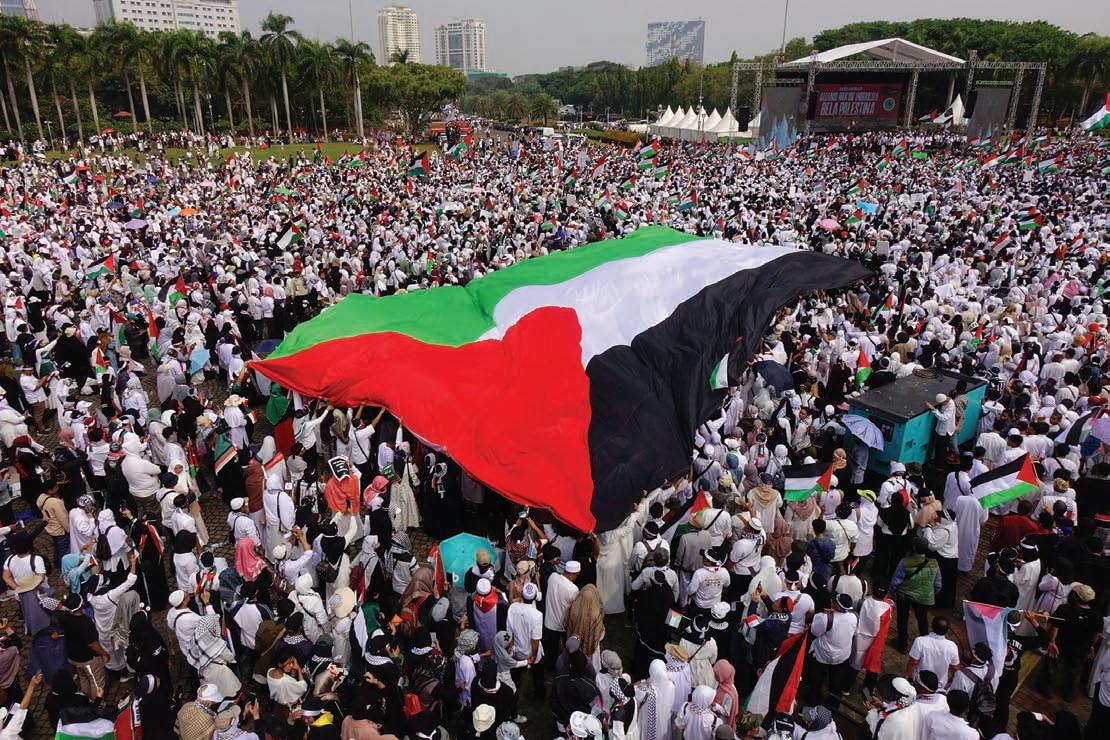
but as Palestinian civilian casualties mounted, there was broad support for calls for an immediate ceasefire. When the United Nations General Assembly voted on the Jordanian ceasefire resolution on Oct. 26, Brunei, Indonesia, Laos, Malaysia, Singapore, Thailand, Timor-Leste and Vietnam voted in favor; Philippines abstained and Cambodia was absent.
Huge anti-war, pro-Palestinian rallies were held in Malaysia’s capital, Kuala Lumpur. Prime Minister Anwar Ibrahim spoke at a “Malaysia Stands with Palestine” rally on Oct. 24, attended by 20,000 people.
Amid calls for the boycott of companies that supported Israel, the local franchise of McDonald’s issued a statement dissociating itself from McDonald’s Israel, which (along with Burger King Israel) had boasted of the free meals they’d provided to the Israeli army.
Indonesia’s president, Joko Widodo, called for a ceasefire as soon as the war started and reiterated his country’s support for the Palestinian people. Meeting President Joe Biden in the Oval Office on Nov. 14, he took the opportunity to press the United States to change its stand, saying “Indonesia appeals to the U.S. to do more to stop the atrocities in Gaza…A
John Gee is a free ‐ lance journalist based in Singapore and the author of Unequal Conflict: The Palestinians and Israel.
ceasefire is a must for the sake of humanity.”
The biggest protest in Indonesia took place at the National Monument in Jakarta on Nov. 5. Speakers at the two-millionstrong rally called for a boycott of Israeli goods and an investigation of war crimes by the International Criminal Court. The rally was called by the Indonesian Ulema Council, the highest Muslim body in the country, with support from organizations representing other faith communities, including Christians, as well as from the Indonesian government.
Indonesians are well aware that one of the medical institutions shut down by the Israeli attack on Gaza was the Indonesian Hospital in Beit Lahiya, built with donations from the Indonesian public and NGOs, and inaugurated in January 2016.
Worries over the fate of their own nationals in Palestine loomed large in Thailand and the Philippines. Each had around 30,000 citizens working in Israel at the beginning of October, mostly in jobs that Israelis don’t want to do, including agricultural and construction work. Thirty-nine Thai workers were killed during the Hamas attack on Oct. 7 and 32 more were reportedly abducted to the Gaza Strip. Four Filipinos were killed, and 137 Filipinos, mostly with Palestinian spouses, were believed to have been in the Gaza Strip at the beginning of October. Large pro-Palestinian rallies have taken place in both Bangkok and the Philippines, including one called in Manila to protest against the Philippines’ abstention in the U.N. vote
on an immediate ceasefire.
Singapore’s response was largely determined by concerns over potential repercussions on its own society. The Malay Muslim minority has always been pro-Palestinian, but there are segments of Sing apore’s population that are pro-Israel, including a number of Evangelical Christian churches. Media coverage was cautious, but there was no concealing the suffering of the people of Gaza caused by Israeli actions, which tended to move public sympathy toward the Palestinians. Political leaders were at pains to stress that the conflict between Israel and the Palestinians is not a religious conflict, but a national one. A six-hour parliamentary debate on Nov. 6 ended with a unanimous condemnation of violence against innocent civilians.
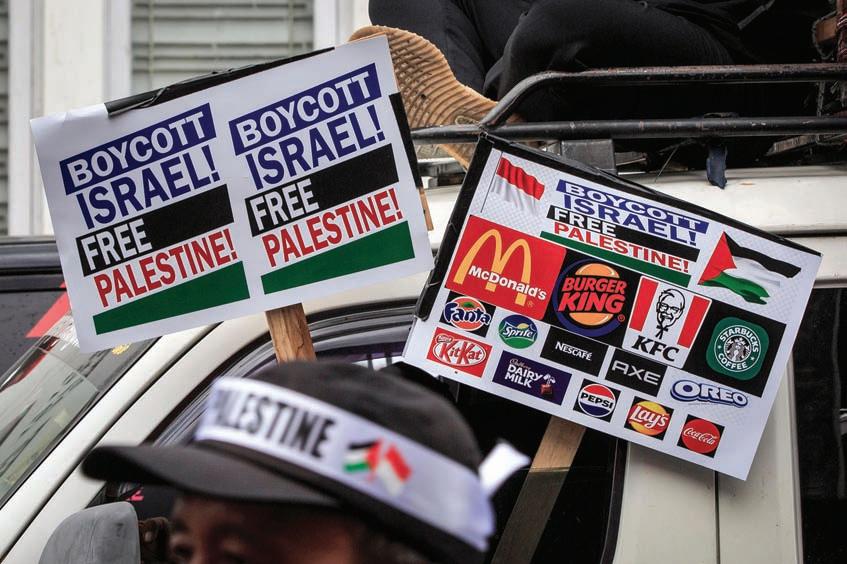
Demonstrators carry placards calling for the boycott of pro ‐ Israel products and companies during a protest to show their solidarity with the Palestinian people in Yogyakarta, on the Indonesian island of Java, on Nov. 11, 2023. Many Arab and Muslim consumers around the world are boycotting U.S. brands and fast food chains.
By Jack McGrath
ON NOV. 16, the fifth annual conference of the Gulf International Forum (GIF) convened at the National Press Club in Washington, DC. The event was held amid the deadliest period of the Israeli-Palestinian conflict in recent history, and the crisis took center stage from the outset.
In her opening remarks, GIF’s executive director Dania Thafer delivered a trenchant critique of the Biden administration’s Middle East policy, based on the 2022 U.S. National Security Strategy. The document lists U.S. priorities in the region as “counter[ing] Iran’s destabilizing activities” and “countering terrorist threats” to “support de-escalation and integration.” Thafer contended that “these objectives are distant from reality” because Washington’s actions (such as facilitating the Abraham Accords between a handful of Arab states and Israel) amount to “surface-level de-escalation, prioritizing optics over durable solutions and overlooking grievances in the region.”
Contrasting U.S. goals to outcomes, she observed, “With each photo out of Gaza, Iran [which ardently supports Pales-
Jack McGrath is a Marcellus Policy Fellow at the John Quincy Adams Society. He holds a bachelor of arts in political science with a history minor from George Washington University. He is also the assistant director of Middle East Books and More.
tinian resistance] gains more influence across the region.” At the same time, the Gulf Cooperation Council (GCC) views the involvement of Yemen’s Houthi group in the Israel conflict as a message that “Iranian proxies can target us and our allies,” she said. (Saudi Arabia launched a devastating war against the Iran-aligned Houthis in 2015. A ceasefire was reached in April 2022 and has since remained in place, despite formally expiring in Oct. 2022.) According to Thafer, “The U.S. failure to work for a two-state solution has harmed Israelis, Palestinians and U.S. interests and brought the threat to the Gulf. Tensions mean that a small spark could set the region ablaze.”
At the same time, the war has in some ways facilitated closer Arab-Iranian ties. Most notably, Saudi Arabia invited Iranian President Ebrahim Raisi to Riyadh in November to participate in an emergency summit about Gaza, the first such visit of an Iranian president in more than 15 years. There are also reports that Riyadh has offered Tehran greater economic investments if it prevents its proxies from turning the Israel-Gaza war into a regional conflict. Observers view such developments as fruits of the March 2023 agreement—brokered by China—to restore diplomatic relations between Saudi Arabia and Iran.
Kristian Coates Ulrichsen, Middle East fellow at the Baker Institute, agreed that Palestine cannot be placed on the sidelines of the region’s concerns. “There is no going back to the pre-October status quo,” he said. “There is no more bumbling along and hoping Gaza goes away; this is not sustainable and never was.” Ulrichsen claimed that the significant difference in this conflict compared to prior Israeli wars is that the GCC states are now “some of the most influential diplomatic, economic and political actors in the region,” capable of playing a prominent role.
“This is the first time there could be serious potential for the GCC to be in the driver's seat,” concurred Paul Salem, director
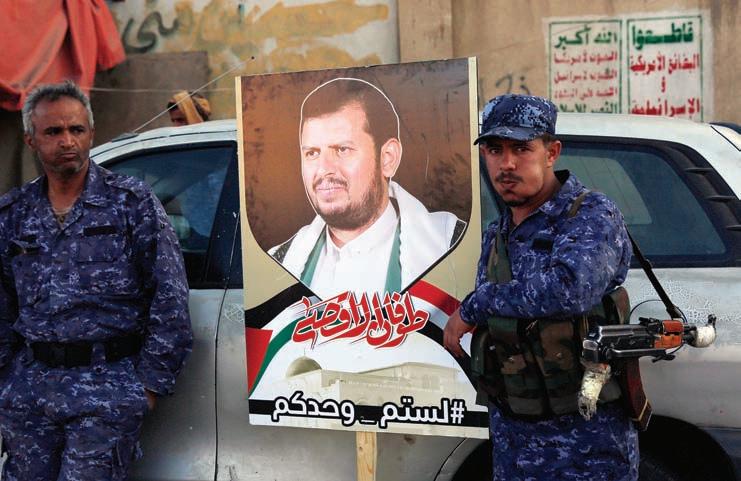
of the Middle East Institute. “Arab states initially believed the U.S. could solve it, but the U.S. refuses to influence Israel. This conflict needs a political resolution, and nothing other than a two-state solution is viable,” he said.
However, GCC governments have little appetite for playing hardball with Israel, as they have in the past, explained Abdulaziz Sager, chairman of the Gulf Research Center. “Arab countries are not interested in an oil embargo or boycotts. They don’t have strong military capabilities or a wish to get involved.”
Meanwhile, the staggering death toll wrought by the Israeli onslaught has provoked a public uproar across the Middle East. “Grief and anger have reached unprecedented levels,” Thafer reported. Roxane Farmanfarmaian, professor of international studies at Cambridge University, said that “the degree of popular outrage is misunderstood” in Washington. “The postcolonial moment in the Arab world is as strong as the Arab Spring, but this time not directed against Arab leadership, but directed against the West,” she said.
Abdullah Baabood, an Omani academic currently serving as Qatar’s chair of Islamic Area Studies, noted that Kuwait, Qatar and Oman have seen largedemonstrations in solidarity with Palestine, while public expressions of anger have been limited in Saudi Arabia. In Bahrain and the UAE, both signatories to the Abraham Accords, “The public doesn’t want to embarrass their governments, and public opinion is highly controlled, so it is difficult to tell” exactly what people are thinking, he said. However, reports indicate that the Bahraini government has violently cracked down on those taking to the streets in support of Gaza, even as the
country has recalled its ambassador to Israel.
In contrast, there has been “very strong condemnation of Israel from Iran and Turkey, embarrassing some Arab countries that are not using the same language,” Baabood noted. “My worry is that this conflict is leading to the empowerment of Turkey and Iran among the Arab public,” which sees the non-Arab powers “supporting Palestine strongly while some Arab ones are not doing as much as they should.”
Iran’s leading role in the “Axis of Resistance” has bolstered the Islamic Republic’s regional reputation, but Tehran has distanced itself from the war to avoid escalation, Baabood said. “The Hezbollah conflict is within ‘acceptable’ conduct, Houthi missiles are low range and Iraq and Syria [militia proxy] attacks on the U.S. are sending the message that further war atrocities could lead to a larger conflict, which the region doesn’t want,” he added.
The Hamas attack on Oct. 7 was an attempt to sabotage the Abraham Accords, posited Jonathan Lord, director of the Middle East Security Program at the Center for a New American Security. Over the past year, Israel strengthened economic ties with Bahrain and the UAE while U.S.-brokered Saudi-Israel normalization talks “advanced rapidly and publicly,” he noted. Lord predicted that “once the conflict subsides, normalization with Saudi will resume” because the Biden administration’s unquestioned military support for Israel “represents what Saudi wants for itself,” bolstering the deal’s credibility.
Omar H. Rahman, a fellow at the Middle East Council on Global Affairs, purported that the Accords were driven purely by the national interests of participating Gulf states. “Nothing whatsoever has been done in the past three years to advance Palestinian interests, which would have required effort and political will that they weren’t willing to muster,” he said. ■
(Advertisement)







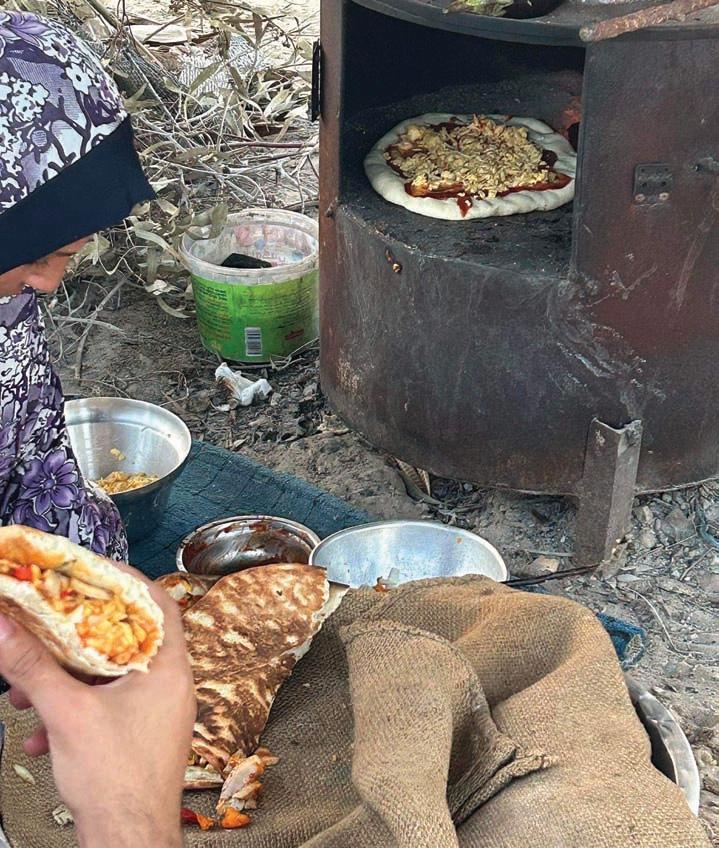
Mo‘tasem’s mother (far left) uses flour distributed by UNRWA and whatever ingredients are available to cook meals for her family.
“OF COURSE the [humanitarian] pause was helpful to us, but it is not enough. It was shocking and terribly sad seeing our neighborhood completely damaged. Our house was also severely affected, but it is thankfully still standing and recognizable. What we truly, urgently need is a permanent ceasefire,” says 21-year-old Mo‘tasem Abu Armanah.
Before the attack, Mo‘tasem lived with his seven brothers and parents in Al-Bureij camp, which is very close to the eastern border with Israel. The Washington Report caught up with him to
Shahd Safi is a Gaza‐based Arabic/English translator and teacher, freelance journalist, social media coordinator, human rights advocate, as well as a writer for We Are Not Numbers (WANN).
By Shahd Safi
learn how he and his family were faring during the genocide.
On Oct. 7, the first day of the attack, Mo’tasem’s mother had a gut feeling that her family needed to evacuate. The Israeli occupation media had announced a state of war, and being close to the border was terrifying—she could hear Israeli bombs beginning to fall over Gaza.
“We know Israel very well, having been under attack five separate times over the course of our lives. Now, since Hamas challenged some parts of the siege, Israel will knock down the Strip. This time will be worse than the previous attacks. We have to evacuate immediately,” Mo‘tasem’s mother said.
On Oct. 18, the family fled to their relatives’ house in the western part of Al-Bureij. Mo‘tasem’s mother was right to be apprehensive. That same day, the family received news that their neighborhood, the eastern part of Al-Bureij camp, had been totally destroyed.
A few days later, they decided to leave AlBureij camp altogether. They headed to Khan Yunis, to another relative’s house. While they knew it wasn’t safe, they at least knew it was farther from the border with Israel. They also sought out family, solidarity and company in such hard times.
“We’re 100 percent certain there is no such thing as a safe place in Gaza. We know that any person and any house are targets. We know when Israel launches any attacks on us, it doesn’t only target freedom fighters—it targets everyone, including children and civilians. This has been Israel’s strategy ever since it came into existence and colonized our land. It’s only our deep need to survive that leads us to evacuate,” says Mo‘tasem.
In Khan Yunis, they found little comfort. They struggled with food and water alongside the other families who had evacuated; the large number of people living in their relative’s house made the situation unbearable. They opted to rent a house, even though they didn’t have enough money.
“My father got fed up with the situation. We were more than
100 people in a small apartment, and nobody was comfortable. We, the men, had to sleep outside in the cold so the women could sleep with the small amount of comfort they could find at night. We are seven boys, which means except for my mother, the whole family slept outside, and now winter is approaching. We had to rent a house for our health and comfort,” says Mo‘tasem.
The prices in Gaza since the attack have doubled and tripled. Some say they’re higher than in Paris, Washington and other cosmopolitan cities. One packet of baking powder costs almost five times as much as it did before the attack, and the prices of cucumbers, citruses and canned food, the only available products, increase every day. The price of water rose too after Israel cut off Gaza’s water supply.
UNRWA recently managed to distribute one bag of flour per 6-to-7 people, but nobody knows if it will continue to do so.
“We now sometimes have to drink nonpotable water [only suitable for bathing or washing dishes or clothes]. When Israel cut off water to Gaza some mosques and UNRWA schools began to distribute nonpotable water when they could obtain it. At the moment my brothers have to search for a water vehicle or a mosque that is lucky enough to have some. Whenever we manage to purchase or acquire drinkable water we feel truly grateful. We used to eat canned food with spoons before UNRWA distributed flour,” Mo’tasem added.
Most families in Gaza can barely find food. They can barely cook—gas has become a luxury.
“We registered as displaced persons at Al-Hinnawi, a nearby school, but they provide one meal each every three days. They claim the aid is not enough. These schools can barely provide a roof over our heads.”
Israel cut off not only food and water but electricity as well. Some schools have solar panels while others depend on generators that rely on scarce fuel and can only run for 4 to 6 hours. When there is electricity at the school, Mo’tasem and his siblings rush to charge their phones. This allows Mo’tasem to go online using an eSIM card, which is how the Washington Report was able to communicate with him after Israel bombed the telecommunications facilities in Gaza.
The rent prices have increased exponentially in southern cities like Khan Yunis and Rafah. Israel claimed the south is safer than the north and forcibly displaced a huge number of people, especially after conducting military operations in the north.
Mo’tasem’s father promised the new landlord that when the genocide ends, he will pay the rent, no matter how much it costs. (He didn’t want to know the amount.) He works for the PLO, and his wife is a housewife. When the Israeli attacks started, Israel forced the PLO not to give its employees in Gaza their salaries,
(Advertisement)
and so he wasn’t paid for October and November. During the temporary truce, the PLO employees were given half their October salary, but it wasn’t nearly enough. His salary wasn’t sufficient even before the attack, and now, the prices are unreasonably high and the employees aren’t being paid.
“There was no furniture in the house we rented. On the first day of the truce, we went home. We had to pay a driver 200 shekels ($53) to take us home, as the price of fuel had increased due to the shortage of gas.” They used to pay 20 shekels ($5). “We couldn’t access everything we needed, as all our food had gone rotten over the almost 50 days we were gone. Most of our furniture is damaged. We could bring only four mattresses.”
UNRWA previously gave the family these mattresses, but they aren’t long enough for the taller family members.
“Now we have to sleep in turn, some of us during the day and others at night, as we only have four mattresses for nine people. I can’t complain—none of my brothers can. We’re trying to be as patient as possible. We’re under huge pressure in terrifying circumstances.”
Mo’tasem and his family now have to flee to Rafah, where they have no relatives. Residents of Khan Yunis, where they were staying, were ordered to evacuate to Rafah by Israeli Occupation Forces. That is the last message from Mo’tasem. ■

By Danny Muller
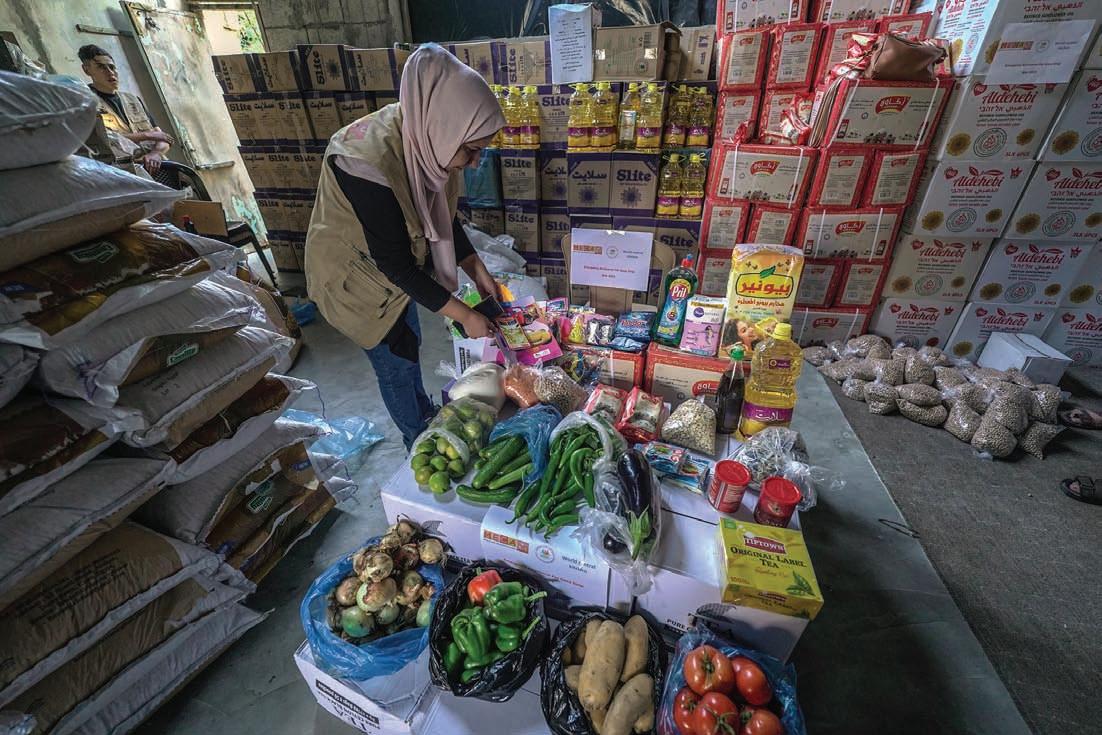
FROM THE BEGINNING of Israeli airstrikes on Gaza until November 27, 2023 more than 16,000 Palestinians have been killed, and countless more are buried beneath the rubble. With over 6,150 children killed, this has been the deadliest attack against children anywhere in the world in the 21st century.
For the 2.3 million people living in Gaza, this is an emergency without end. As many as 1.7 million are internally displaced; hospitals are under bombardment; and food, water, medicine and shelter are in short supply. The U.S.-backed Israeli war against Palestinians rages on in many forms. The ongoing occupation, the blockade of Gaza, illegal settlements and settler violence, and the codified system of apartheid comprise the backdrop to the unrelenting leveling of Gaza.
Originally a MECA partner while he worked against sanctions and war in Iraq, Danny Muller traveled to Palestine with MECA in solidarity during the second intifada. He returned to help direct aid efforts after the attacks on Gaza in 2009, 2012 and 2014.
The humanitarian impact has been catastrophic; and almost no one knows this more than partners and staff of the Middle East Children’s Alliance (MECA), who are on the ground in Gaza. MECA, a U.S.-based non-profit, has been working since 1988 to provide direct aid to children in Palestine including food, medicine and medical supplies. MECA partners with Palestinians and Palestinian organizations who provide direct support to children and families living under occupation. Having spent most of his life living and working in Dheisheh Refugee Camp in the occupied West Bank, Zeiad Abbas Shamrouch, the executive director of MECA, has been in constant contact with staff, friends and MECA partners in Gaza coordinating humanitarian aid from the U.S. office.
Q: What has the Middle East Children’s Alliance been able to do since Oct. 7?
Our focus at MECA is to help the children and families living under military occupation and who are under attack right now. Currently
our emergency relief aid includes food, hygiene supplies, clean water and blankets for displaced families as well as toys, warm clothing for children and plastic sheets to cover broken windows and leaking roofs. We also provide emergency support to hospitals in Gaza to purchase fuel for their generators when it is available so they can keep their doors open despite the lack of electricity.
MECA has been working in Palestine for over 35 years and has an extensive network of local partners. When we provide aid, we always prioritize purchasing from local markets, small businesses and factories so that we also support the local Palestinian economy.
There have been five previous attacks on Gaza, so we have learned and prepared for situations like this with our staff and partners. We respond immediately when these attacks happen, and our partners communicate all the time determining where the need is greatest. So far in the Gaza Strip, since the start of the aggression, we’ve been able to rely on local markets but as the crisis continues, we must find ways to bring aid in by ending the blockade. This collective punishment of 2.3 million people must end immediately; there is only so much that partners on the ground can do under these conditions.
Q: The markets must have limited supplies at this point, no?
This is true; of course, there is a limit, and all the time there are shortages due to the blockade. Finding these supplies inside Gaza has been incredibly challenging; as of today, there are no blankets and winter is coming. And with the level of destruction that has already happened, getting aid into Gaza is a necessity.
Q: Are you working throughout Gaza?
Since the Israeli ground invasion on Oct. 27, we have not been able to work in the north or in Gaza City anymore as our staff and partners have almost all been forced to leave. The remaining partner staff who are still in these areas cannot find supplies and cannot safely move to purchase aid in other areas. It is difficult and sometimes im-
possible to reach partners, due to Israel cutting off electricity, fuel and internet. After more than a week with no contact, we finally heard from the director of one of our partners and he, along with a few volunteers, is organizing to distribute from the little food there is available and buy warm clothes for children.
The challenge for MECA is to reach people in the north, because they need everything; there is no clean water, no food. Diseases of all sorts are spreading. Tens of thousands are suffering from diarrhea, and some suffer from “bleeding diarrhea,” which can be fatal. And as the hospitals are being targeted, medical staff are being injured and killed at alarming rates.
Q: It is hard to imagine anyone going to work while living in Gaza now. What are you hearing from people taking these extraordinary risks?
We are not asking our partners on the ground to take risks. They are taking the initiative on their own to help their communities. At MECA, we often talk about “solidarity, not charity.” To stand in any way that you can with these brave people is an act of solidarity, because they will know that the people of the world stand with them, if not the Western governments that support these war crimes.
A director of one of our partner organizations in Al Shati refugee camp in the north did not evacuate; he stayed to help those who could not leave—the sick, the elderly. The last time I spoke to him he said, “When the bombs fall each time, it is like your heart goes outside of your body. Your body does not know how to return to what it was like before this.” He also told me that no one is locking doors to homes, because “any building that is still standing is a refuge and filled with families living on top of families. There is no safe place in Gaza, but there is also no privacy.” And now no one can reach him, and I don’t know if he was able to flee to somewhere else, is in a situation where he cannot respond to anyone, or if he is buried under the rubble. And this is the terrible situation for so many.
You know, survival in Gaza is not something you can plan out. You survive by
luck, because anyone can lose their life at any minute now. It does not matter how rich they are, how old they are. But people in Palestine also survive in the collective spirit; they open their doors and share. They try to survive together, and this is something we get strength from, knowing we are never alone and that no bomb, no matter how big, can take away our selfdetermination.
Even if we have a permanent ceasefire, Gaza needs years—decades—to rebuild. Israel is killing purposefully, trying to kill the future of Gaza. This is turning into a second Nakba for us. People know they cannot go back to their old homes because they are destroyed in Gaza—entire neighborhoods are gone. But no Palestinian is giving up their right and their desire to go back to their home and their land. During the humanitarian pause we saw people returning to their destroyed houses to try to find a way to survive there. Nothing will stop them.
Q: What else can people do besides donating aid to Gaza?
People need to understand the importance of taking action. And that taking action can save lives. We must all do what we can to stop the genocide NOW, whether that is attending a demonstration, calling Congress (or your government officials if you are not in the U.S.), sharing information with your community to influence public opinion or supporting BDS. These are small steps, but they matter. For those in the U.S., we need to stop arms transfers and military aid that enables war crimes against children.
And there has been a relentless monstrous media campaign against Palestinians where they are vilified and dehumanized. It is not just about providing humanitarian relief on the ground in Gaza but also continuing to amplify Palestinian stories and Palestinian voices. We need both aid and action to alleviate immediate suffering, while also working for a future where there is, finally, a Palestine that is free.
For more information, to see the latest updates, or to make a donation to aid Palestinian children, visit <https://www. mecaforpeace.org>. ■
By Jonathan Cook
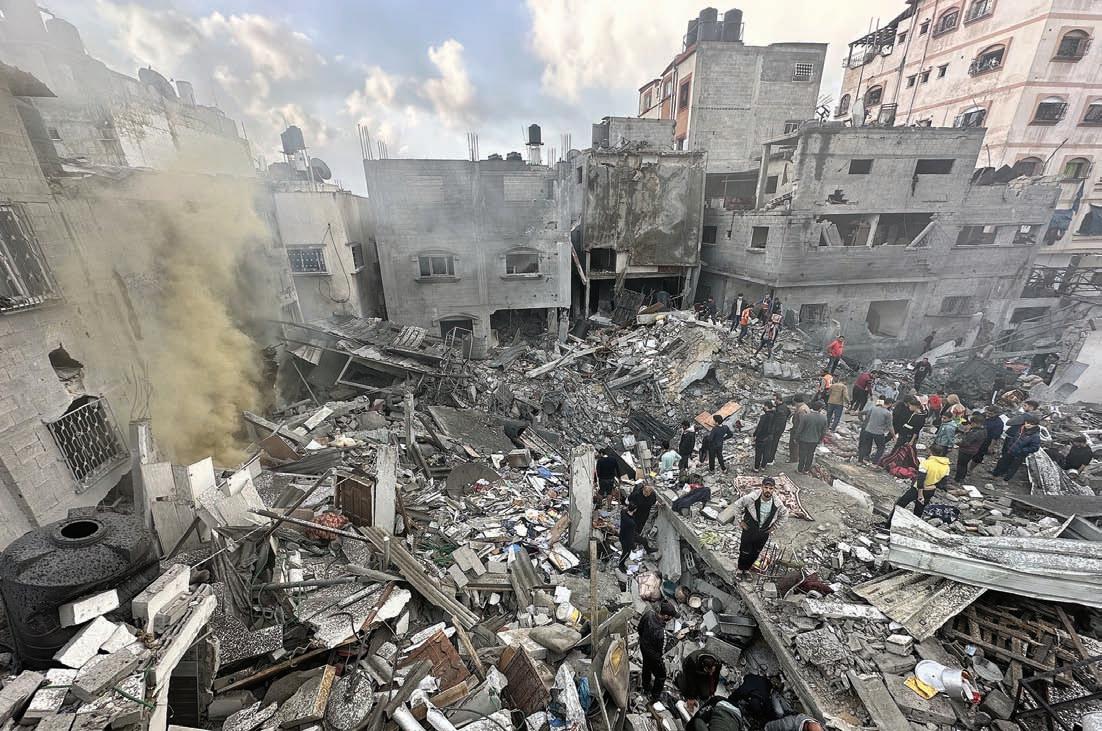
IT SHOULD ALREADY have been evident from the scale of death and destruction inflicted on Gaza over the past weeks that Israel was implementing a policy of ethnic cleansing and genocide against Palestinians in the besieged enclave.
Now Israeli whistleblowers have provided details of how these crimes against humanity are being carried out—and how they are being rationalized internally within Israel’s military and political echelons.
An extraordinary series of testimonies jointly published by the Israel-based publications 972 and Local Call last week established
Jonathan Cook is a journalist who was based in Nazareth for 20 years and a winner of the Martha Gellhorn Special Prize for Journalism. He returned to the U.K. in 2021. He is the author of Blood and Religion: The Unmasking of the Jewish State and Israel and the Clash of Civilisations (available from AET’s Middle East Books and More). This article is from the author’s blog Jonathan Cook.net and was first published by Middle East Eye.
that the huge death toll of Palestinian civilians is, in fact, integral to Israel’s war aims, not an unfortunate side effect.
The known dead so far are estimated at almost 16,000, with a further 6,000 missing, presumably crushed under rubble. Two-thirds of those killed by Israel are women and children.
Two years ago, during an earlier attack on Gaza, Israeli military officials admitted for the first time that a computer was supplying them with potential targets. The intention appears to have been to bypass the restraints imposed by human assessments of likely casualties by outsourcing the killings to a machine.
The whistleblowers confirm that, given new, generous parameters of who and what can be attacked, the artificial intelligence system, called “Gospel,” is generating lists of targets so rapidly the military cannot keep up.
Israel’s inputs are now so broad that they allow the bombing without warning of high-rise apartment blocks, so long as it can be claimed that one person residing there is believed to have a con-
nection to Hamas.
As Hamas not only has a military wing but runs the enclave’s government, the new policy potentially widens the circle of targets to include civil servants, police, health workers, educators, journalists and aid workers.
That helps explain how, according to United Nations figures, some 100,000 homes in Gaza have been levelled or made uninhabitable and at least 1.7 million Palestinians displaced, some three-quarters of the enclave’s population.
The revelations definitively give the lie to claims by Western politicians, such as U.S. President Joe Biden, UK Prime Minister Rishi Sunak and opposition Labour leader Keir Starmer, that Israel is simply defending itself and trying to avoid civilian casualties.
A report published on Dec. 1 in The Guardian corroborated Israel’s reliance on the Gospel computing system. The paper quoted a former White House official familiar with the Pentagon’s development of autonomous offensive systems as stating that Israel’s no-holds-barred AI war on Gaza was an “important moment.”
The official added: “Other states are going to be watching and learning.”
Perhaps the most significant of the disclosures from current and former Israeli officials who have spoken to 972 and Local Call is the fact that Israel is aware its many thousands of air strikes on Gaza’s residential areas are having a minimal impact on the armed wing of Hamas.
This contrasts with public declarations that Israel is seeking to eradicate the group.
Even according to the Israeli military’s own claims, likely based on the new, much broader definition of who counts as a Hamas target, Israel has killed between 1,000 and 3,000 “operatives”—meaning that, even by Israel’s assessment, civilians comprise between 85 and 95 per cent of those dead from its bombing campaigns.
This is not accidental, according to the sources.
Israel is continuing long-standing military policies toward Gaza—principally the socalled Dahiya doctrine, sometimes known
as “mowing the lawn”—but has changed the focus to allow for far greater bloodshed among civilians.
The doctrine, which has guided Israel’s repeated attacks on Gaza over the last 15 years, is named after the destruction of an entire neighborhood of Beirut in Israel’s war on Lebanon in 2006.
The doctrine has two key premises: that laying waste to an enemy area will force the population to concentrate on basic survival rather than resistance; and in the longer term it will encourage ordinary people to rise up against their rulers.
Traditionally, the Dahiya doctrine was chiefly about the destruction of infrastructure. At least officially, given the strictures of international law, Israel claimed it issued advance warnings. That was supposed to give civilians in the targeted area time to evacuate.
According to military officials, this notice period has largely ended, placing civilians directly in Israel’s crosshairs.
A source explained the effects of the new policy to 972: “The numbers increased from dozens of civilian deaths [permitted] as collateral damage as part of an attack on a senior [Hamas] official in previous operations, to hundreds of civilian deaths as collateral damage.”
A former military intelligence official said the policy was designed to make most of Gaza’s infrastructure legitimate targets: “Hamas is everywhere in Gaza; there is no building that does not have something of Hamas in it, so if you want to find a way to turn a high-rise into a target, you will be able to do so.”
According to these sources, given that Hamas’ armed wing is underground in tunnels, Israel has struggled to identify primary targets, such as weapons sites, armed cells and headquarters.
Instead, it has focused on what it calls “power targets”—or more accurately, symbolic targets—such as high-rise buildings and residential towers in urban areas, as well as public buildings such as universities, banks, government offices, hospitals and mosques.
These attacks, say the sources, are seen as a “means that allows damage to civil society” weakening the ability of the society to organize and function, and families to subsist. According to 972, the former Israeli officials it spoke to “understood, some explicitly and some implicitly, that damage to civilians is the real purpose of these attacks.”
Referring to the high death toll among civilians, another source stated: “Everything is intentional. We know exactly how much collateral damage there is in every home.”
Five different sources told 972 that Israel had compiled files on tens of thousands of private homes and apartments in Gaza where low-level Hamas members live. The homes, as well as everyone who lives in them, were viewed as a legitimate target as soon as a Hamas-linked person entered the building.
One noted: “Hamas members who don’t really matter for anything live in homes across Gaza. So they mark the home and bomb the house and kill everyone there.”
Another source observed of this practice that its equivalent would be for Hamas to bomb “all the private residences of our families when [Israeli soldiers] go back to sleep at home on the weekend.”
An official who had overseen previous attacks on Gaza said Israel would claim one floor in a high-rise was serving as the office of a Hamas or Islamic Jihad spokesman to justify levelling the building. “I understood that the floor is an excuse that allows the army to cause a lot of destruction in Gaza.”
If the truth were known about what Israel was doing, the source added, “this would itself be seen as terrorism. So they do not say it.”
Another stated that Israel’s aim was to inflict maximum damage rather than hit the part of the building associated with Hamas. “It was also possible to hit that specific target with more accurate weaponry. The bottom line is that they knocked down a high-rise for the sake of knocking down a high-rise.”
Senior Israeli officials have made this goal explicit over the past few weeks. Omer Tishler, the head of the Israeli air force, told
military reporters that entire neighborhoods had been attacked “on a large scale and not in a surgical manner.”
A source said Israel’s long-term aim was “to give the citizens of Gaza the feeling that Hamas is not in control of the situation.”
In previous attacks on Gaza, Israel adopted a strategy that inflicted wanton destruction on infrastructure and led to large numbers of Palestinians being killed. But according to the sources quoted by 972 and Local Call, all restraints have been removed, dramatically scaling up the fallout for civilians.
Tishler, the head of the air force, has confirmed that, in many cases before bombing a building, Israel no longer provides a warning strike with a small shell—known as “roof knocking.” The practice, he said, was “relevant to rounds [of fighting] and not to war.”
The risk this poses to civilians has been highlighted by the disclosure that the Israeli military is now using an artificial intelligence system, Habsora or Gospel, to identify targets.
The very name, with its biblical connotation, confirms the dangerous influences of religious fundamentalism now at play in the Israeli military, and the increasing assumption that Israel is engaged in a holy war against the Palestinians.
Israeli Prime Minister Binyamin Netanyahu, traditionally seen as a secular figure, has adopted the language of the extremist settler right in calling Israel’s attack on Gaza a war against “Amalek”—a biblical enemy whose men, women and children the Israelites were commanded by God to exterminate.
Speaking of the military’s new reliance on Gospel, Aviv Kochavi, the former head of the Israeli military, told the Israeli Ynet website earlier this year: “In the past, we would produce 50 targets in Gaza per year. Now, this machine produces 100 targets in a single day, with 50 percent of them being attacked.”
The goal, he observed, was to address a “problem” in earlier bombing campaigns against Gaza that the Israeli military quickly
ran out of Hamas and Islamic Jihad targets its human staff could identify.
A former intelligence officer told 972 that the Targets Administrative Division that runs Gospel had been turned into a “mass assassination factory.” Tens of thousands of people had been listed as “junior Hamas operatives” and were therefore treated as targets. The officer added that the “emphasis is on quantity and not on quality.”
A source who worked in the division added that most of Gospel’s recommendations were being nodded through without meaningful scrutiny: “We work quickly and there is no time to delve deep into the target. The view is that we are judged according to how many targets we manage to generate.”
The significance of these revelations—and what they disclose about Israel’s “war aims”—should not be underestimated.
Previously, the permanent siege on Gaza and Israel’s intermittent rampages based on the Dahiya doctrine were used as tools for managing the enclave.
They served as a constant reminder to Hamas of who is boss. The goal was to keep the group focused on administrative duties rather than armed resistance: repairing the destruction, devising ways to work around the siege, and restoring Hamas’ political legitimacy with a battle-weary wider public.
Now, Israel’s aim appears much more comprehensive—and final. According to a Dec. 1 report in the Financial Times, Israel is still in the early stages of a campaign that could last up to a year.
Despite the destruction of vast swaths of northern Gaza, and Israel’s current, intensified rampage in the south, an official familiar with Israel’s war plans told the paper Israel still had a long way to go.
“This will be a very long war…We’re currently not near halfway to achieving our objectives.”
Most of Gaza’s population is being herded into the Rafah area, pressed up against the short border with Egypt. As has been explained in these pages before,
Israel has had a long-term ethnic cleansing plan, seeking to pressure Cairo into rehousing Gaza’s population in Sinai.
The rapid onset of disease and starvation in the enclave from Israel’s intensified siege, denying the population food, water and power, is firmly aimed at forcing Egypt’s hand.
According to Israel Hayom, an Israeli paper with historically close links to Netanyahu’s ruling Likud party, officials in Washington, DC have been presented with a scheme to weaken Egyptian opposition further.
The U.S. would offer aid to other neighboring states conditioned on their accepting refugees from Gaza, thereby lifting some of the burden from Egypt.
Additionally, the paper’s Hebrew edition refers to a plan drafted at Netanyahu’s request by Ron Dermer, one of his senior ministers, to “thin the population in Gaza to the barest minimum possible” through expulsions. The paper refers to this as a “strategic goal” for Netanyahu.
Netanyahu is reported to believe that, after the world has accepted millions of refugees displaced from Iraq, Syria and Ukraine, why should Gaza be different? The plan envisions Palestinians leaving Gaza across the border with Egypt or fleeing by boat to Europe and Africa.
Israel’s genocidal destruction of Gaza, making it uninhabitable, is entirely consistent both with its leaders’ stated aims of treating Palestinians as “human animals” and with the whistleblowers’ revelations.
And yet Western politicians and media continue maintaining the fiction that Israel’s objectives are limited to “eliminating” Hamas—and that the only legitimate question is whether Israel is acting “proportionately.”
This wholesale failure to see the forest for the trees is not accidental. It is evidence that Western elites are wholly complicit in Israel’s expulsion of Palestinians from Gaza.
However strong the proof, even when insiders disclose Israel’s policies of genocide and mass ethnic cleansing, the West is determined to turn a blind eye. ■

By Mustafa Fetouri
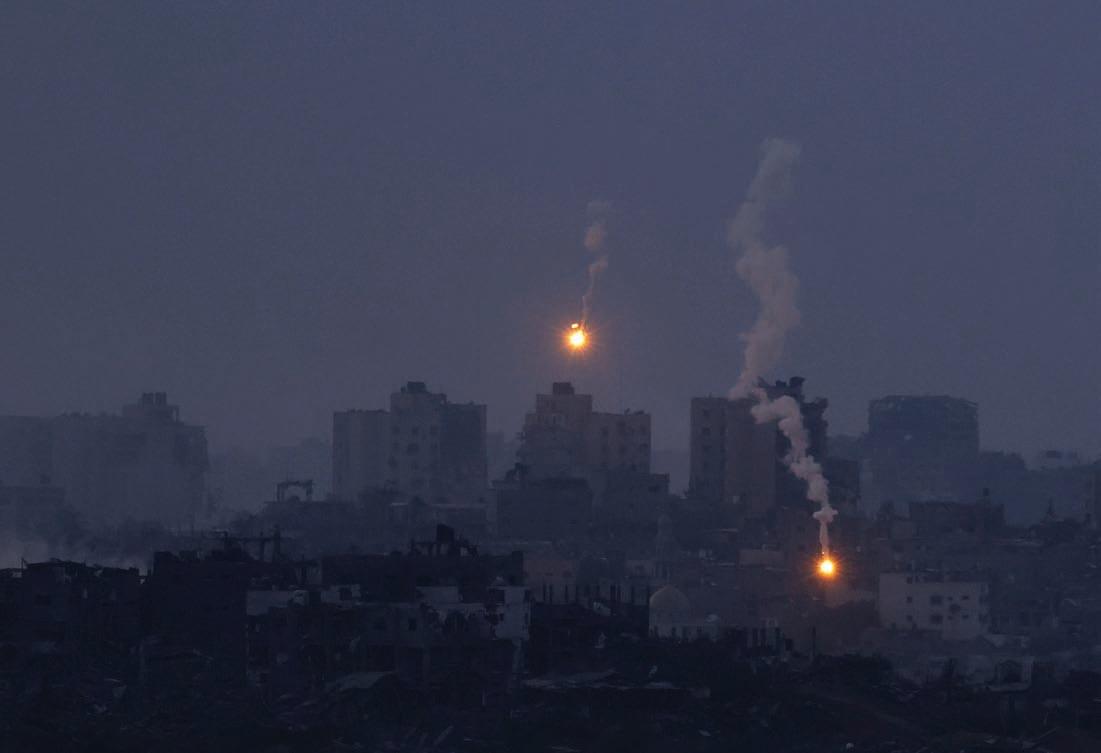
AFTER THE DARING and unprecedented Hamas attack on Israel on Oct. 7, Israel immediately launched its vengeful, destructive war on the already besieged Gaza Strip with round-the-clock bombardment. The Hamas attackers are said to have killed 1,200 and taken about 240 prisoners of war, including children, women, elderly Israelis, soldiers and foreign workers. After weeks of all-out war, the Israeli army has killed and wounded tens of thousands of Palestinians.
Israel’s response came blinded by anger, motivated by vengeance and lacking clear and achievable objectives. Con-
Mustafa Fetouri is a Libyan academic and freelance journalist. He received the EU’s Freedom of the Press prize. He has written ex ‐tensively for various media outlets on Libyan and MENA issues. He has published three books in Arabic. His email is mustafafetouri@ hotmail.com and Twitter: @MFetouri.
sumed by the fever for quick revenge, Israeli Prime Minister Binyamin Netanyahu and other top officials hastily announced what they defined as their ultimate war objectives: the end of Hamas and return of all captives.
The Israeli Defense Minister Yoav Gallant told the world, on Oct. 11, that Israel will “wipe Hamas off the face of the earth.” Two days earlier, Gallant said “we are fighting human animals” in the Gaza Strip. Netanyahu declared that “every Hamas man is a dead man.” Despite sounding unrealistic, the fuzzily set war objectives seemed to be a Hamas-free Gaza Strip.
Israel’s military and intelligence community and political leaders know only too well that their enemy is more like a ghost army of small units loosely connected and, when under pressure, tend to work independently of one another. This is not the classic war Israel’s well-supplied and technology-dependent army is used to fighting.
They know that Hamas lacks army barracks, submarines, warships, air defense systems, missile bases, military airbases, airfields (or airplanes for that matter), electronic warfare infrastructure or radar installations. Even its rockets, mostly homemade projectiles, are fired as imprecise blind missiles. An organization of this nature does not really require command and control centers, where top commanders sit in front of screens showing battle progress next to 3-D shapes displaying targets and frontline troops.
Long before the Oct. 7 attack, Israel knew that Hamas uses underground tun-
nels, which it has spent years digging underneath the overpopulated strip of land to avoid Israel’s informants and sophisticated surveillance technologies. Hamas’ work appeared to have paid off as it managed to avoid detection while preparing its well planned and rehearsed attack. Generally, wars are fought to achieve military and political objectives set by political leaders with the participation of military and security experts; they are not fought to kill as many of the other side as possible. Weeks into the war, no clearly defined objectives appeared to have been developed.
Israel’s large-scale operation in Gaza will fuel further radicalization and armed resistance against Israel’s brutal occupation. According to Dr. Richard Falk, professor emeritus of international law at Princeton University, and former U.N. special rapporteur for Occupied Palestine between 2008-2014, Israel may have inflicted great damage on the operational ability of Hamas, but in the process of doing so, it has greatly strengthened the will of Palestinians to mount armed resistance in the future.
Palestinian support for armed resistance was considerably high prior to the October attacks, and it would be naive to assume that resistance will simply evaporate even if Hamas is totally defeated. A June public opinion poll by the Ramallah-based Palestinian Center for Policy and Survey Research revealed that 52 percent of Palestinians believe that the armed struggle against Israel is the most effective means to end the Israeli occupation and build a Palestinian state.
Every colonization project generates resistance, armed or not. As Prof. Falk remarks, the history of anti-colonial struggle teaches us that the colonial side can dominate the combat zones, win every battle, kill large numbers of the native population, destroy their sources of livelihood, and yet go on to experience political defeat.
In Falk’s opinion, “Israel resembles the U.S., with an added racist element repeated by Netanyahu in the current crisis, that the Arabs, that is Hamas, only understand what he called ‘pressure,’ which in real life seems to mean genocidal devastation.”
While it is certain that Palestinian resistance in various forms will continue regardless of the outcome of the war and the fate of Hamas, the question remains how resistance will be channeled and how successful it may be. According to Prof. Falk, it is almost certain that Hamas, whether under another name or
On average Israel has killed some 286 people every day, most of them children and women. That is not war but a war crime, since it violates the laws of war and humanitarian law that Israel is supposed to observe in accordance with its historical claim of being the only democracy in the region.
As the war progressed it became clear that Israel aimed to kill, maim and displace as many Gazans as possible, making the entire enclave uninhabitable. It did not spare hospitals, schools, U.N. and residential buildings or farmlands. This has been demonstrated in the overly disproportionate
not, will emerge stronger than ever despite the huge costs Israeli’s army is exacting.
As for Israel, he thinks that it will “endeavor to fix the hard-tobelieve failures of surveillance and border security and other tactical shifts in its structures of apartheid control over a hostile Palestinian population more mobilized than ever.” Netanyahu’s coalition is trying to make the “West Bank unliveable for Palestinians and become a settler controlled mini-state within a greater Israel.” In his view, “the only potentially winning strategy for Israel is extensive ethnic cleansing by way of forced displacement beyond the borders—the Sinai solution,” Prof. Falk told the Washington Report.
While Israel is transforming Gaza into a pile of rubble, it remains unclear how the war in Gaza may affect the occupied West Bank and whether it could inspire resistance among Palestinians there. Prof. Falk assumes that Palestinians will continue to resist Israel’s attempts to gain sovereign control over the West Bank. In his view, Gaza, despite the present tragic ordeal for Gazans, “remains a sideshow” for the militant Zionists in Netanyahu’s government. Prof. Falk thinks that if Israeli ethnic cleansing schemes do not succeed in erasing or marginalizing Palestinian resistance, there will be a push for Palestinian political unity.
If and when this happens, Prof. Falk suggests that “Israelis might begin to learn from South Africa’s leaders who surprised the world by releasing Nelson Mandela from prison and agreeing to a transition to a multi-racial constitutional democracy with equal rights for all. It seems like a dream at present, but in history, dreams happen if supported by heroic action.”
Stasa Salacanin
Stasa Salacanin is an author and analyst focusing on the Middle East and Europe.
use of force against civilian infrastructure. The massive bombardment of Gaza revived legitimate Palestinian fears of another Nakba, since over half of the Gaza Strip’s population are victims of the first Nakba of 1947-1948. Over one million Gazans are descendants of the Palestinians forced to flee when Israel was founded. All of them live in eight overcrowded miserable camps dotting the Strip.
Many of these Gazans used to live in Huj, which Israel renamed Sderot. Just outside the Strip, it was one of the first and easily taken targets of Hamas fighters as they broke out of Gaza and into Israel in October.
The Biden administration has warned Israel against reoccupying or maintaining a long-term presence in the Gaza Strip. In response Netanyahu, who has yet to envision the Gaza Strip the day after the war ends, has repeatedly said that his govern-
ment’s plan is to have “overall security responsibility.” He has never explained how Israel’s security agencies and army could watch Gazans 24/7 without becoming entangled in their everyday affairs. That’s practically impossible. Israel’s lack of any well-drawn plan to end the war brings back memories of the open-ended U.S. “War on Terror.”
Among the unworkable options being floated is to have some sort of United Nations force guarding the perimeter of the Gaza Strip while local bureaucrats administer the enclave. Any such plan would require Arab financing, particularly, from the oil-rich Gulf sheikdoms. This has been already rejected by all parties: Israeli will never accept such an arrangement given its distrust of everyone else; the Gazans will refuse it because to them it is another way of disguised occupation; and Arab countries would not like to act as occupiers of the enclave.
Another scenario being debated is to hand over what remains of the enclave
(Advertisement)
to the Palestinian Authority (PA). But the PA is weak and corrupt, and lacks legitimacy. It would be hard to find any Palestinian leader willing to ride into Gaza on the back of Israel’s tanks. Besides, the PA has already rejected the idea unless there is a wider peace deal with Israel to end the occupation in the West Bank, Gaza and East Jerusalem— something the current humiliated and fractured Israeli government is not interested in.
The lack of clear and attainable war objectives make all such scenarios unrealistic. Even U.S. experts presumably advising Israel have complained about Israel’s planning and prosecution of the war. The U.S. understands about tunnels from their terrible Vietnam experience, during which the army committed horrendous atrocities against civilians, infrastructure and agriculture before withdrawing in defeat—ironically Israel is replicating all that. Yet Israel seems determined to repeat those mistakes. ■

By Rev. Dr. Alex Awad

The massacre of the innocents and the flight into Egypt, fresco painted in 1511‐1530, by Francesco da Milano at Sala dei Battuti (Flagellants Hall), Conegliano Cathedral, Veneto, Italy.
AS I WRITE this Advent devotional, a days-long ceasefire has been implemented by Israel and Hamas. During the last 47 days, we have watched Palestinian civilians massacred in real time and in great numbers—all from the safety and warmth of our homes and workplaces, due largely to Internet, social media and TV networks, among other information sources.
This man-made catastrophe capturing the world’s attention erupted on Oct. 7. Having arrived in Israel two days earlier, I was leading a group of Americans on a tour of the Holy Land. On our first day, we enjoyed visiting Christian ministries in Bethlehem. On Oct. 7, we were scheduled to visit Herodium, a hill south of Bethlehem where Herod the Great built a grand castle and the site where he is buried. Early that day as we ate our breakfast, we heard rockets and explosions in the distance and quickly learned that fighters from Hamas had fired rockets, crossed into Israel, killed soldiers and civilians, and had taken hostages. We knew then that our tour plans were going to be disrupted.
With some trepidation, we made the decision to move forward with our planned visit to Herodium. We were the only tour group
Rev. Dr. Alex Awad is a retired United Methodist missionary. He and his wife, Brenda, served in Jerusalem and in Bethlehem for more than 25 years. Rev. Awad was pastor of East Jerusalem Baptist Church, dean of students at Bethlehem Bible College and director of the Shepherd Society. Awad has written two books, Through the Eyes of the Victims and Palestinian Memories . Rev. Awad is a member of the Palestinian Christian Alliance for Peace (PCAP).
visiting. As the hours passed, knowledge of the day’s events evoked in me a sense of the conditions in the Holy Land during the time when Jesus was born. We know from Matthew’s nativity narrative that when Herod learned from the wise men that Jesus was born in Bethlehem, he told them to go find the babe, then return to him and inform him where he was so that he might “worship” the newborn king. When the angel of the Lord directed the wise men not to return to Herod and they complied, the king was outraged and ordered the slaughter of many children.
As we visited the palace of this great liar, deceiver and mass murderer, little did we know that in the next 45 days we would watch news of Herod-like leaders commit atrocities on the civilians of Gaza, leading to the death of more than 5,000 children. World leaders both directly and indirectly lent a hand in the massacre of more than 16,000 men, women and children in Gaza.
Herod’s massacre of the children did not achieve his desire to destroy the baby born to be the Prince of Peace. Neither will the Israeli massacre of Palestinian children achieve Israel’s goal of forever subjugating the Palestinians and denying them the dignity and the freedom that they deserve. Light is more powerful than darkness and life is more powerful than death. The Palestinian people who aspire for freedom will overcome the darkness of today just as baby Jesus overcame the wrath of Herod.
The Christmas story gives oppressed people around the world hope—hope that light, truth and goodness will overcome evil. ■
By Asa Winstanley
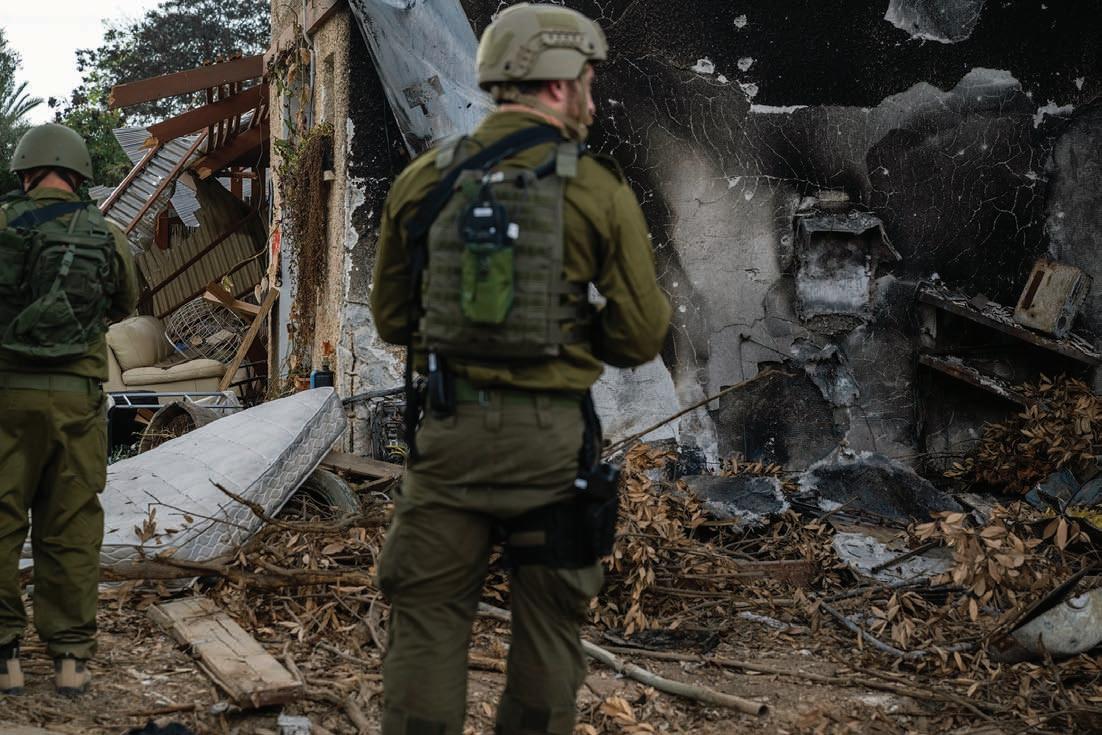
soldiers
past houses that were destroyed on Oct. 7 in Kfar Aza near the Gaza border on Nov. 12, 2023. In Israel’s chaotic and indiscriminate response to the Hamas attack, aircrews and drone operators could not distinguish between Palestinian fighters and Israeli civilians or soldiers. Pilots were given targets inside the kibbutzim by residents calling on their mobile phones.
AN AIR FORCE COLONEL has said that Israeli airstrikes may have intentionally killed Israeli captives rather than let them be taken to Gaza. Speaking in Hebrew about the airstrikes, Colonel Nof Erez told a Haaretz podcast in November, that “the Hannibal Directive was apparently applied” and that Oct. 7 “was a mass Hannibal.”
After weeks of claiming that 1,400 “civilians” were killed that day, in November Israel revised its death toll down to about 900 civilians plus around 300 soldiers and police. An official Israeli account posting to X (formerly Twitter) on Dec. 2 appeared to lower the death toll even further to “over 1,000.”
Asa Winstanley is an investigative journalist who lives in London. He is an associate editor of The Electronic Intifada and co ‐host of its podcast. This article was first published Dec. 5, 2023 on The Electronic Intifada.
Erez’s interview was first reported in English by The Cradle. TheElectronic Intifada did its own independent translation and can verify The Cradle’s reporting. Named after Hannibal—an ancient Carthaginian general who poisoned himself rather than be captured alive—Israel established the secretive military doctrine about 30 years ago. Its aim was to stop resistance fighters from capturing Israelis who could be used to negotiate prisoner swaps. In 2011, Israel released 1,027 Palestinian prisoners in exchange for a single captured soldier who had been held in Gaza for five years.
Colonel Erez’s interview with Haaretz painted a picture of a chaotically indiscriminate Israeli response to the Palestinian military assault on Oct 7. Erez told the podcast there had been “tons of openings in the fence” with Gaza and that “thousands of people in every type of vehicle, some with hostages and some without” were moving back and forth between Gaza and the Israeli settlements and that
“it was an impossible mission” for the aircrews to distinguish between Palestinian fighters and Israeli detainees.
Asked by Haaretz interviewer Lior Kodner about “rumors that the army exploded all kinds of houses inside the settlements” and about the Hannibal Directive, Erez confirmed that the air force did indeed “explode houses” but insisted they never did so “without permission.”
But the Palestinian military assault that morning was so successful that it may have been impossible to obtain permission from senior officers. Dozens of Israeli army bases and outposts were completely overrun by Hamas and other armed factions on Oct. 7. They deliberately targeted the Israeli army’s communications infrastructure across the whole region. Israel’s regional military command and control was rapidly eliminated.
“There was no division command” left at that stage, Erez confirmed. It had been destroyed almost immediately by the Palestinian resistance assault that began at 6:30 a.m. There was no command and control left in the region until later in the day, he said.
Erez explained that helicopter pilots had been reduced to using mobile phones to call the settlement emergency squads, effectively local Israeli militias in the area, who were trying to stop the Palestinian assault.
These militias apparently directed the pilots, telling them which houses to blow up. It seems that they often did so even at the expense of killing the captive Israelis.
After some prevarication by Erez about the controversial Hannibal Directive, the Haaretz host asked the colonel outright:
“Did it happen this time?”
At first, Erez would only tacitly concede that Israeli captives may have been “harmed at the stage when helicopters and drones began firing toward the fence, when they saw the masses entering and exiting.”
But pressed further Erez stated more clearly: “The Hannibal Directive was apparently applied at a certain stage.”
He explained that he had trained “for all of the last 20 years,” to execute the Hannibal doctrine in just such a scenario, of a Palestinian vehicle fleeing the scene
with an Israeli captive.
What made Oct. 7 new, he said, was that “this was a mass Hannibal. There were tons and tons of openings in the fence, and thousands of people in every type of vehicle, some with hostages and some without.”
Erez’s account backs up the testimony of an anonymous Israeli helicopter commander published by the news website Ynet in October. The pilot was from 190 Squadron, which flies Apaches.
The Electronic Intifada translated the article into English in November.
“Lt. Col. A” said that on Oct. 7 the air force sent more than two dozen attack helicopters—as well as Elbit drones—to shoot at everything along the Gaza fence with Hellfire missiles and machine guns.
Ynet reported the air force admitting that “it was very difficult to distinguish between terrorists and [Israeli] soldiers or civilians” but that the commander instructed his pilots “to shoot at everything they see in the area of the fence” with Gaza anyway.
“The frequency of fire at the thousands of terrorists was enormous at the start, and only at a certain point did the pilots begin to slow their attacks and carefully choose the targets,” the paper reported, citing an Israeli air force investigation. According to the air force, in the first four hours the pilots “attacked about 300 targets, most in Israeli territory.”
In another recent discovery by The Cradle, these accounts have been backed up by an interview with members of a drone squadron conducted by the Israeli magazine Mishpacha, a publication targeted at religious Jews. According to the magazine, Squadron 161 is the only Israeli unit operating the Elbit Hermes 450 assault drone, also known as the “Zik.”
Drones were the first aircraft to respond to the Palestinian military assault, the magazine states. They carried out airstrikes “inside Israeli territory, inside bases, inside kibbutzim, something they had never prepared for.”
An anonymous pilot told the magazine of chaotic scenes that day. “We usually get an
orderly intelligence briefing in advance,” he said. But since Palestinian fighters had so successfully taken down Israel’s military communications system, such a briefing was impossible.
“In this case, our intelligence source was civilians on the ground,” the anonymous drone pilot said, verifying Colonel Erez’s account. “We entered our control stations with our phones, which is usually against protocol.”
In the same way as Erez’s men: “we called civilians in the kibbutzim and yishuvim [two types of Israeli settlements] in real time, and they gave us terrorists’ locations.”
The Mishpacha article does not explicitly mention the Hannibal Directive. But it does report that during each assault the drones “killed dozens of terrorists,” preventing them from “returning to the [Gaza] Strip with captives.”
It’s hard to imagine any way a remotely piloted war drone like the Hermes 450 could prevent Palestinian fighters from returning to Gaza with their Israeli captives other than killing all of them together.
Erez spent 20 years in the military and an additional 24 years as a reservist. Earlier this year he was one of several reserve air pilots who said they would stop attending training to protest Prime Minister Binyamin Netanyahu’s plans to overhaul the Israeli judiciary.
But his temporary refusal to serve in the military over political differences didn’t last long. In his Haaretz interview he said that he “saw numerous drones above every [Gaza frontier] settlement on a computer image” in an Israeli military command center on Oct. 7.
Ynet reported at the end of October that he had been on “active service,” but was relieved of his command soon after, following promises he made privately to “dismantle” Netanyahu’s government after the current war is over.
Erez’s personal animosity toward Netanyahu might partly explain his willingness to talk explicitly about the Hannibal Directive to the press. ■
By Thomas Suárez

The Israeli broadcaster Kan posted a video on its X account of Israeli children singing violent and genocidal lyrics, including that the IDF will annihilate the “swastika ‐ bearers. In another year there will be nothing there,” against a backdrop of Israeli planes bombing Palestinian homes. The client for this propaganda campaign in support of Israel’s genocide in Gaza was The Civil Front.
OCTOBER 7, 2023 was a deadly day for people on the Israeli side of the Armistice line with Gaza. Most of the casualties were Israeli (some were foreign workers), and all the Israelis were presumably Jewish. Whether, as the much-quoted phrase at issue has it, October 7 was “the deadliest day for Jews since the Holocaust” is debatable; but let’s assume that it was, even though the official number of 1,200 does not distinguish between civilians and soldiers, nor between civilians killed by Hamas and those killed by the IDF in its botched rescue.
The problem with the phrase is not statistics. The problem, rather, is that this lament’s exterior message is merely a Trojan horse for powerful propaganda hidden within.
For 75 years and counting, the Israeli state has been working toward removing as many non-Jews as possible from the river to the sea and subjugating any remaining non-Jews to apartheid. That is
Thomas Suárez is a London‐based historical researcher as well as a professional Juilliard‐trained violinist and composer. A former West Bank resident, his books include three works on the history of cartography, and four on Palestine, most recently Palestine Hijacked—How Zionism Forged an Apartheid State from River to Sea, available from Middle East Books and More. This article was first published on Mondoweiss.
the so-called “conflict,” unabridged. But this being unacceptable in the modern world, Israel must constantly invert reality, a chore which the hidden messages of “the deadliest day since the Holocaust” accomplish brilliantly.
By invoking the Holocaust and the victims’ identity as Jews, it subliminally but powerfully reinforces the lie that Palestinians are hostile to Israelis because they are Jewish and that Hamas’ breaching of the siege on Oct. 7 was rooted in anti-Semitism. And it takes eyes off the actual crime—that Israel has turned Gaza into a concentration camp for non-Jews.
No—Hamas’ purpose was to kidnap Israelis because, denied any conventional means of self-defense, hostages were the only bargaining collateral they could seize. This is neither to defend nor condemn what Hamas did, nor to attempt to sort atrocity fact from fiction. The point, rather, is that the “deadliest day for Jews since the Holocaust” line is a cynical exploitation of those deaths to empower the state that is the ultimate cause of all the violence.
The Holocaust reference is a continuation of a Zionist dehumanization tactic dating back to the immediate post-war era: the systematic transferring of Nazi identity onto the Palestinians. In 1948, this served Zionism by easing the conscience of the war’s Jewish survivors who, having survived the Holocaust, were now
Haganah members in Palestine razing other people’s villages because of their ethnicity.
Today’s propagandists go further—we increasingly hear that Hamas is not merely as bad as the Nazis, but worse. The reason? The Nazis, this Holocaust revisionism goes, considered their crimes to be crimes, whereas Hamas does not consider its crimes to be so. Hamas, the argument goes, is like the Nazis but without the Nazis’ alleged moral compass. This tactical transference of Nazi identity onto the Palestinians is also seen in the Israeli indoctrination song for children produced in the aftermath of Oct. 7, in
which Palestinians, and specifically the people of Gaza, are referred to as “swastika-bearers.” For Zionism to achieve its ultimate goal of a “racially pure” state, the Israeli masses must see the Palestinians as subhuman heirs to the Nazis, and this indoctrination is best begun with children.
There is a final, cynical irony to the “deadliest day for Jews since the Holocaust.” The land adjoining Gaza onto which Hamas fighters sailed is actually part of Palestine according to the U.N. Partition, but Israel seized it in 1948 and forced its people to Gaza—the descendants of whom are now being massacred. So, yes, the victims were Jewish because Israel
(Advertisement)
had ethnically cleansed the land of nonJews and filled it with Jewish settlers.
Zionism failed Jews during their darkest days, consistently placing its political interests above their survival and emancipation. It not merely failed to pursue a safe haven outside of Palestine, but even forcibly blocked it. Yet the Israeli state now squanders the memory of the Nazis’ victims in order to empower its own race crimes, a tactic of which the “deadliest day since” is a particularly cynical example. Hidden in those words is, “We, Israel, are the moral weight of the Holocaust, and those who challenge us are the heirs of the Nazis.” ■

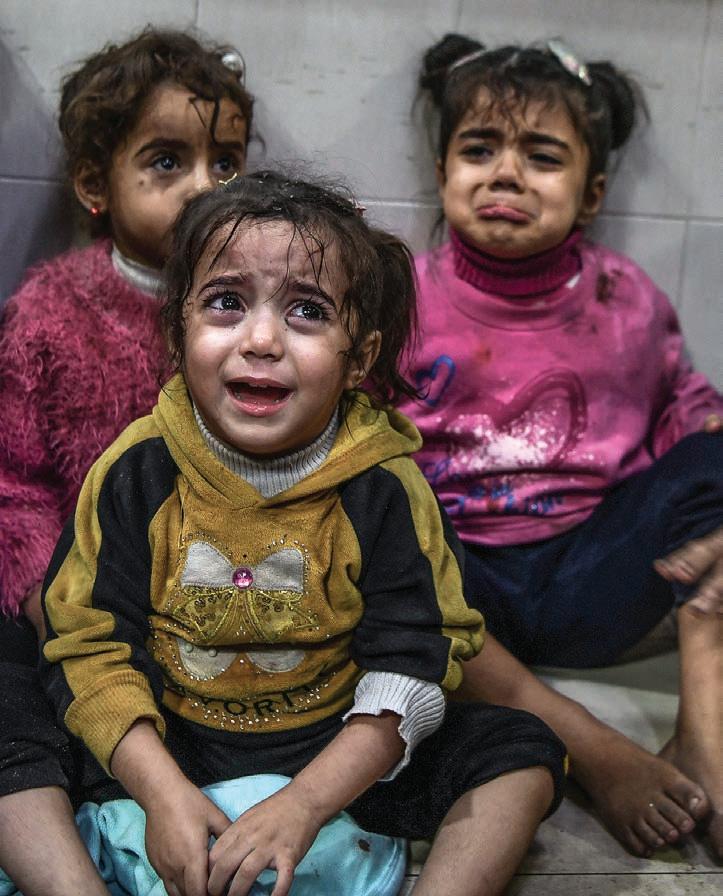
Injured Palestinian children wait to receive medical treatment at Nasser Hospital after Israeli airstrikes in Khan Yunis, Gaza on Dec. 5, 2023. Every few minutes, a child is rushed to what remains of a hospital, sometimes without anyone accompanying them.
A BEREAVED FATHER, whose 8-year-old son was shot dead by soldiers, stood this week at the entrance to his home at the border of the Jenin refugee camp and stated the simple truth: “These children will never forgive the soldiers. You’re raising another generation of resistance. Now our children want Israeli children to be killed too.”
Gideon Levy is an Israeli journalist and the author of The Punish‐ment of Gaza , available from Middle East Books and More. This article was first published in Haaretz, on Dec. 3, 2023. © Haaretz Reprinted with permission.
By Gideon Levy Special Report
I visited the home of the father, Samer alGhoul, after a visit to the Jenin camp where the Israel Defense Forces once again sowed destruction in recent days, to a horrifying extent. About 80 homes were demolished, all the roads in the camp were uprooted from their place and the sewage, whose infrastructure was destroyed, is flowing in the streets and raising a stench. The children of the Jenin camp wallow in it.
At the other end of the realms of the occupation, children are now being killed by the thousands. The recent pictures from Jabalya showed that neither God nor the IDF has mercy on the little children. Every 15 minutes, a child is killed in Gaza. Every few minutes, a child is rushed to what remains of a hospital, tossed onto the filthy floor, sometimes without anyone accompanying him.
Sometimes nobody knows if anyone is left from his family, and the child casts an uncomprehending, glassy-eyed glance at what’s happening around him. His body and face are covered with dust; he was pulled out of the ruins. These sights are broadcast continuously on all the television channels that know the meaning of journalism, with the exception of Israeli television, which shows nothing of that, after becoming fully mobilized in the service of the war.
All these children—the dead, dying, bleeding, groaning, wounded, disabled, the orphans, the terrified, the homeless and penniless—have siblings and friends who grow up with them. They’re the next generation, and they’ll never forget. While Israel is preoccupied with its terrible and justified rage at what Hamas did to it, and with healing its wounds and its wounded, almost nobody is upset at what the IDF is doing to Gaza and Jenin.
Nobody thinks about the trauma in whose shadow the children of Gaza will grow up, about the inconceivable suffering of tens of thousands of children who are now walking around helpless, in existential fear, in the ruined streets. They have no bomb shelter and no resilience center, no psychological consultation and not
even a home.
Maybe it’s permissible and natural for a nation to focus solely on its own pain and to ignore the far greater pain that it is causing another nation. That’s very doubtful. But this ignoring will also have a price that the Israelis will be forced to pay some day, and the price—at least that—must disturb them.
An unbridled and terribly cruel attack against Gaza creates hatred of Israel at levels we’ve never seen before, in Gaza, in the West Bank, in the Palestinian diaspora, in the Arab world and everywhere in the world where people are seeing what the Israelis don’t see and don’t want to see. And what’s even more terrible is this hatred will be justified. Nothing will be more justified.
Look what hatred was sown in the hearts of almost all Israelis by one barbaric attack. It destroyed the vestiges of the peace camp, it turned the cry “death to the Arabs” into something anachronistic and moderate. Now it’s “death to all the Arabs.” Some say it aloud, some only think it. Imagine what seeds of hatred are
budding in every place that’s now being exposed to the horrors, from Shujaiya to Manhattan to Amman.
Can one see the horrors in Gaza and not hate those who are inflicting them? Experience what’s happening in Gaza and not dream of revenge? Generations of Palestinians bequeathed hatred for Israel as a result of the first Nakba, and other generations will now bequeath even greater hatred, as a result of the second Nakba that’s promised to them.
“The next generation is sleeping in the next room / I hear him breathing / The next generation is dreaming in the next room / and murmuring fears in his sleep,” sings Hanan Yovel to the words of Ehud Manor; the next Palestinian generation is murmuring fear in its sleep, but it isn’t in the next room—it has no room.
And in a few months from now, good Israelis will once again travel to Paris and London, Dubai and New York, and will be shocked by how they hate us. Why? What did we do wrong? ■
(Advertisement)
Please enter or renew my subscription to the Washington Report. Circle Appropriate Price:


only Subscription 10 20 30
■ Add $15.00 per year for my subscription to “Other Voices,” a 16-page must-read insert in every issue
■ Check/Money order payable to Washington Report enclosed (U.S. Funds only)
■ Send me an invoice with my first issue to my address below.
■ Use this form and the lines above to start a gift subscription. Enter your name and subscriber number (located on your magazine label, beginning with WR).
■ You can also scan the QR code at right to subscribe online.

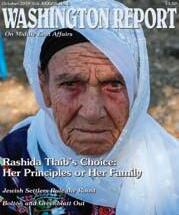


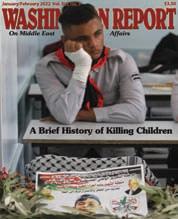

By Allan C. Brownfeld
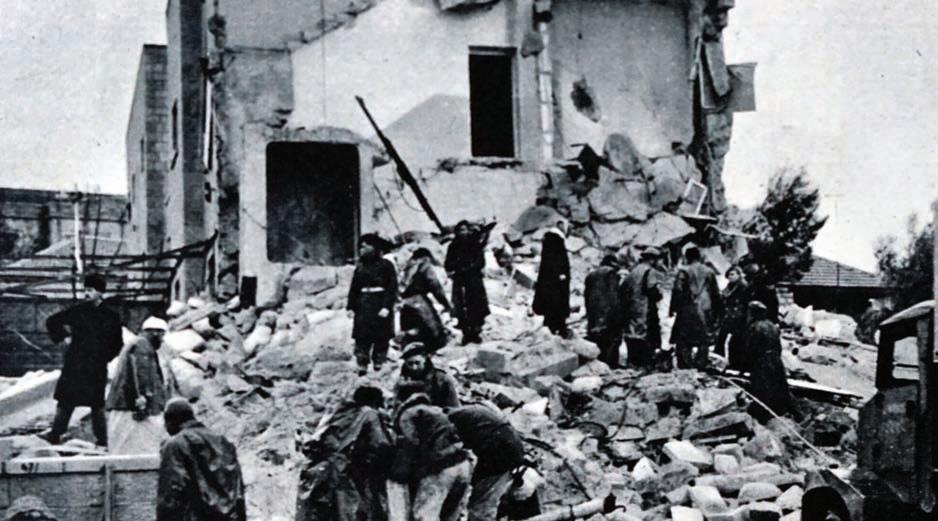
The Haganah bombed the Christian‐owned Semiramis Hotel in the Katamon neighborhood of Jerusalem in January 1948. Leaders hoped the attack might force Arabs out of the quarter and change the psychological climate in the city. The explosion killed 26 civilians including at least one child and the Spanish vice‐consul.
IN RECENT DAYS, global attention has been focused on the Oct. 7 Hamas assault on Israel’s southern settlements and Israel’s retaliatory, unrelenting bombardment of the Gaza Strip. In the mainstream media, the former is uniformly described as terrorism, the latter less so, even though U.N. figures are referring to it as genocide. To understand contemporary Israel, particularly its policy toward Palestinians, it is useful to understand the long history of Zionist terrorism and its ethnic cleansing of Palestinian towns and villages in 1948, which led to this moment.
The history of pre-Israel Palestine gives ample evidence of the terrorist mindset that produced acts of violence by Jews which took the lives of fellow Jews, Arabs and others who involved themselves in the political debates over the creation of Israel. Zionists employed terrorism to remove indigenous Arabs and other perceived enemies who were in the way. Consider these examples:
• In 1933, Haim Arlosoroff, a young Labor Party politician seemingly destined to be the first prime minister of the future Jewish state,
Allan C. Brownfeld is a syndicated columnist and associate editor of the Lincoln Review, a journal published by the Lincoln Institute for Research and Education, and editor of Issues, the quarterly journal of the American Council for Judaism.
was shot dead while walking on a Tel Aviv beach. His murder came at the height of a campaign of personal denunciation conducted by a group of rightwing Zionists known as Brit HaBirionim (“Covenant of terrorists”). Arlosoroff angered the extreme right because of his attempts to negotiate with Nazi Germany to secure freedom for German Jews to leave with their money. The murder blackened the image of the Revisionist movement, causing it widely to be seen as fascist and terrorist.
• During the darkest days of World War II, when Great Britain stood alone against Nazi Germany, Avraham Stern created Lehi (Fighters for the Freedom of Israel) in 1940 to fight the British Mandate in Palestine. When all other Jewish groups in Palestine declared a cease-fire with the British and prayed that the Allied forces would survive the 1940-42 Nazi offensive, Lehi forces planted bombs in British installations and killed British soldiers. Their leaders even sent messages of support to the Nazis and offered their cooperation in the future Nazi world order.
• In Cairo in November 1944, Lehi members murdered Lord Moyne, a member of the British war cabinet who served as state minister for the Middle East. Lord Moyne, a close friend of Winston Churchill, was killed because he was thought to be responsible for blocking the entrance to Palestine of Jewish refugees.
• In July 1946, members of the Zionist terror group Irgun, commanded by future prime minister Menachem Begin, blew up Jerusalem’s King David Hotel, which served as the headquarters of the British administration in Palestine. More than 91 civilians were killed, including many Jews.
• In April 1948, the Irgun and Lehi with the reluctant acquiescence of the mainstream Jewish defense organization, the Haganah, launched an attack on the Palestinian village of Deir Yassin, on the outskirts of Jerusalem. Inhabitants of the village were lined up against the wall and shot. More than one hundred civilians were killed. Most of the victims of the Deir Yassin massacre were women, children and older people. News of the massacre spread rapidly and helped prompt the flight of hundreds of thousands of Palestini-
ans from their homes.
Irgun leader Begin issued this euphoric message to his troops after the attack: “Accept my congratulations on this splendid act of conquest…As in Deir Yassin, so everywhere, we will attack and smite the enemy. God, God, Thou hast chosen us for conquest.”
David Shipler, Jerusalem bureau chief for the New York Times from 1979 to 1984, reports that “The Jewish fighters who planned the attack on Deir Yassin also had a larger purpose, apparently. A Jerusalem woman and her son, who gave some of the men coffee in the pre-dawn hours before their mission, recall the guerrillas talking excitedly of the prospect of terrifying Arabs far beyond the village of Deir Yassin so that they would run away. Perhaps this explains why the Jewish guerrillas did not bury the Arabs they had killed, but left their bodies to be seen, and why they paraded surviving prisoners, blindfolded and with hands bound, in the backs of trucks through the streets of Jerusalem, a scene still remembered with a shudder by Jews who saw it.”
Benny Morris writes in The Birth of the Palestinian Refugee Problem Revisited that Lehi terrorists told of the barbaric behavior of the Irgun toward the prisoners and the dead. Survivors said that Zionist forces terrorized, robbed, raped, brutalized and blasted villagers with hand grenades. Everyone, from the unborn and nursing infants to the elderly, was a target for elimination. Zionist forces committed many similar massacres to induce Palestinians to flee for their lives:
• On Sept. 17, 1948 Jewish terrorists assassinated Count Folke Bernadotte, a Swedish diplomat (who had negotiated the release of about 31,000 prisoners from German concentration camps) after he submitted a peace plan to the U.N. General Assembly. They regarded his plan as interference with the new state, particularly its proposal that Jerusalem be placed under U.N. control and that Palestinian refugees be allowed to return to the country.
• Another massacre of Arabs occurred on Oct. 29, 1956, the eve of Israel’s Suez campaign, when the army ordered all Israeli Arab villages near the Jordanian border to be placed under a wartime curfew. Any Arab on the streets would be shot. In Kfar Kassem,
Israeli border troops slaughtered villagers as they came home from work, unaware that a curfew had been imposed. Villagers were hauled out of trucks, lined up and shot.
• The assassination of Prime Minister Yitzhak Rabin in 1995 by an ultra-Orthodox religious zealot, Yigal Amir, brought the world of Israel’s religious extremists under public scrutiny. The assassin was not a lone psychotic gunman, but a young man nurtured within Israel’s far-right religious institutions. After the murder, Amir was hailed as a hero, not only in Israel but also by kindred spirits in the U.S.
In their book about the Rabin assassination, Murder in the Name of God, Professors Michael Karpin and Ina Friedman note that Amir believes “there is only one guideline for fixing the borders of the Land of Israel: the Divine Promise made to the Patriarch Abraham: ‘To your descendants I give this land, from the River of Egypt to the great river, the river Euphrates’ (Genesis 15:18). Today these borders embrace most of the Middle East, from Egypt to Iraq… zealots read this passage as God’s Will, and God’s Will must be obeyed, whatever the cost. No mortal has the right to settle for borders any narrower than these. Thus, negotiating a peace settlement with Israel’s neighbors is unthinkable.”
Among those activists Amir held in high esteem was mass murderer Baruch Goldstein, a follower of Meir Kahane, who massacred Arabs in Hebron 1994. Among the ideologues Amir and Goldstein especially admired was Noam Livnat of the Od Yosef Chai (Joseph Still Lives) religious school in Nablus. The school’s patron, Rabbi Yitzhak Ginsburg, repeatedly expressed a doctrine of racism, declaring that “Jewish blood and Gentile blood are not the same.” He lauded Goldstein for massacring Arabs in Hebron. Ginsburg explained that he differentiated between the murder of a Gentile and that of a Jew because the Torah places a “light prohibition” on the former and a “grave” one on the latter.
In his book Ten Myths About Israel, Israeli historian Ilan Pappé discusses the myth that Palestinians went into exile voluntarily in 1948. He notes that “The Zionist leadership and ideologues could not envision a successful implementation of their project without getting rid of the native pop-
ulation, either through agreement or by force.” In 1937, David Ben-Gurion told the Zionist Assembly: “In many parts of the country it will not be possible to settle without transferring the Arab fellahin [peasants].” He wrote: “With compulsory transfer we would have a vast area for settlement… I support compulsory transfer. I don’t see anything immoral in it.”
Like many historians of Palestine, Pappé argues that the leaders of the Zionist movement, which became the government of Israel, committed ethnic cleansing. The definition of that crime was clarified in the aftermath of the 1990s civil war in the Balkans: ethnic cleansing is any action by one ethnic group meant to drive out another ethnic group with the purpose of transforming a mixed ethnic region into a pure one.
Last October, Hamas used terrorist tactics, presumably to scare Israeli settlers into leaving their kibbutzim. As that was underway, the Netanyahu government was establishing new Jewish settlements in the West Bank. Israeli settlements have violated international law for more than 50 years, and the current government speaks of annexing more land. Militant Jewish settlers have been engaging in violent acts against the indigenous Palestinian population in an effort to remove them from their homes and villages.
The Israeli human rights organization Yesh Din reports that settlers attacked Palestinians in the West Bank on 100 different occasions in at least 62 locations between Oct. 7 and 22. According to the United Nations, 12 percent of Palestinian herding communities fled their homes as of September, primarily due to settlers attacking them and preventing them from accessing their land. The Israeli newspaper Haaretz reports that IDF soldiers often participate in settler attacks.
Terrorism and ethnic cleansing, which have characterized Israeli policy since 1948, seem to be accelerating at the present time. The right-wing Netanyahu government seems indifferent to the reactions of friends of Israel throughout the world, which believe that such policies, including bombings in Gaza that observers are describing as genocide, threaten the country’s future. ■
By Rosemarie M. Esber
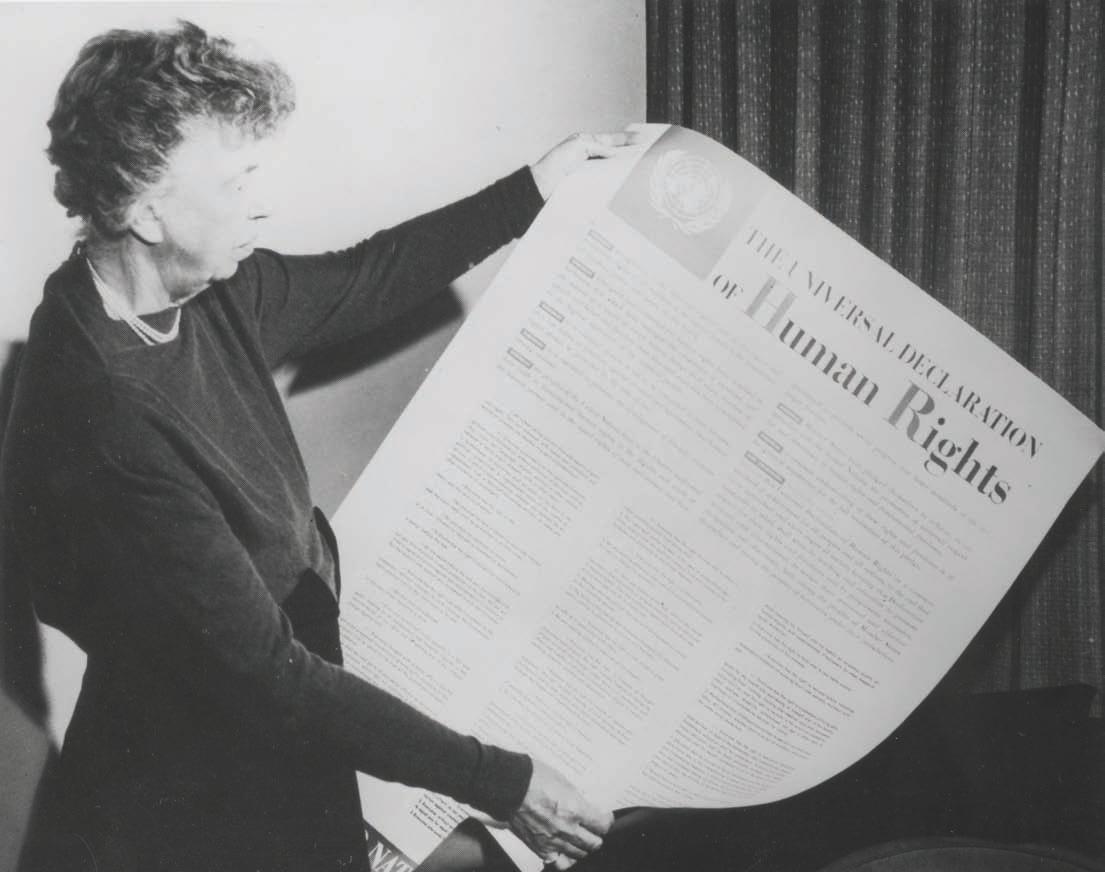
ANNA ELEANOR ROOSEVELT was the most important public woman of the 20th century and remains among the most admired women in American history. She was an extraordinary person with many remarkable achievements. Eleanor Roosevelt (or ER as she signed her syndicated “My Day” column) served as first lady from March 1933 to April 1945 during the presidency of her husband, Franklin Delano Roosevelt (FDR). She was an influential print and radio journalist, a skillful professional politi-
Rosemarie M. Esber, Ph.D., is the author of Under the Cover of War: The Zionist Expulsion of the Palestinians (Arabicus 2009). Her second book, Eleanor Roosevelt and the Palestinians , is forthcoming in 2024.
cian, a powerful leader in the Democratic Party, a United Nations delegate and an internationally admired diplomat with global influence.
After FDR’s sudden death in April 1945, Vice President Harry S. Truman succeeded him. President Truman dubbed Mrs. Roosevelt the “First Lady of the World” and appointed her as a delegate to the newly formed United Nations. Mrs. Roosevelt chaired the U.N. Committee on Social, Humanitarian and Cultural Issues, which gave her authority to influence decisions about the future of Palestine. Mrs. Roosevelt exercised her influence to the detriment of the Palestinians, which directly contributed to 75 years of ongoing regional turmoil.
Mrs. Roosevelt considered her greatest achievement the Universal Declaration of Human Rights, which she helped to draft and pass at the U.N. General Assembly in December 1948—even as Israeli militias were forcing Palestinians en masse from their homes and lands to establish a Jewish state in Palestine. The world observes the 75th anniversary of the Universal Declaration of Human Rights on Dec. 5, 2023, even as Palestinians are engaged in an existential struggle to secure those rights.
Mrs. Roosevelt is revered for her human rights achievements. She understood that race relations had to be confronted in the United States, and she was willing to do it despite the costs to herself. She supported African Americans’ civil rights and women’s rights. She spoke out against the Japanese American incarceration during World War II. She became an early and effective supporter of the Jews and the Zionists’ goal of establishing a Jewish homeland in Palestine. Her biggest regret was that she had not forced FDR to accept more Jewish refugees into the U.S. during World War II.
Although heralded as “an uncompromising champion of the poor and oppressed,” Mrs. Roosevelt had at least one blind spot: Palestine and the Palestinians. Her passionate support of the Zionists’ claims to Palestine and her disregard for the human, civil and territorial rights of the majority indigenous Palestinians greatly influenced public opinion during her lifetime and beyond. Like many of her generation, Mrs. Roosevelt was biased against Arabs and Muslims generally, and specifically against the Palestinian Arabs in their competing territorial claims with the Zionist Jews over Palestine. Like her husband, she tended to see “the Arabs” as an extensive nomadic primitive tribe that required the civilizing guidance of Western governments and systems—a view that was encouraged by the Zionists.
As for the case of Palestine before the United Nations in 1947, Mrs. Roosevelt viewed “the Arabs” as defiant and unwilling to abide by colonial European declarations
or the Western-dominated United Nations and U.S. imperialist prescriptions for the settlement of the Palestine question. Ignoring the legitimate human rights of the Palestinian people to self-determination— which she was in the process of codifying at the United Nations in the acclaimed Universal Declaration of Human Rights—she vigorously supported U.S. military intervention and violence to force the Palestinians’ acquiescence to the partition of their homeland into a Jewish state and an Arab state—with sovereignty over the larger portion of Palestine awarded to the minority, mainly immigrant European Zionist Jews.
The woman internationally revered as a champion for human rights was directly advocating the suppression of the rights of the Palestinian Arabs by force. She wrote, “We should stand ready at the request of the U.N. to remove our embargo on arms and to provide such things as are essential to the control of the Arabs, namely, modern implements of war such as tanks, airplanes, etc.”
The extensive writings by Mrs. Roosevelt—and about her—made it clear that she had chosen a side in the Palestine question early in her life and it was not the side of international law or human rights. Mrs. Roosevelt wielded her political power at the highest levels of the U.S. government and through her access to the media she could influence decision makers and the American public to support the establishment of a Jewish state in Palestine. She advocated for military action to force the Palestinian Arabs to comply with the United Nations partition recommendation. Eleanor Roosevelt’s power and influence contributed to the dispossession of the Palestinians and their ongoing existence as refugees and displaced persons.
Eleanor Roosevelt’s opinions, decisions, and attitudes contributed to the U.N.’s decision to recommend the partition of Palestine in November 1947, which predictably sparked the 1948 Palestine war, and ultimately resulted in the establishment of the State of Israel and the forced displacement and exile of
85 percent of the Palestinian people— more than 800,000 civilians—from their homes, lands and livelihoods. In 2023, the Palestinians remain refugees or internally displaced from their homes and lands despite the international legal right of refugees to return to their homeland.
The regional and international instability and crises since the 1948 Palestine war has not ceased as Mrs. Roosevelt assumed in time that it would. Rather, as U.S. military and intelligence officers predicted in 1947, and Arab state leaders warned, the Palestinian Nakba or catastrophe intensified instability and violence. The violence includes the ongoing human rights abuses against the Palestinian people on occupied Palestinian lands perpetrated by the State of Israel and Israeli settlers—with the massive financial, political and military support of the U.S. government and others—most barbarously during Israel’s accelerated genocide against the impoverished Palestinians inhabiting the Gaza Strip after the Hamas attack on Israel on Oct. 7, 2023.
Because Mrs. Roosevelt was (and is) so highly esteemed, her opinions and actions had a profound impact and an enduring influence nationally and internationally. She helped to shape U.S. domestic and foreign policies, as well as international policy at the United Nations. She was a champion of international human rights and fought against injustice for many causes. Mrs. Roosevelt affected the course of events during her lifetime and her legacy continues to influence public policy in the United States and internationally.
Unquestionably, Mrs. Roosevelt left indelible marks on her times and beyond, including the U.S. government’s prejudicial denial of Palestinian human rights, most importantly, the right to self-determination and the right of Palestinians to return to their country. It is past time to reverse the Palestinians’ dispossession inflicted by Israel during the 1948 Nakba and for the international community to enforce U.N. Resolution 194, calling for the repatriation and compensation of the Palestinians. ■
BEING tapped for a U.N. post that deals in any way with Israel must be like waking up to find a camel’s head stuffed next to you in the bed. If the position concerns human rights, then you can throw in the hump as well. The rule is proven both by those who go and those, like Cindy McCain, who hang on.
Successive human rights officers, from the former Irish president Mary Robinson to former New York human rights liaison Craig Mokhiber, have paid the price for taking the Universal Declaration of Human Rights too seriously. An ability to ignore, excuse or forget Israeli breaches of human standards is an essential job requirement, but even people who start off sympathetic to Israel can be provoked into objectivity, as we discovered with Kofi Annan and Ban Ki-moon.
By Ian Williams
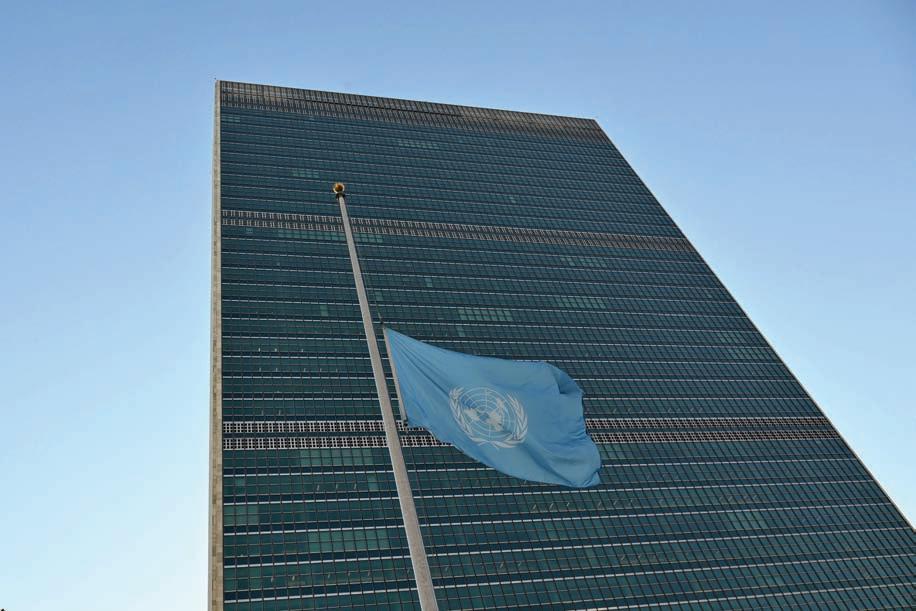
So the West’s appointment of complaisant marionettes can only go so far. U.N. Secretary-General António Guterres picked the widow of rabid pro-Israeli John McCain to head the World Food Program (WFP), a choice that raised eyebrows at the time. As the death toll in Gaza rose to 13,000 and as her WFP food trucks were held at the crossing from Sinai, Cindy McCain was invited to a conference to present the John McCain Prize for Leadership in Public Service to the “People of Israel,” who were represented by an IDF officer. I suspect that she did not think it any way anomalous!
It is apparent that the insulated Beltway crowd have no inkling of the greater universe beyond the American Israel Public Affairs Committee (AIPAC) event horizon. In contrast, faced with mounting casualties among their colleagues and clients, WFP staff mounted a
U.N. correspondent Ian Williams is the author of UNtold: The Real Story of the United Nations in Peace and War (available from Middle East Books and More).
revolt, which clearly both perplexed and worried her. They noted that she could not even be bothered to appear at the one minute’s silence ceremony for the 100 + U.N. staff killed in the Israeli assault, lamely claiming she had been silent on her own, but no one had noticed. Presumably a quick bathroom break.
On the other hand, being a well-qualified and principled appointment almost guarantees opposition as longtime U.N. official Lynn Hastings discovered when the Israelis cancelled her visa in December. The Canadian was the Special Coordinator for the Middle East Peace Process (UNSCO) when she did the unthinkable and suggested there was a connection between Gazans going hungry and Israel stopping supplies coming through. Israel also berated her for skipping the now obligatory ritual of blaming Hamas first before any other comment. Guterres’ spokesman expressed complete confidence in Hastings, but not nearly as much confidence as staff have in Guterres’ eventual compliance with orders.
After all, in October the odious Israel ambassador to the U.N., Gilad Erdan, had stood up in the U.N. and demanded the Secretary General’s dismissal. In diplomatic circles this went beyond shame-
less lies and effectively calling for genocide—it was rude and undiplomatic. But if Prime Minister Binyamin Netanyahu could treat the U.S. with contempt, why should the U.N. expect anything more?
In this context, Netanyahu’s proposal to tap Tony Blair for oversight of the postwar administration of Gaza is the perfect fit. As head of the so-called U.N. Quartet, the ever-pliable popinjay ex-premier provided camouflage and persiflage to obscure the complete futility of the Oslo Accords, thus heading off any serious peace negotiations. The Quartet was designed to implicate, rather than involve, the U.N., to ensure a U.N. mandate for any stitch-up without actually invoking any U.N. resolutions or involving international law.
Ironically, one positive outcome of Blair’s tenure had been the hiring of British Indian Ashish Prashar for the U.N. Quartet who, with his 18-month-old son, was a target of a rant from a woman who threw hot coffee (and her phone) at the two for being brown in a New York playground and—horror!— wearing a keffiyeh. One presumes he was not wearing this “anti-Semitic” scarf when Blair interviewed him. Probably to her surprise, she was arrested for throwing hot coffee at a baby in New York while IDF personnel are lionized for their destructive disassembly of infants in Gaza.
Blair had bypassed U.N. accountability by being paid directly from the U.S. State Department (and not by results) and then accepting contracts from any other hirer of diplomatic mercenaries. That was under Madeleine Albright, and by another turn of synchronicity, her aide in Israel-Palestinian affairs, one Stuart Seldowitz, was also arrested in New York, echoing Albright’s claim that the deaths of thousands of Iraqi children were a “price worth paying” to get at Saddam Hussein.
Seldowitz went one up on the outrage scale, and during a coldly calculated rant at a New York food stand manager he suspected of Hamas sympathies, variously threatened to set the Immigration and Naturalization Service (INS) on the guy and advised the vendor that the Egyptian secret service would rip his father’s fingernails out.
Completing the rant, he calculated on camera that 4,000 kids killed in Gaza by the IDF was “not enough.”
The floods of coordinated bile in the media make Israel supporters think that their KKK/Brownshirt imitations are common currency. They need challenging, not for their intellectual development, but because as George Orwell showed in 1984, if enough people say “IDF= most moral army in the world” and “2+2=5” then it becomes so. As with any faith-based cult, what is needed is deprogramming.
The full horror comes out in that Seldowitz was not just the average brainwashed pro-Israeli schmuck but had also been an adviser to Obama for the IsraelPalestinian peace negotiations. Those of us who observed U.S. Middle East policy over those years are not too surprised, but even we were taken aback at the depths of anti-Palestinian prejudice that he represents.
From all these murky factoids, we can see the outlines of a U.S./Israeli endgame in Gaza, crafted by Joe Biden advisers like Seldowitz, perhaps with expert advice from Jared Kushner. It would be a creative potion of coerced international amnesia about Israeli war crimes, with the U.N. and EU and others invited to bury the dead and plow salt into the ruins of Gaza and finance Israeli resettlement under the guise of humanitarian escape corridors for Gazans. The diplomatic settlement, like the Israeli settlement stockades filled with Brooklyn transplants, will be totally illegal under existing legal principles but will be koshered by vapid U.N. resolutions pushed by the West. You can see where Blair fills the gap.
Relevant but perhaps even more shocking are the reports of U.S. congressional moves to use financial arm-twisting on U.N. member states to accept Gaza refugees, as a “humanitarian gesture,” a charitable Lebensraum creation scheme, or a reverse action replay of “Exodus,” the movie.
Perhaps the next most nauseating thing after seeing genuine pictures of mangled babies from Gaza is hearing Israeli and American “humanitarians” express sympa-
thy for surviving Gazans being displaced by IDF bombing. They want to find them a safe home, in Egypt, Antarctica—anywhere except their former homes in Mandatory Palestine. It is clearly time for Karim Khan, the ICC prosecutor, to be imaginative and announce preemptive arrest warrants for all who collaborate in ethnic cleansing— and indeed for those who created the appalling conditions that provide the excuse.
Khan, quite rightly, issued a warrant for Vladimir Putin after the invasion of Ukraine.
He opened an investigation into war crimes and crimes against humanity in Israel and Gaza but that just seems to have provoked the Israeli leadership into a frenzy to complete the job and bury the evidence. Israel is paying more attention to interring the cars that might show evidence of maceration by Israeli gunships than it does for its child victims.
Khan should announce the indictments of Israeli military and political leadership. (He can throw in Hamas as well but generally they do not fly the globe being lionized by Western cheerleaders for genocide.) December’s conference of state parties to the ICC convention would be a good opportunity to press him on the issue. ■

Send your story ideas, responses to features and copy requests (with $5) to:
Capitol Hill Citizen 1209 National Press Building, Washington, DC 20045
Editor: Russell Mokhiber Phone: (202) 656-7660
Email: editor@capitolhillcitizen.com
Find us on the web at: www.capitolhillcitizen.com (Advertisement)
By John Gee
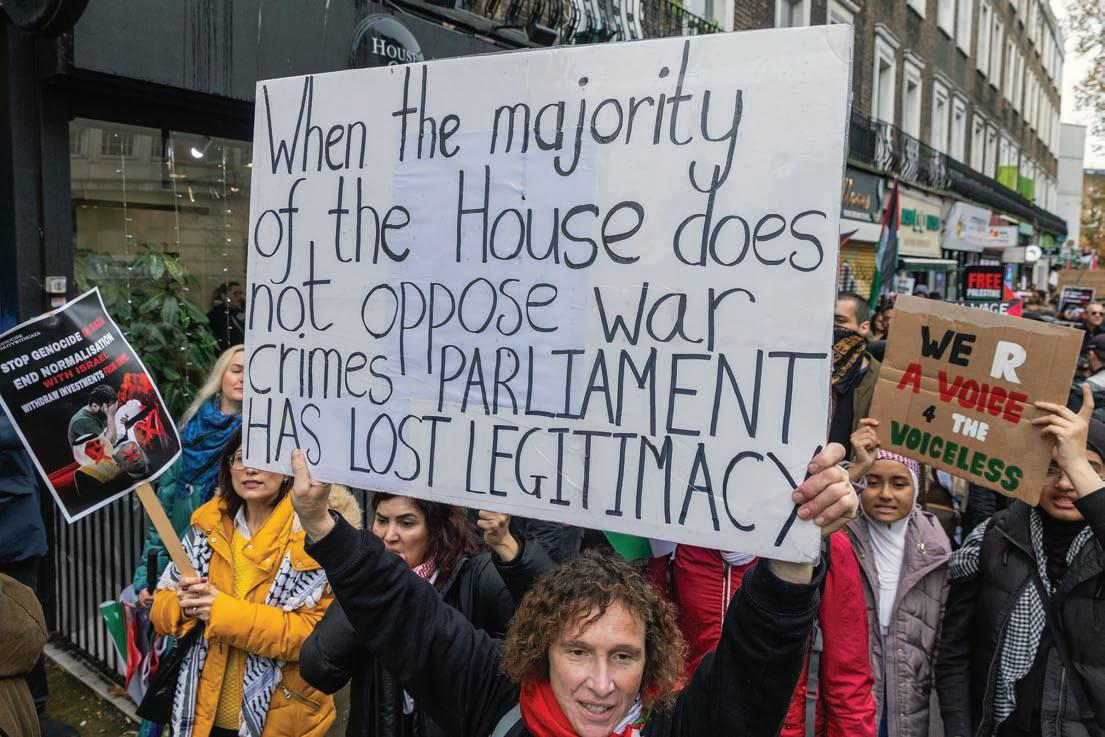
in Gaza on Nov. 18, 2023 in London, United Kingdom. The event was organized by the Palestine Solidarity Campaign as part of a national day of action comprising more than 100 local demonstrations. Keir Starmer has faced considerable criticism for not having called for a ceasefire in Gaza and for his handling of the humanitarian crisis there.
BRITISH PARLIAMENTARIANS condemned Hamas’ killing of Israeli civilians on Oct. 7 and asserted that Israel had the right to act in self-defense when it launched its attacks on the Gaza Strip. Over the following weeks, both Prime Minister Rishi Sunak and Labour leader Keir Starmer voiced concerns over the suffering of Palestinian civilians, but cleaved loyally to the U.S. position of opposing a ceasefire. Starmer was no doubt alarmed to find that there were still people in the Labour Party who were not prepared to follow his lead in backing Israel to the hilt. One shadow minister resigned his post early in the war and some 50 councillors in local government left the Labour Party, including 10 in Oxford, which cost the party control of the city council. As reports of the first res-
John Gee is a free ‐ lance journalist based in Singapore and the author of Unequal Conflict: The Palestinians and Israel.
ignations appeared in October, a “senior Labour source” was quoted as welcoming their departure as “shaking off the fleas.”
Protests calling for an immediate ceasefire and expressing support for the Palestinian people (not Hamas) have taken place in many cities, with the largest in London. The Palestine Solidarity Campaign (PSC) called demonstrations there every Saturday beginning Oct. 14. All were peaceful protests, and yet were vilified from the outset by the right-wing media, which portrayed them as threatening and pro-Hamas. The Labour leadership banned its MPs from taking part and Labour Party banners were conspicuous by their absence due to an earlier ban by the party.
Conservative Home Secretary Suella Braverman was particularly vehement in attacking the marches. After the first protests, she said that displaying the Palestinian flag could be considered to be support for terrorism. She called for the marches (which she labelled “hate
marches”) to be banned, but that is a matter for the police to decide.
As it happened, Armistice Day (Nov. 11), which marks the end of World War I, fell on a Saturday this year. It is preceded for several weeks by the selling of paper poppies by volunteers, the proceeds of which go to support military veterans in need. The anti-Palestinian media and politicians took advantage of this solemn occasion in the British calendar to step up attacks on Palestine solidarity action. The Sun and Daily Mail tabloids claimed that poppy sellers had been intimidated by pro-Palestinian activists: “Where have all the poppies gone?” read The Sun’s Nov. 9 front page, while the Daily Mail reported an attack on an elderly poppy seller. None of this was true, as confirmed by police sources and an exhaustive investigation by an Observer journalist (Jon Ungoed-Thomas, “Poppycock! Police say reports of attacks on sellers are ‘misleading’”) that was published on Nov. 12.
The right-wing press carried articles warning of pro-Palestinian mobs “desecrating” the Cenotaph, site of the main annual Armistice commemoration. It made no difference that PSC had never intended to march past the Cenotaph that day, but was staging a march to the U.S. Embassy from an assembly point over a mile away, along a route agreed with the police: the threat of violence by the marchers was said to warrant the march being banned.
Suella Braverman wrote an inflammatory article in The Times, reiterating her vilification of the pro-ceasefire and pro-Palestinian protesters as “mobs” and “hate marchers” and accusing London’s Metropolitan Police of being too “woke” and of bias against rightwing causes. The Daily Mail endorsed her remarks, and carried a front page blaring “PRAY THEY DON’T
END UP WITH A RIOT AT THE CENOTAPH.” Both Braverman and Rishi Sunak called for the PSC march to be banned, but the police said that there was no legal basis for doing that.
In the event, there was violence at the Cenotaph—by far right counter-protesters who claimed to be there to defend it, many from the football hooligan group, the Democratic Football Lads Alliance and the English Defense League. Before the commemoration began, a group of them, some already the worse for alcohol, attacked a police cordon, throwing bottles and other missiles. Later, they clashed with police again as they attempted to reach the Palestine march. Perhaps 2,000 turned up to the counter-protest, mobilized by Braverman’s words and the hostile media coverage of previous days.
In contrast, 300,000 people (according to police; 800,000, said PSC) took part in the Palestine march, which passed off noisily but peacefully. People of many backgrounds attended, some with children. At the end of the day, the campaign against the march probably encouraged more supporters to turn out and guaranteed it plenty of publicity when it happened. The great majority of the 126 people arrested during the day were from the counter-protest: some already had criminal records for violence and some were in possession of weapons and drugs.
(Advertisement)
Naturally, there were no retractions from the anti-Palestinian gang, but Rishi Sunak was compelled to sack Suella Braverman. For a Conservative to attack the police, moreover in an article that was not agreed to by her colleagues, offended many of them, but she might have survived if her predictions of pro-Palestinian violence had proved justified. They weren’t, and she went, still saying that ways must be found to ban Palestine marches.
On Nov. 15, there was a debate in the House of Commons on a motion introduced by the Scottish National Party (SNP) calling for an immediate ceasefire. Keir Starmer opposed it and called on Labour MPs to vote against it: shadow cabinet members would be sacked if they did not. Nonetheless, 56 Labour MPs defied Starmer and voted with their consciences (and their voters’ support) for the SNP motion. They included 10 shadow cabinet members who resigned their posts or were sacked. Best known was Jess Phillips, a member of Labour Friends of Israel who has a large number of Muslim voters in her constituency, who said that she voted “with my constituents, my head and my heart.”
The SNP motion for a ceasefire was defeated by 293 votes to 125. The Scottish Parliament and the Welsh Assembly had both earlier adopted resolutions calling for an immediate ceasefire. ■

By Diana Safieh
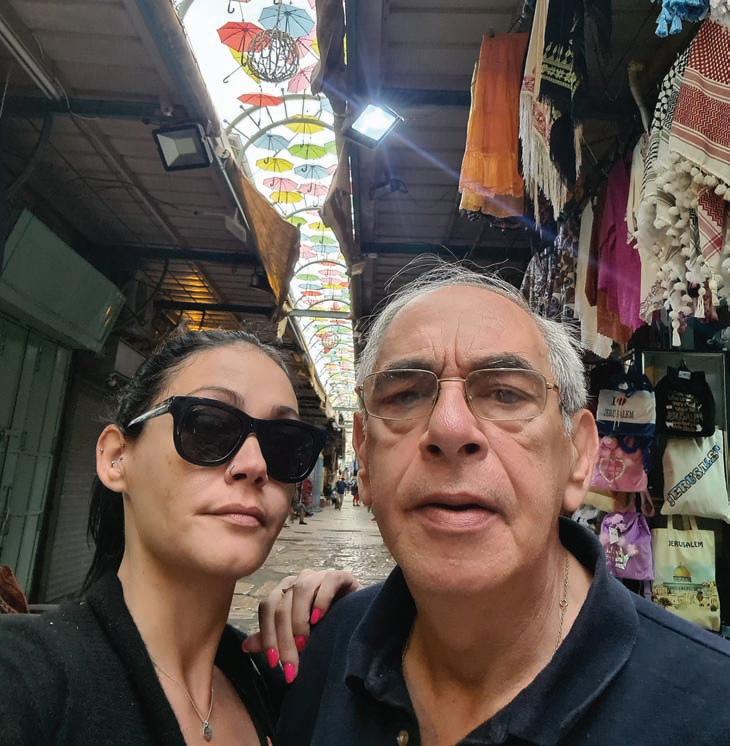
and
MY FATHER, Afif Safieh, and I were going home to Jerusalem together. We hadn’t travelled there together in many years, although individually we were constantly going back and forth, he for his work on the Fatah Revolutionary Council as Deputy Commissioner for International Relations, I for my work with St. John Eye Hospital and both to visit friends and family still living there. (He served as a Palestinian delegate to the Netherlands, the UK, the Vatican and the U.S. and as PLO ambassador to Russia.)
I was excited about seeing Jerusalem through his eyes again, going to places that are meaningful to him. I always enjoyed the
Diana Safieh is a writer and podcaster whose areas of expertise are Palestine, true crime and anything even slightly unusual. She cur‐rently works with St John Eye Hospital and the Balfour Project in the UK. She was recently invested as a member of the Order of St. John for her efforts, just like her father, Ambassador Afif Safieh, and great uncle.
Old.City walk from the Collège-des-Frères where he went to school to Ja’afar where he has been eating knafeh since he was a child. This time, I would have the opportunity to show him the things I love about Jerusalem (trying to find a “cocktail” bar that actually serves alcohol in Beit Hanina and the St. John Muristan Museum in the Old City).
But the universe had other plans for all of us.
Sitting in the lounge at Heathrow Airport at daybreak on Oct. 7, we both started receiving news from various sources that there had been a Hamas incursion into Israel. There wasn’t really any information on the severity, but we already knew some form of disproportionate retaliation was on its way. As it happens, despite the terrible news coming through on our phones, and now the news screens at the airport, the airline decided to take off and fly to Tel Aviv, which would turn out to be one of the last flights from the UK to Israel before all the flights were suspended. And we were on it. What followed was almost two weeks of obsessive news following: severe disappointment in the responses of all countries (except Belgium and Norway), especially the UK (we are looking at you, Rishi and Keir, and judging you harshly), and trying to secure evacuation by our consulate before eventually just evacuating ourselves through Jordan.
Hearing the media back home describe the Hamas incursion as a “surprise” and “unprovoked” was shocking to us, as was the lazy journalism that led to the repetition of false information such as the beheading of 40 Israeli babies. You might not agree with the attack, but to call it unprovoked is to dismiss 75-plus years of occupation. And to allow the Hamas attack to justify a genocide is savage.
While we were there, there was one day we felt safe enough to go to the Old City. Actually, it was our first day, so perhaps we just hadn’t yet adapted to the danger. Because while we were there, the air sirens went off. By this point there were reports of Hamas rockets reaching Jerusalem, but we weren’t sure what to believe after the 40 dead babies fabrication. We had not had training on what to do during an air siren either. You probably shouldn’t do
what we decided to do, though, which was go to the Austrian Hospice rooftop cafe and have apple strudel.
It’s not that we don’t care about our safety, it’s just that Palestinians grow up with a different tolerance to danger. These things seem normal to us. We are desensitized to things that should be shocking and we carry on trying to live a normal life even when it feels like the sky is falling down, in this case literally. And also in our defense, we love a good piece of cake and the Austrian Hospice is where my dad was born.
This was the last proper excursion on our trip. With all the checkpoints between Jerusalem and the rest of the West Bank already closed, and the Old City itself shut some of the days, and with all the fighting in the streets in Jerusalem which was not yet being reported to the rest of the world (for example, settler attacks in Sheikh Jarrah and on Makassed Hospital), we were fairly stuck in our flat, watching from a safe distance what was happening to our brothers and sisters in Gaza.
Then there were the phone calls and texts from friends and family. People I hadn’t spoken to in years were messaging to say they were thinking of me, most not even realizing I was in Jerusalem at the time. It was touching and heartwarming, as were the demonstrations of support back home and around the world, at the time when people in the media and government were debating whether universal international law even applied to Palestinians.
Reassuring these friends reminded me of going through a breakup or an illness, when you spend more energy consoling your loved ones that you are doing OK (whether you are or not) than worrying about yourself. Also, we felt like total frauds. Sure, it was a bit spicy in Jerusalem, and we were anxious and nervous and having to take precautions I don’t normally have to think about living in the Royal Borough of Richmond, but we weren’t suffering like Gaza was suffering. We didn’t feel worthy of this concern and I felt guilty about the worry I was causing.
Everyone back in the UK asked when we were coming back. We didn’t know. And how to explain to people that we WANTED to be in Palestine during this time. We didn’t feel in much danger. And the statements coming out of parliament in the UK were making us feel unwelcome there. And thus both the Tories and Labour completely ostracized Palestinian, Arab and Muslim citizens and residents, as well as any others who have any sense of decency. We wanted to be with our people. It felt right to us. We never discussed this but I know my dad felt the same.
But the reports of the casualties kept coming in. Not just the numbers, but the actual family names, whole extended families wiped out. What happens to a people when 900 of them are killed in one hit? It means everyone you know has lost someone they know. Every single person is in
mourning. Everyone is trying to contact all their loved ones to check in all of the time, which basically means checking if they are still alive. The whole of Palestine is a giant funeral, while the rest of the world looks on, says nothing significant in our defense and everything in support of Israel. No real talk of proportionate responses, international humanitarian law or genocide. If we didn’t know then what this was, we know now that nearly 20,000 Gazans have been killed and 85 percent have been displaced, according to UNRWA.
My father and I didn't have the opportunity to see Jerusalem through each other’s eyes. We unfortunately saw Palestinians through the eyes of the rest of the world, and that was painful. Clearly our lives matter less. Despite being an atheist, I can’t help agreeing with my father that we are seen as “children of a lesser God.” ■
(Advertisement)

By Ron Forthofer
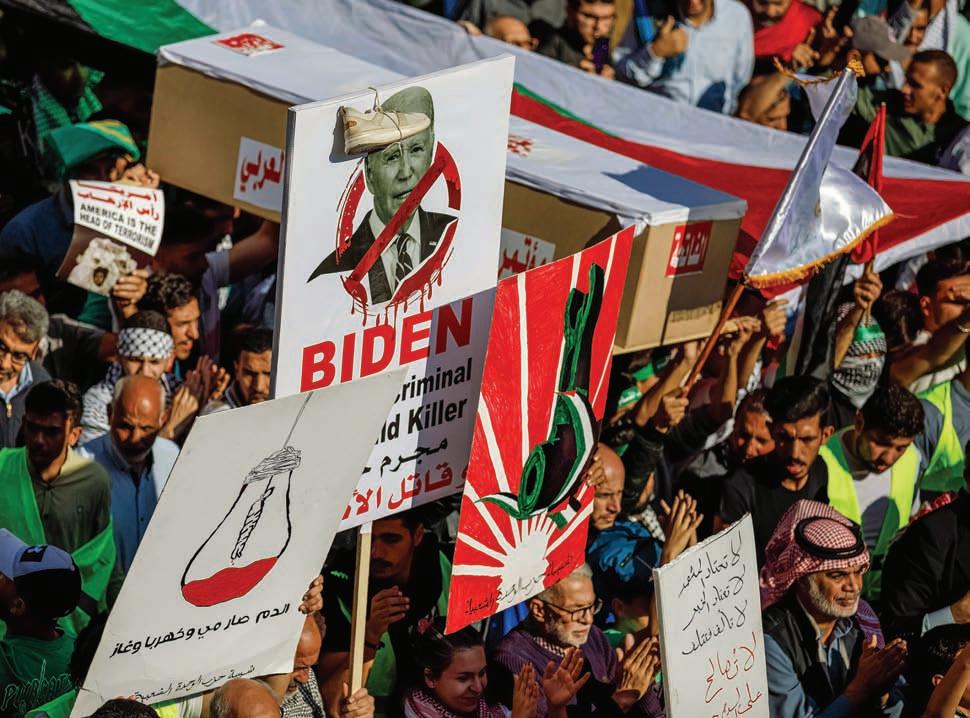
MUCH OF THE WORLD community showed both outrage over the horrendous Hamas attack on Oct. 7 and strong support for Israel during its suffering over the loss of 1,200 lives and the capture of about 240 Israeli hostages. However, when Israel began its indiscriminate bombing in Gaza, the world looked on in horror at its collective punishment of an essentially defenseless population. People, particularly those in the Global South who know too well the devastating and deadly effects of colonial occupation, are appalled by the horrific impact of Israel’s disproportionate and wholesale bombing, its ground invasion and the total siege it has imposed on Gaza.
Ron Forthofer, Ph.D., is a retired professor of biostatistics and a volunteer for peace and social justice organizations. Forthofer, who was a Green Party candidate for governor and Congress, has written articles published in numerous newspapers and websites. He went on two delegations to Palestine with the Christian Peacemaker Teams.
As of Nov. 27, the known Palestinian death toll was already over 15,000, including over 6,000 children. The scenes of devastation caused by Israel hitting hospitals, ambulances, schools including U.N. schools, apartment buildings and other infrastructure are shocking. In addition, the Global South understands the cruelty of Israel’s total siege of Gaza. Israel’s military campaign along with the total blockade of water, food, medicine, fuel and electric power to Gaza have turned an already nearly unlivable situation into what James Elder, a UNICEF spokesperson, described as “a graveyard for thousands of children” and “a living hell for everyone else.” The respected international charity Oxfam has stated “Israel is using starvation as a ‘weapon of war’ against Palestinian civilians living in Gaza.”
The relatively few trucks allowed to enter Gaza can supply only a tiny fraction of the aid that is needed. Israel’s siege will greatly increase the long-term Gazan death toll as its effects, especially the lack of shelter, are felt by an already weakened population. More than 1.5 million Palestinians have already suffered a forced displacement that is being called a second Nakba. On Nov. 16, Israel dropped leaflets warning people to leave some areas to the east of Khan Younis in the southern part of the Gaza Strip. People fleeing from there will add to those already displaced. What will happen to these displaced Palestinians this winter, even if the savage Israeli attack ends?
According to an article published on Nov. 9 in The Guardian, Prime Minister Binyamin Netanyahu rejected several proposals involving a short ceasefire in exchange for the release of some hostages. Instead, the vicious (and futile) campaign to remove
Hamas continued until the humanitarian pause on Nov. 24. Evidently Netanyahu doesn’t understand that Palestinians will continue to resist Israel’s illegal and cruel occupation of Palestinian land even if Hamas does not exist.
The U.S. has made no effort to rein in Israel’s genocidal behavior. Since Oct. 7, the U.S., the key nation with leverage over Israel, has said that there are no red lines for Israel. Incredibly, the U.S. even vetoed four U.N. Security Council resolutions calling for a humanitarian pause. Finally, on Nov. 15, a binding resolution passed, calling for “urgent and extended humanitarian pauses and corridors throughout the Gaza Strip” to allow for aid delivery and medical evacuations. Russia, the U.S. and the UK abstained.
On Nov. 14, Bloomberg reported that the U.S. has quietly provided Israel with additional weapons including, for example, about 2,000 Hellfire laser guided missiles for Apache helicopters, 57,000 155 mm high explosive artillery shells, Iron Dome air defense missiles, smart bombs and night vision equipment. Through its political support and supply of weapons, the U.S. is complicit in these Israeli war crimes. The U.S. position is appalling, but not surprising, given its own long history of genocidal war crimes and colonialism.
President Biden, Vice President Harris, Secretary of State Blinken, Secretary of Defense Austin and National Security Adviser Jake Sullivan are complicit, as are the overwhelming majority of Congress. Only 17 representatives out of the 435 members of the House cosponsored H.Res. 786, presented by Rep. Cori Bush (D-MO) on Oct. 16 calling for an immediate de-escalation and ceasefire in Israel and occupied Palestine. Only two U.S. senators have dared to call for a ceasefire, Dick Durbin (D-IL) whose Nov. 2 call was contingent on the release of all the hostages held in Gaza, and Sen. Jeff Merkley (D-OR) who called for an unconditional ceasefire on Nov. 20. The only Palestinian American member of Congress, Rep. Rashida Tlaib (D-MI), was censured by the House for her comments about Israel’s attacks on Gaza, accusing
her (predictably) of anti-Semitism. More than 20 Democrats joined Republicans to vote for censure, a measure one step away from expulsion.
In contrast, the first legislation under the new House speaker was a resolution passed on Oct. 25 to support Israel and supply additional security assistance, which 412 members approved and only 10 members opposed. What does this say about members of Congress? Their cowardly silence about—or active support of—Israel’s slaughter of Palestinians shows their lack of humanity and unworthiness to be in Congress. Congress is completely out of step with the U.S. public, as the results of the Nov. 13/14 Reuters/Ipsos poll showed 68 percent of the U.S. public in favor of a ceasefire and negotiations.
Western mainstream media who provide political cover for Israel are also complicit with Israel’s genocidal campaign. According to the Committee to Protect Journalists (CPJ), as of Nov. 27 at least 57 journalists and media workers have been killed since Oct. 7. Of these, 50 were Palestinian journalists or media professionals. More than 750 journalists signed a letter on Nov. 9 critical of the mainstream Western media coverage, pointing out Israel’s targeting of journalists as well as coverage that is pro-Israel. Signatures have more than doubled on the letter which points out both Israel’s targeting of journalists as well as Western news-
rooms which are “accountable for dehumanizing rhetoric that has served to justify ethnic cleansing of Palestinians.”
Media workers led a protest outside The New York Times on Nov. 9, scattering a mock publication, The New York War Crimes, and charged the media with “complicity in laundering genocide.” The extent of this biased coverage is slowly decreasing in the Times, the Washington Post and other corporate media as the evil of Israeli crimes is harder to deny. On Nov. 16, the Los Angeles Times became the first major U.S. paper to call for a ceasefire.
In addition to the huge protests in the U.S. and around the world against the genocide, legal action has been initiated. On Nov. 13 the Center for Constitutional Rights filed suit in U.S. federal court against the president, secretary of state and secretary of defense on behalf of two Palestinian organizations and eight Palestinians, some in the U.S. and some in Palestine, to challenge the U.S. government’s aiding and abetting of genocide and demand that it work to prevent genocide and comply with its legal obligations under international law.
The Biden administration and Congress have clearly shown the hypocrisy of U.S. claims of support for human rights and a rules-based system. Under an unbiased International Criminal Court, Israeli and U.S. leaders would join leaders of Hamas in the dock on charges of war crimes. ■
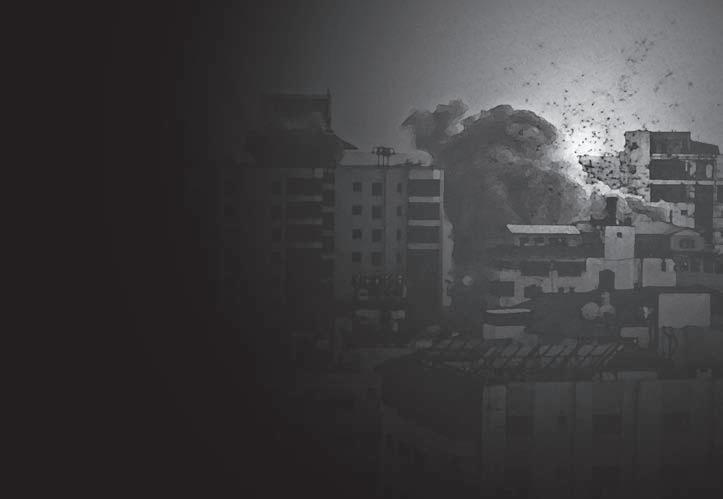










BY
By Jonathan Gorvett
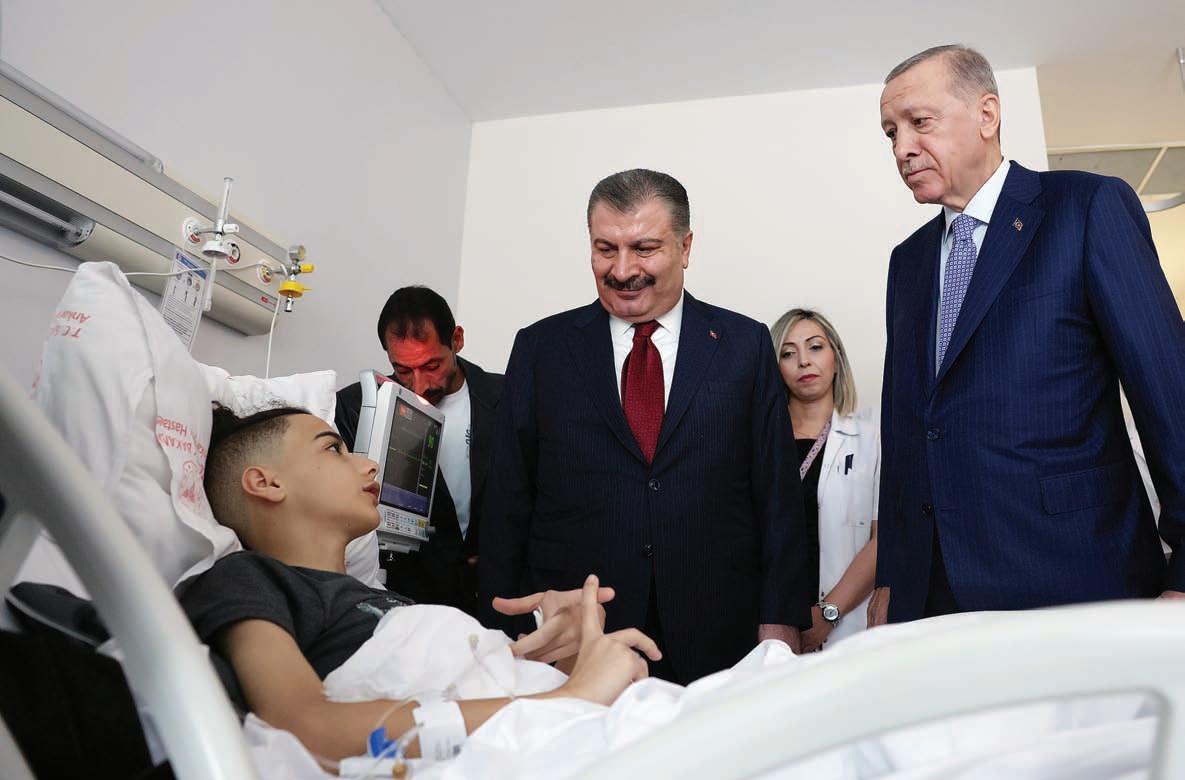
“SOMETIMES,” SAYS MURAT SOMER, professor of political science and international relations at Istanbul’s Ozyegin University, “you can learn more from a defeat than you can from a victory.”
For Türkiye’s embattled opposition, that may be the most hopeful take-away from last May’s electoral debacle, when—despite high expectations and opportune conditions—President Recep Tayyip Erdogan of the Justice and Development Party (AKP) was reelected for an unprecedented third term.
“It was the best chance for an opposition victory since the AKP took power,” Somer adds, “but it didn’t happen.”
What exactly has been learned, however—and how Türkiye’s disparate opposition parties may be taking those lessons onboard— remains contentious.
Now though, with the clock counting down to nationwide local elections in March 2024, getting the answers right is increasingly crucial.
At those ballots, Erdogan’s AKP-led coalition will be making a determined effort to eject the center-left opposition Republican People’s Party (CHP) from its current control of Türkiye’s two most populous and important cities—Istanbul and the capital, Ankara.
Erdogan’s supporters will be helped in their efforts by their control of most of the country’s media, along with many institutions of the state.
This increasingly includes the country’s judiciary, which came under unprecedented attack in November when nine Constitutional Court judges who had voted to release an opposition parliamentarian were subjected to criminal prosecution by another court.
Much is at stake, then, in the next few weeks and months.
In the aftermath of May’s presidential and parliamentary defeats, the united opposition presidential candidate, CHP leader Kemal Kilicdaroglu, was widely blamed for failing to topple Erdogan.
In early November, the CHP party congress replaced him with Ozgur Ozel, a former deputy CHP parliamentary group leader.
“Ozel’s election was mainly a reflection of demands coming from the party’s base,” Berkay Mandiraci, Türkiye analyst for the International Crisis Group, told the Washington Report.
The 49-year-old Ozel is younger than many Turkish party leaders and is also an ally of the popular CHP Istanbul mayor, Ekrem Imamoglu.
Imamoglu, who is running again for mayor in the March 2024 elections, has long been a champion of change within the CHP. Founded by the Turkish Republic’s founder, Mustafa Kemal Ataturk, the CHP is the country’s oldest political party.
“Following its electoral defeat in May,” Mandiraci says, “the party base had become totally demoralized and a sense of apathy had set in. Ozel’s election as party chair could go some way to overturn that trajectory.”
At the same time, the other key Turkish opposition party is the rightwing Iyi (“Good”) Party, led by Meral Aksener.
Originally a split from the pro-Erdogan far-right Nationalist Movement Party (MHP), Iyi joined the opposition coalition to challenge Erdogan back in May but failed to deliver conservative voters.
“The Iyi Party is frankly in a shambles,” Erdem Aydin from political risk consultants RDM told the Washington Report.
Iyi has seen a wave of resignations and defections since the May
2023 election, including top aides and senior party figures.
“They have a real identity crisis now,” says Aydin. “Compared to the MHP, they are a bit more secular and they support the opposition, while the MHP is with the government. Apart from that, there is little difference between them. The electorate therefore have trouble placing them anywhere.”
The other major opposition force is the largely ethnic Kurdish Peoples’ Equality and Democracy Party (HEDEP). Previously called the Peoples’ Democratic Party (HDP), the party was forced to rebrand by a pending court case likely to ban the HDP for alleged links to the illegal Kurdish Workers’ Party (PKK).
HEDEP now faces a major political dilemma, however. While it continually wins local elections in the largely Kurdish southeast of the country, in 2019 Erdogan’s government banned many HDP mayors and replaced them with state administrators. The same thing may well happen after the March 2024 local elections.
“HEDEP doesn’t want this—it’s fed up with not being able to run its own municipalities,” adds Aydin. “So the logical step
might be to come to some kind of understanding with the government, a rapprochement, given how the Turkish opposition hasn’t been getting anywhere.”
A battle for ethnic Kurdish hearts and minds may therefore be one more obstacle for the Turkish opposition to overcome before March 2024.
Yet for some, there is a deeper problem to face, too—something that cannot be fixed just by changing leaders or tweaking the old manifesto.
“In this age of anxiety around the world, there are two broad alternatives,” says Somer. “First, populist, authoritarian parties represented by strong, charismatic personalities like Erdogan, telling people to trust them and delegate everything to them. Then, there are the people fighting against that. But if those people don’t have any new ideas, they end up defending the institutions and solutions that are in crisis—liberal democracy, free speech and the free market. Changing the leader doesn’t change this basic problem.”
Türkiye’s opposition is not the only group facing that dilemma. ■


Speaking to Palestine Deep Dive on Oct. 19, Raz Segal, an Israeli historian and associate professor of Holocaust and genocide studies at Stockton University in New Jersey, said it is accurate to describe what Israel is doing in Gaza as a genocide. “Without a doubt in my view,” he said, noting Israel’s relentless bombing campaign, use of the deadly white phosphorus chemical agent and extremely limited supply of fuel, food, water and medicine to Gaza’s more than two million residents.
The United Nations defines genocide as “a crime committed with the intent to destroy a national, ethnic, racial or religious group, in whole or in part.” Segal noted that since the latest Gaza war began on Oct. 7, numerous Israeli officials have made clear their “intent to destroy” Gaza. “We’re seeing it now across the board in Israeli politics, society and culture,” he said. “Anyone who follows Hebrew language sources sees it everywhere: annihilatory, explicit, unashamed language. When you take this special intent together with the kinds of violence that we’re seeing…these bombings are genocidal killings.”
Segal said a growing number of his peers agree that Israel is acting with genocidal intent in Gaza. “We see a clear shift today among scholars in Holocaust and genocide studies,” he noted. “I can’t say it’s very significant yet in terms of total numbers, but we have a statement from more than 800 scholars of international law, of Holocaust and genocide studies, of conflict studies about the unfolding Israeli genocidal violence in Gaza today.” Signatories include “some big names in Holocaust and genocide scholars,” including Jewish scholars, he added.
The scholars’ statement cites several genocidal remarks by Israeli officials, including Defense Minister Yoav Gallant’s declaration that “Gaza won’t return to what it was before—we will eliminate everything.” Israeli army spokesperson Daniel
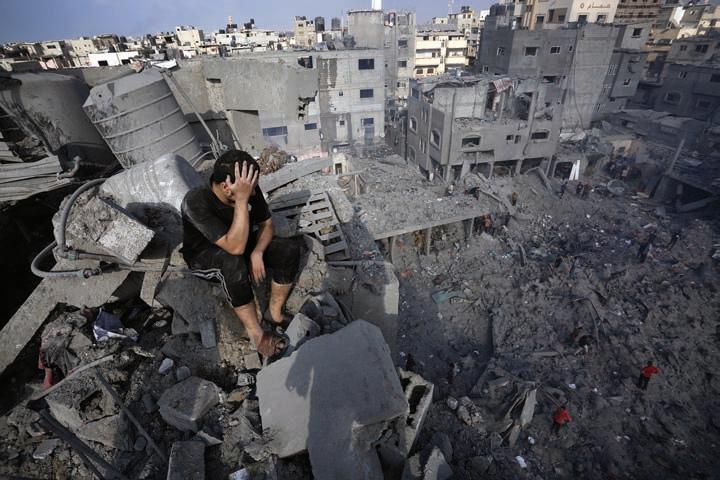
Hagari is quoted as saying, “The emphasis [in Gaza] is on damage and not on accuracy.” Israeli President Isaac Herzog is cited as referring to all Gazans as legitimate targets: “It is an entire nation out there that is responsible. It is not true this rhetoric about civilians not being aware, not involved. It’s absolutely not true.”
Israeli leaders, Segal noted, have compared Hamas to ISIS and Nazis. However, he believes such rhetoric is part of a misleading effort to depict Israel as a helpless victim of violence, just like the Yazidis targeted by ISIS and Jews systematically targeted by Nazis. These ahistorical statements are also likely a deliberate attempt to legitimize Israeli violence and deflect attention from its own violent history. “Israel, for decades, has used the Holocaust to deny, distort, justify and rationalize mass violence against Palestinians,” he noted. “Israeli violence against Palestinians is a structural, systemic issue that has existed since the creation of the Israeli state.”
Segal made it clear that “Hamas’ attack was an absolute war crime, without a doubt.” However, he said the deadly Oct. 7 assault on Israeli civilians must be assessed in the context of Israeli ethnic cleansing and efforts to “create a Jewish state without Palestinians.” Nonetheless, “This does not in any way justify this horrendous crime, this mass murder of more
than a thousand Israelis,” he said. Dale Sprusansky
During a webinar hosted by the Foundation for Middle East Peace and the Middle East Institute on Nov. 3, panelists said Israel has responded to Hamas’ Oct. 7 attack by committing war crimes in Gaza. Israeli officials and outside commentators alike have repeatedly suggested that bombing areas populated by civilians is legitimate and necessary in order to kill members of Hamas and destroy the group’s capabilities. Katherine Gallagher, a senior staff attorney at the Center for Constitutional Rights, said this philosophy violates the principle of distinction under international humanitarian law. “When responding to an attack, a state must distinguish between combatants and civilians,” she said. “Civilians are protected, and they lose that protection only when they are directly participating in hostilities.”
Despite what some have suggested, having voted for Hamas in the 2006 election or expressed sympathy for the group does not make one a combatant, Gallagher clarified. “Your political views are not the basis to be bombed, killed, put under siege, persecuted or denied fundamental rights of movement, of life, of ed-
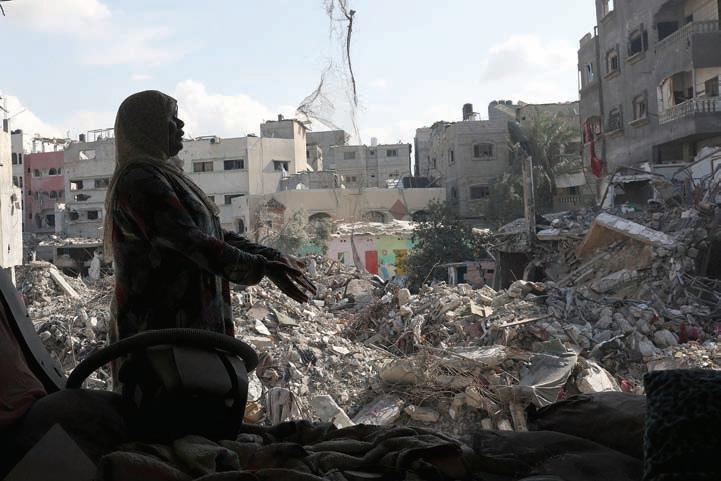
ucation, of family,” she said. (Palestine has not held parliamentary elections since 2006. More than half of Gaza’s population was not yet born when Hamas won that election.)
Jamil Dakwar, a human rights lawyer and adjunct professor at New York University and Hunter College, believes Israel’s actions in Gaza are based on “revenge” and a desire to “restore Israeli might and deterrence capabilities” so that Hamas can never carry out a massive assault against Israel again. To these ends, the country has attacked civilian infrastructure such as hospitals and schools, killed more than 16,000 civilians and displaced over 80 percent of Gaza’s 2.3 million people—actions he believes amount to illegal collective punishment.
Since Oct. 7, Israel has carried out an “attack that is directed against the civilian population in Gaza,” Gallagher said. “When you have indiscriminate attacks and send massive bombs that cannot distinguish between a civilian object or a military object, that is an unlawful use of force.” This, she said, means Israel is guilty of war crimes.
Elected officials in both Israel and the U.S. constantly state that Israel has the right to defend itself against Palestinian violence, however international law does not give a country carrying out a belliger-
ent occupation the right to attack the people it is occupying. “When a state is in the position of occupier, the rules [typically permitting] self-defense under Article 51 of the U.N. Charter are different,” Gallagher noted. “They do not apply, because it is not a foreign state that has attacked Israel, it is an occupied people.” Instead of the right to attack Gaza, Israel actually has a duty under international law to protect the people of the land it occupies.
As for Hamas, Dakwar said they are permitted by international law to engage in resistance, but must do so within the bounds of humanitarian law. “The right to resist foreign occupation and engage in all forms of resistance has to be within the confines of international law, which particularly emphasizes the protection of civilians, not targeting non-combatants, and other prohibitions, including not taking civilian hostages,” he said. All panelists agreed Hamas grossly violated these principles on Oct. 7 and is guilty of war crimes.
Dale Sprusansky
Yemen, which is in its ninth year of civil war, recently experienced a bit of good news. Since the war began in 2014, the
45-year-old supertanker Safer, a 1,150foot vessel used as a floating storage and offloading facility, had been anchored along Yemen’s Red Sea coast, north of the port of Al-Hudaydah. Deteriorating significantly due to lack of maintenance and upkeep, it posed the probability of exploding, sinking, leaking or breaking apart. The result would have been a major oil spill four times that of the Exxon Valdez in 1989.
A disaster of that scale would have resulted in untold ecological, economic and humanitarian damage across the Red Sea coastline. With a total capacity of 3.1 million barrels, the ship’s remaining cargo of 1.1 million barrels (46.2 million gallons) of oil was successfully offloaded in August.
On Oct. 24, United States Institute of Peace president and CEO Lise Grande and U.S. special envoy to Yemen Timothy Lenderking discussed how innovative diplomacy—including dialogue between enemies, the work of multiple international stakeholders and tens of thousands of environmentalists who crowdsourced enough funds to pay for this operation— resolved the Safer dilemma.
“The conflict parties themselves being willing to talk to each other and problem solve” was essential, Lenderking said. The Houthis and the Saudi Arabia-backed coalition have held to a ceasefire since April 2022, even though it formally expired in October of that year. “The commitment of the parties…has been significant enough to want to give diplomacy a chance,” he said. “There is no coincidence that in the midst of that period of confidence-building that the Safer [issue] started to [get resolved]. And here was an issue that had stymied the international community for eight years.”
Emphasizing the importance of confidence-building measures in diplomacy, Lenderking cited the re-opening of the Sana’a airport and prisoner exchanges as other positive developments.
Despite the Israel-Hamas war that began on Oct. 7—which the Houthis have entered by firing missiles and drones toward southern Israel—Lenderking was relieved that U.S. Secretary of State Antony Blinken has insisted that “we have
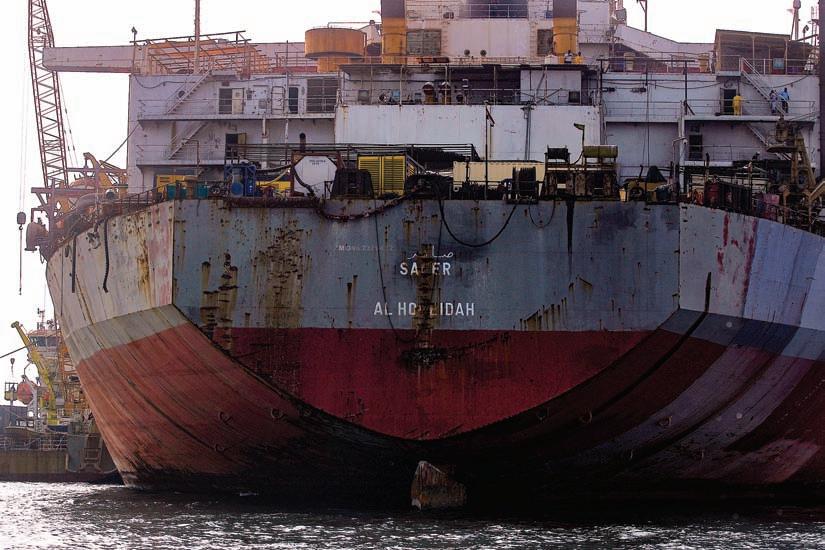
to keep the Yemen diplomacy going.”
“If you look at the progress that has been made over the last year and a half, there is an opportunity to end this conflict and we want to do our best as the United States to protect the gains that have been made,” Lenderking said. “I think Yemenis may sense that there is [now] a moment when this could be the end of the conflict. There is a huge amount of work that needs to be done, but we want to make sure that the Yemen effort can go forward.”
“Our hope is to work with Yemen so we can get it on a more stable path, so we can talk about a durable resolution of the conflict,” he added. “But this is their country, and they have to be the ones to make the key decisions. It has to be a YemeniYemeni process to be durable and sustainable.” Elaine Pasquini
On Oct. 23, Georgetown University’s Center for Contemporary Arab Studies, its Prince Alwaleed bin Talal Center for Muslim-Christian Understanding and New Lines Magazine hosted a conversation with Syrian dissident and intellectual
Yassin al-Haj Saleh to discuss his perspectives on the 2011 Syrian revolution. Examining the history of political life in Syria since the 1963 Ba’ath coup d’état,
Saleh recounted how independent political organizations were “violently dismantled” and “Syrian society at large was beheaded politically” so that the regime was the only viable political actor. The government accomplished this, he continued, through “politicide and genocidal measures.” Politicide, for Saleh, means killing people for political reasons or “murdering people politically, not necessarily physically.” The nature of the Syrian state— under both President Bashar al-Assad and his predecessor and father, Hafez alAssad—thus goes beyond authoritarianism to a “very atrocious and destructive form of tyranny whose main pillars are torture and massacres,” he argued.
Saleh explained that like the other Arab Spring revolutions the Syrian revolution targeted “the mode of practicing power— normally characterized by brutality.” The 2011 revolution shifted calls for freedom of speech and assembly from “elitist circles” to “wider popular circles, and from private to public spaces,” Saleh said, adding that “this collective desire to own politics, to actualize citizenship” was met with state violence from the very begin-
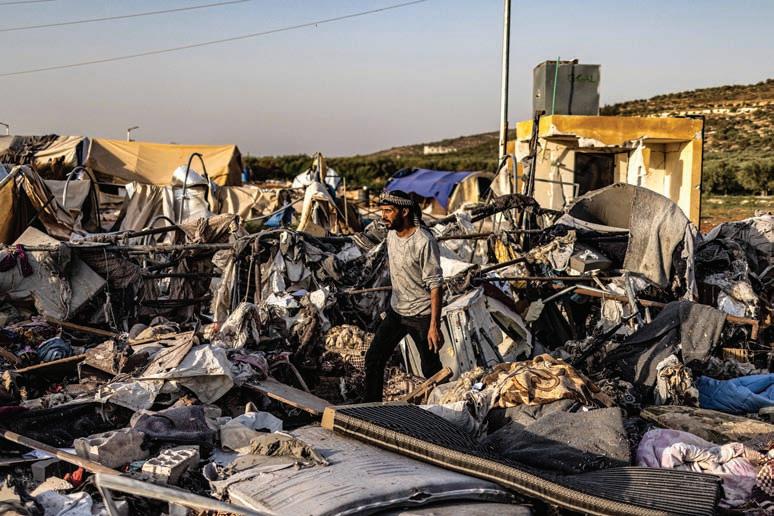
A man inspects the destruction caused by a Russian airstrike targeting a refugee camp in Syria’s opposition‐held Idlib province, on Oct. 24, 2023. Since the beginning of October, Russian and Syrian government forces have carried out a devastating wave of strikes in northwestern Syria, in what the U.N. says is “the largest escalation of hostilities in Syria in four years.” Over 70 people, more than a third of them children, were killed in October and November. Another 349 people were injured, and more than 120,000 individuals are now newly displaced due to the violence.
ning. The whole country, he lamented, became a “factory of death” and the government’s war on its citizens “would trigger dynamics of radicalization, militarization and sectarianization.”
Charting the timeline of the war in Syria, he highlighted three distinct stages. The first stage was a “Syrian versus Syrian struggle” that began peacefully but became armed. The second stage brought sectarianization, with the presence of armed non-state groups. This stage “was sort of a regional Sunni-Shi’i war that was very catastrophic for the liberatory aims of our struggle,” he lamented. The third stage was the internationalization of the conflict, in which regional and global powers entered the fray. This resulted in “sidelining Syrians from their political fate,” in addition to mass death and displacement.
In Saleh’s opinion, the presence of so many regional and global powers—as well as non-state actors—in Syria calls for rethinking political terms such as colonialism and imperialism. He argued that it is not only Western powers who practice these means of exploitation in the region, as countries such as Iran and Russia and groups like ISIS are also guilty of these offenses.
Another tragedy of Syria is what Saleh considers the “Syrianization” of the world. In 2011, he said, Syrians were striving to reach international standards of political life. Now, with democracy under pressure globally and governments increasingly practicing exclusionary politics based on race, ethnicity and religion, “the world has become like Syria instead of Syria becoming a bit closer to the world,” he said. “Democracy is in crisis around the world, and [Syria] will not move forward while everybody else is moving backward.”
with different rhythms, with different fronts, with different tools,” he said about the interconnectedness between the quest for freedom in both Syria and Palestine.
Alex Shanahan
Washington DC’s Quincy Institute (QI) hosted a virtual program on Sept. 27 to discuss the role of venture capital and private equity in fueling the militaryindustrial complex. While the relationship between defense contractors and the Pentagon has flourished since WWII, the proliferation of private capital and tech
the U.S. does business so that defense tech startups have easier access to the military-industrial complex,” she explained. “They’re essentially lowering the barriers to entry.”
Venture capital steers startups toward technologies with military applications, often abandoning civilian research for more stable funding in defense. Examples include LEONID, which lends money to new tech firms based on secured Department of Defense invoices for future projects. According to Marshall, the allure of venture capital to the Pentagon lies in the cost-cutting innovation promised by their “startup ethos,” which is sorely lacking at traditional contractors such as Lockheed Martin, Northrop Grumman and Raytheon.
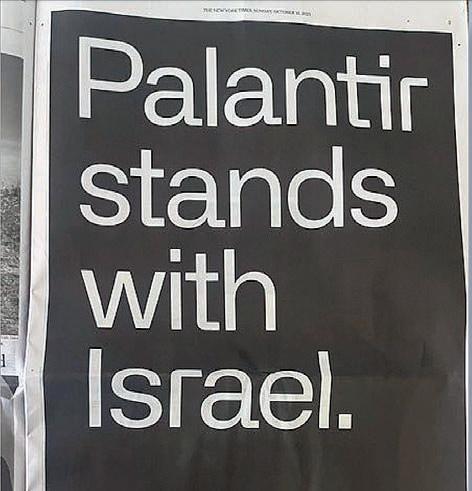
start-ups in the weapons industry is a far more recent development.
QI senior research fellow William Hartung moderated the panel, which included Shana Marshall, associate director of the Institute for Middle East Studies at George Washington University; Edward Ongweso Jr., finance editor at Logic(s) magazine; and Jonathan Guyer, senior foreign policy writer at Vox.
Guyer raised concerns over the lack of safeguards preventing the sale of weapons and spyware to countries with horrific human rights records. “What’s Israel doing with these technologies? How are they affecting Palestinians in the context of daily surveillance under occupation?” The revolving door between government and lucrative consultancies poses further ethical issues, with Guyer citing Secretary of Defense Lloyd Austin’s former position at Raytheon, Secretary of State Antony Blinken’s co-founding of WestExec Advisors, and both men’s former membership on the board of Pine Island Capital Partners.
Saleh also described the “Syrianization” of Palestine, where Israel feels emboldened to attack hospitals and civilian infrastructure in Gaza because the world was silent about such destruction in Syria. “In many ways, we have the same struggle
Marshall outlined how private equity firms use surplus capital to fund defense tech startups and access Pentagon contracts traditionally reserved for major corporations. “You have financial actors who are attempting to reform the way that
The substantial investments provided to private equity firms by the Arab Gulf states pose a formidable challenge to preventing the proliferation of military technology. “Saudi financing is so embedded and necessary to the production of continued U.S. military technologies,” Marshall noted. “Limiting technology exports to places like Saudi Arabia, the UAE, China and Israel would be basically impossible because that’s where the money is. These large state-owned investment funds from the Gulf have been pouring money into Silicon Valley for decades. So, the idea that we could develop those technologies
using their money and then deny them the use of those technologies is probably a pipe dream.”
Ongweso Jr. emphasized that on the domestic front, private finance often piggybacks behind perceived national interests. “Venture capital will take advantage of almost any opportunity in front of it,” he noted. The emergence of “techno-nationalism” in startups like Anduril and Palantir indicates a shift toward overt involvement in lethal technologies, such as border militarization and improving drone capabilities. This thinly veiled profit-seeking must be addressed, he implored. “How do you get financiers out? That is a part of the puzzle of how to ensure that we can stop wars and conflicts from happening.”
Despite the Pentagon’s long-standing enthrallment with cutting-edge technology, recent U.S. military endeavors have fallen way short of expectations. “The U.S. couldn’t win a war in Iraq or Afghanistan against poorly armed adversaries, given all the tech in the world,” Hartung said. “The idea of using this strategy to deal with China rather than diplomacy, economics, or sort of a more balanced approach, I think is a recipe for disaster.”
Jack McGrath
How does “propaganda” work? How do we recognize it? How can we neutralize it?
These questions were discussed at the Nov. 19 online film salon hosted by Voices From the Holy Land. “Media Has a Palestine Problem” was the topic, the audience having previously viewed news clips from Al Jazeera and the documentary “Occupation of the American Mind: Israel’s Public Relations War in the United States.”
“The most effective propaganda creates a narrative or a bias in your mind, and especially one that you’re not even conscious of,” said Alex McDonald, author of When They Speak Israel: A Guide to Clarity in Conversations About Israel. “The most powerful narrative is one that we create ourselves.”
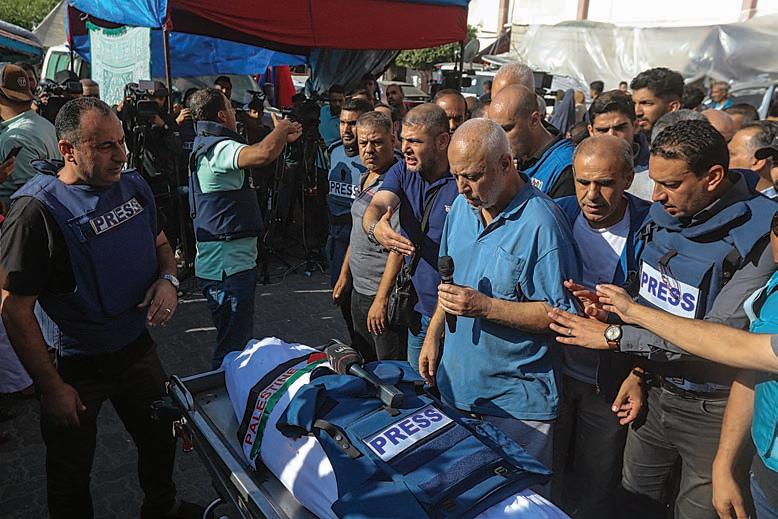
Colleagues gather to remember Palestine TV correspondent Mohammad Abu Hattab, on Nov. 3, 2023. The journalist, along with 11 members of his family, was killed in an Israeli airstrike on his home in the southern Gaza Strip earlier in the day. More than 50 journal‐ists have been killed in Gaza since Oct. 7, 2023.
McDonald continued, “When President Biden says, ‘Hamas attacked—unprovoked,’ that creates a narrative that… Palestinians are illogical, they’re animals.” Such reporting leads consumers to ignore context and history as they fill in the gaps to make sense of things, he noted.
Thomas Suarez, author of Palestine Hijacked: How Zionism Forged an Apartheid State from River to Sea, offered an “elementary scientific test” for detecting propaganda, or biased reporting: take any situation and reverse the identities of the actors. As an example, he shared what the media would say if the roles were reversed, and Zionism were an Islamic ideology:
A cult of racial nationalist Arabs, namely Muslims, living in Europe and Russia, decreed that Allah has given them Palestine, a land inhabited principally by European Jews. And over the course of the century...the Arabs terrorized the Jews because they’re Jews, depopulated several hundred Jewish villages because they’re Jewish...and now keep millions in camps because they’re Jews, terrorizing and bombing them at will, and keeping at any one time several thousand Jewish hostages kidnapped from their homes, in-
cluding hundreds of Jewish children.
Dale Sprusansky, managing editor of the Washington Report on Middle East Affairs, spoke about the pressures many journalists feel to self-censor when writing about Israel-Palestine. “When you talk to people who have worked inside newsrooms at major U.S. and other Western outlets, and even those who have reported on the ground from Palestine or within Israel itself, you find there’s an extraordinary level of pressure on them,” he noted. “Young journalists quickly learn that certain stories are just not worth reporting on because it will cause so much drama. They’ll be called anti-Semites, their careers will be threatened. They don’t want to touch the subject.”
Moderator Katie Halper pointed out how “Zionists have weaponized identity politics,” but there are ways to fight back. For example, she created “The Katie Halper Show” after being fired from The Hill TV for airing a commentary in which she supported Rep. Rashida Tlaib’s (D-MI) characterization of Israel as an apartheid state. “I find that one of the silver linings of this current moment is how organizations like Jewish Voice for Peace and If Not Now are at the forefront of the struggle [for the
human rights of Palestinians],” said Halper. “It’s so much harder now to pretend that there’s a monolithic Jewish voice that is supportive of Israel.”
Halper brought up the problem of negation and erasure by the media. A topic that’s “left out of the narrative, an omission, which is extremely propagandistic, is how non-violent resistance by Palestinians is responded to with violence,” she said. “The idea that if only Palestinians were responding non-violently, if only they had a Mahatma Gandhi, if only they had a Nelson Mandela, then the Israelis would not be killing them. I think it’s really important to remind people: look at what happens when there is non-violent resistance. Look at how Israel works to make BDS— the Boycott, Divestment and Sanctions movement—illegal. Israel itself is doing everything it can to make non-violent resistance impossible, including, of course, killing non-violent resistors.”
Halper pointed to the non-coverage of the 2018-2019 Great March of Return, when young Gazans gathered at the separation barrier with Israel to assert their right to return to the villages from which their grandparents had been expelled in 1948. At the protests, Israeli snipers “picked off children, people with disabilities, journalists, medics, paramedics,” noted Halper. Indeed, the U.N. reports that Israeli snipers, firing from the other side of the separation fence, killed 214 Palestinians and injured 36,100 with metal bullets, rubber-coated bullets and tear gas canisters.
McDonald added, “What I learned from going to Palestine is that everybody who stays there is a non-violent resister. The fact that so many just stay in place and live with the indignities, the suffering, and the economic and other pressures that they have—even the death of family members. To me this is just an amazing sense of non-violent resistance.” Maybe the media should report about that.
Steven Sellers Lapham
Ceasefire
On Nov. 7, the Florida House of Representatives voted on a resolution supporting a ceasefire between Israel and Hamas. Only two members of the legislature—Reps. Angie Nixon (D-Duval County) and Anna Eskamani (D-Orange County)—voted in favor of the proposal, with 104 members voting in opposition. The vote gained national attention after Rep. Nixon gave a passionate speech rhetorically asking her colleagues how many Palestinians need to die, and Rep. Michelle Salzman (R-Escambia County) shouted “all of them.”
On a Nov. 16 Zoom call organized by Floridians wishing to express their gratitude to the two members for their vote, Rep. Eskamani said Rep. Salzman was not alone in expressing derision toward ceasefire proponents. “Some of the
voted accordingly. “There are many who wanted to [vote in favor of the resolution], but I know they felt pressure from the dialogue on the House floor not to,” she said. Eskamani added that many staffers were also supportive of the bill. “After the vote, many people came up to Rep. Nixon and me, and thanked us and hugged us,” she said.
Rep. Nixon said her own experience of seeing the lives of her Black community devalued prompted her to introduce the resolution. “I did not want to see the same thing happen to my Muslim and Palestinian brothers and sisters,” she said. The representative also noted that other resolutions “only focused on Israeli lives,” which she found troubling.
Despite the accusations hurled against her, Rep. Nixon noted that her resolution
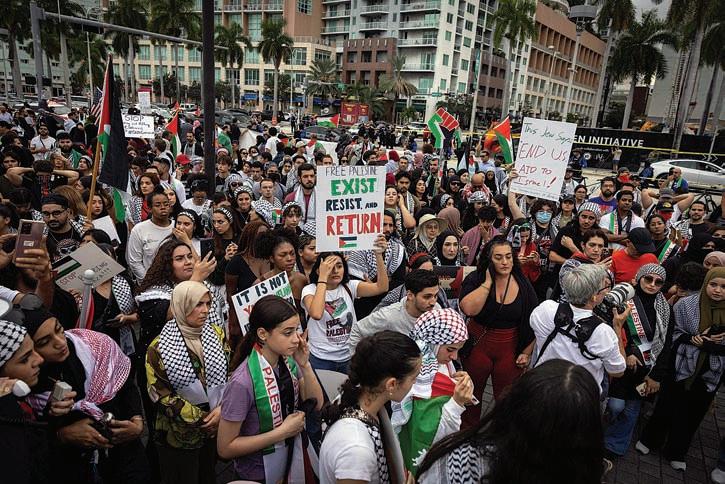
rhetoric on the House floor was very, very ugly,” she recalled, noting that fellow Democrats joined in on the hectoring. “To see many Democrats say offensive things was very frustrating and hurtful,” she said. According to one local news station, “terms like ‘evil,’ ‘anti-Semitic’ and ‘Jew-hater’” were directed toward Reps. Eskamani and Nixon during the debate.
Rep. Eskamani said a good number of her Democratic peers privately expressed support for the resolution, but were afraid of the backlash they would face if they
condemned Hamas’ Oct. 7 attack. The text of the bill stated that the attack was “reminiscent of other instances when Jewish people have been persecuted throughout history.” It also vowed “to combat racism, anti-Semitism, Islamophobia and ethnonationalism in all forms.” The resolution further stated that “all human life is precious, and the targeting of civilians, no matter their religion or ethnicity, is a violation of international humanitarian law.” The bill also took a strong stance in favor of First Amendment rights, opposing
“criminalizing Floridians’ rights to speak out against and protest human rights violations against any group of people.”
Rep. Nixon noted that the ceasefire debate occurred during a special legislative session that was convened by Governor Ron DeSantis and other Republicans purely to vote on pro-Israel bills. Noting the myriad issues facing Florida, including education, housing and healthcare, Rep. Nixon said she is troubled that her state’s leaders prioritized symbolic votes supporting a foreign country over the pressing local needs of her constituents. The special session was “basically the governor trying to score cheap political points” ahead of the Nov. 8 Republican presidential debate, she said.
As just one example of how her colleagues played political games during the session, Rep. Eskamani pointed to a bill that cynically combined opposition to antiSemitism with opposing aid to Gaza. Even though she supported the language condemning anti-Semitism, “I could not vote
for something that said no humanitarian aid should go to Gaza,” she said. “No one should be accused of anti-Semitism for caring about the health and well-being of Palestinians.”
Asked how citizens can best address their local elected officials, Rep. Eskamani encouraged seeking respectful dialogue. In particular, she advised those concerned about a topic to schedule a group meeting with their representative or a member of their staff. “If they refuse to meet with you, then go protest,” she said.
Despite all the acrimony, Rep. Nixon said she has no qualms about introducing the ceasefire resolution. “I know we are on the right side of history, calling for de-escalation, a ceasefire and the release of hostages,” she said.—Dale Sprusansky
Less than 24 hours before Palestinian American Rep. Rashida Tlaib (D-MI) was
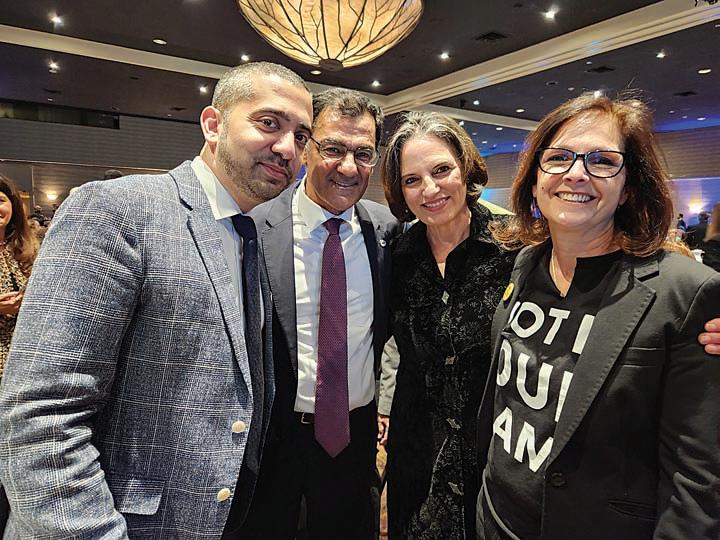
(L‐r) Journalist Mehdi Hasan, Muslim Public Affairs Council (MPAC) president Salam Al‐Marayati, KinderUSA chairperson Dr. Laila Al‐Marayati and Estee Chandler of Jewish Voice for Peace at MPAC’s 30th annual convention, held at the Westin Bonaventure Hotel in Los Angeles, CA on Nov. 11, 2023. Rep. Barbara Lee (D‐CA) told the gathering that she en‐dorses a ceasefire in Gaza. “I take no pleasure in pointing out that I was the only member of the House or Senate who voted ‘no’” on the 2001 Authorization of Military Force, she said. Just as the U.S. acted rashly after 9/11, she believes Israel has responded unproductively to the attacks of Oct. 7. “I have called for an immediate ceasefire to save civilian lives” in Gaza, Rep. Lee said. “As history shows us, open‐ended wars do not make for good policy, nor will they deliver peace, security and justice for the people….I am worried where this ends. What’s next? I urge President Biden to put greater effort into negotiating a ceasefire.”
scheduled to speak to more than 400 people at Arizona State University (ASU) in Tempe on Nov. 17, the university suddenly canceled the event. Claiming that Rep. Tlaib’s talk had been “organized outside the policies and procedures” of ASU, Senior Vice President and General Counsel Lisa S. Loo said in an email to organizers that the event could not take place on campus.
The sudden cancellation of the talk shocked organizers, who had worked for several months with university faculty members, student organizations and the ASU police to plan the event.
Undaunted, organizers held an impromptu rally outside of the locked university hall where Rep. Tlaib was supposed to speak. The congresswoman addressed the crowd via Zoom, saying, “I’m the granddaughter of a woman living under occupation. I’m not going to be silenced. I want you all to stay the course. Why? Because today 34 members of Congress [now 61 members, as of Dec. 7] are supporting a ceasefire—and it’s because of the work you are doing in the community.”
She asked people to show support for Rep. Raúl Grijalva (D), the only member of Congress from Arizona who has come out in support of a ceasefire in Gaza.
“The ceasefire movement continues to grow,” she told the crowd. “We’re done supporting and funding this violence. We’re done watching children being pulled out of the rubble, blood coming down their faces. We’re tired of folks thinking that the answer to the war crimes of Oct. 7 is more war crimes. That is not the answer to end the violence.”
Tlaib said that in her own congressional district in Michigan, 71 percent of Democrats want a ceasefire. Meanwhile, 68 percent of all Americans support a ceasefire, according to a Reuters/Ipsos poll conducted in mid-November.
The day before Rep. Tlaib was to give her talk at ASU, four Arizona state legislators issued a press release stating that “Congresswoman Tlaib’s Extremist, AntiSemitic Views Are Not Welcome in the State of Arizona.” The same day, a social media campaign by the pro-Israel group
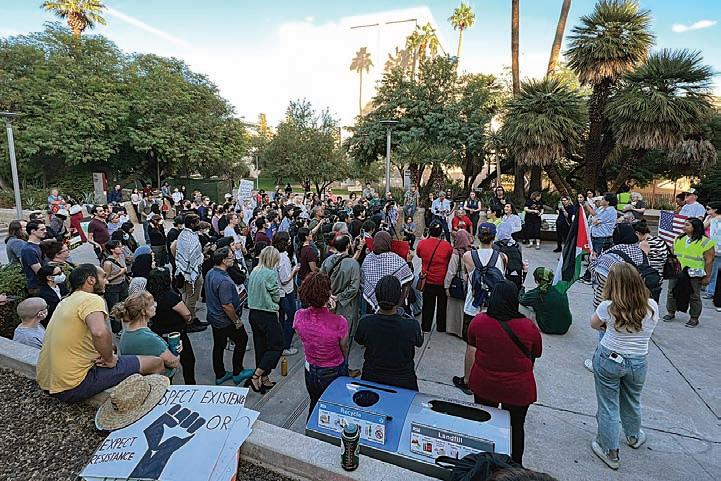
Individuals gather at Arizona State University in Tempe, AZ for an impromptu rally after Rep. Rashida Tlaib’s (D‐MI) speech on the campus was cancelled at the last minute, on Nov. 17, 2023.
StopAntisemitism encouraged people to contact ASU to demand the university cancel her talk.
The event was cosponsored in part by three university student groups: the National Lawyers Guild at ASU, the Middle Eastern Law Students Association at ASU and Students for Justice in Palestine at ASU. Two ASU faculty members also helped organize the event.
Finn Howe, the president of Students for Justice in Palestine at ASU, responded to Loo’s email, stating, “It is critical that the ASU community hears from Rashida Tlaib as she is the only Palestinian representative in Congress. It is no secret that there has been a campaign by other groups to demand our event be canceled, which we believe stands in the face of ASU’s free speech policy and commitment to inclusion on campus.”
Mik Jordahl, a member of the Arizona Palestine Network, an off-campus group which also cosponsored the talk, said in an email to ASU, “I can only see this as an effort to frustrate an important speech by the only Palestinian American member of Congress. Universities should encourage a wide array of speech from all directions, not frustrate it.”
After addressing the assembled crowd at ASU, Rep. Tlaib spoke at a fundraising
dinner in Phoenix and was the keynote speaker at the Council on American-Islamic Relations-Arizona (CAIR-AZ) annual banquet in Phoenix on Nov. 18. The CAIR-AZ banquet was originally slated to be held at the Sheraton Mesa Hotel at Wrigleyville West, but the venue canceled the event about two weeks before the dinner, citing threats against the establishment by pro-Israel individuals. An Embassy Suites Hotel in the area ultimately hosted the event.
Organizers said they hope to work closely with the ASU administration to host a talk by Rep. Tlaib at ASU before the end of the current school year.
Michael Bradley
Responding to the mounting death toll in Gaza, a coalition of solidarity organizations held a massive “National March on Washington for Palestine” on Nov. 4. Organizers estimate that 300,000 people participated in the protest in downtown Washington, DC, making it the largest proPalestine gathering in U.S. history, and among the biggest for any cause in Washington in recent years. Supporters from cities across the nation traveled to DC, including Portland, Maine; Boston; Colum-
bus, Ohio; Atlanta; Miami; and at least ten buses drove from New York City.
In a statement, event organizers said, “Israel, with the full backing of the U.S. government, is carrying out an unprecedented massacre in Gaza. Thousands of Palestinians are being killed with bombs, bullets and missiles paid for by U.S. tax dollars. This is the latest bloody chapter in the colonial project of Israel, founded with the objective of dispossessing Palestinians from their land.”
Israel’s stated military goal of eliminating Hamas has led to all corners of the densely populated Gaza Strip being relentlessly bombed, resulting in (as of Dec. 7) the deaths of more than 16,000 Palestinians, including 6,600 children.
Nihad Awad, executive director of the Council on American-Islamic Relations (CAIR), one of many speakers from a diversity of backgrounds, told the crowd their activism is important. “Part of what we do every day is defend the rights of American Muslims and pro-Palestine activists,” he said of CAIR. “Those activists who have been subjected to hate crimes, Islamophobic attacks, who have been fired from their job, discriminated against, and those whose right to speak has been stifled in schools or university campuses, I tell all of you we hear you and we are with you. You are not alone. The people of Gaza, the children of Gaza, rely on your voices and on your activism. Do not be scared, do not be intimidated. Contact our organization and seek our help.”
U.S. rapper Macklemore told the crowd about some advice he did not accept. “They told me to be quiet, they told me to do my research, to go back, that it’s too complex to say something, to be silent in this moment. In the last three weeks, I’ve gone back and I’ve done some research and I’m teachable, I don’t know enough, but I know enough that this is a genocide.”
Other speakers included attorney and activist Noura Erakat, writer Mohammed El-Kurd, author Vijay Prashad, representatives of the Palestinian Feminist Collective who were joined by actor Susan Sarandon, student activists from across the U.S., as well as representatives from
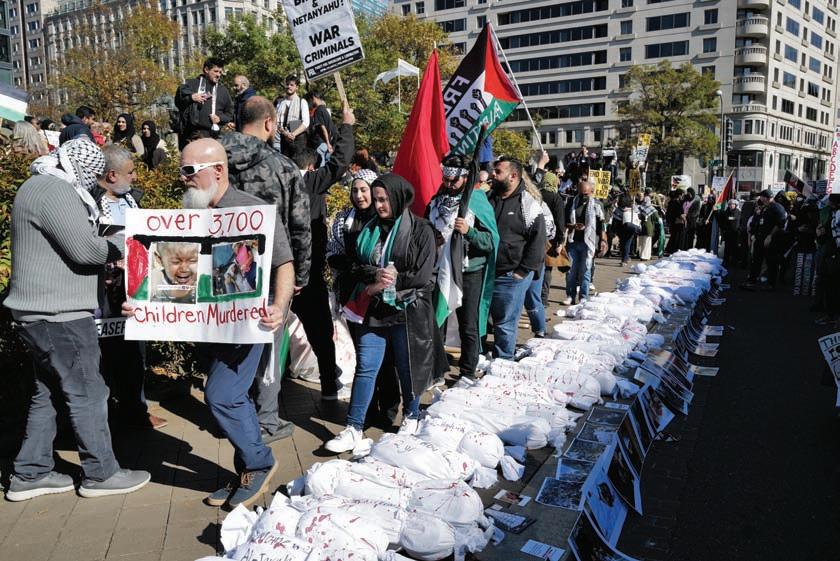
leading Palestinian, Arab, Muslim, Black, Indigenous and other co-sponsoring organizations.
Attendees held signs and participated in chants referring to the president as “Genocide Joe,” and stated their intent not to vote for him in the upcoming 2024 presidential election.
Following the rally at Freedom Plaza, the massive crowd marched to the White House, filling the city’s downtown streets with chants for an immediate ceasefire and an end to military aid to Israel.
Similar rallies calling for a ceasefire were held on that Saturday in London, Berlin, Bucharest, Paris, San Francisco, Los Angeles and other cities.
Phil Pasquini
To push for an immediate ceasefire in Gaza, members of the American Palestinian Women’s Association (APWA), CODEPINK: Women for Peace, and Doctors Against Genocide descended on the Hart Senate Office Building on Nov. 16. The groups called on ten female senators—all of whom have received substantial campaign donations from the American Israel Public Affairs Committee and
other pro-Israel groups—to do everything they can to bring about a ceasefire in Gaza.
At each office, several activists spoke to staff members, imploring their bosses
to vote in favor of an immediate ceasefire. They also provided a binder with photographs of the victims in Gaza, along with the names of 5,000 children who have been killed.
Sen. Tammy Duckworth (D-IL), whose staff was contacted by telephone, refused to meet with the activists.
Speaking with a staff member outside the office of Sen. Maria Cantwell (D-WA), CODEPINK co-founder Medea Benjamin asked why the senator had not called for a ceasefire. “She has not called for a ceasefire yet because that is not her position right now,” the staffer said. When asked why it was not her position, he added: “Although she has not made a public statement, she is certainly talking to her colleagues and assessing what the options are. I have nothing else I can say about her position.”
An APWA member made an urgent plea to the senators’ staff members: “We are here pleading for your humanity” amid the many images of injured and dead children, she said. “We have to speak up, we cannot stand silent,” she told fellow ac-

American Muslims for Palestine (AMP) held its 16th annual convention Nov. 24‐25 at the Tinley Park Convention Center in Tinley Park, IL. The event, titled, “Gaza’s Resilience: The Ongoing Nakba,” was originally slated to be held at the Hyatt Regency O’Hare Chicago, but the venue cancelled citing security concerns. The change of location did not depress attendance. “Despite the attempts to silence us, leading to the cancellation of our initial venue, our convention has grown to over 3,500 attendees on the first day,” AMP said. “Supporters of the Palestinian cause have resoundingly proven that they will remain steadfast and will not hesitate to join with one another to learn, to grieve and to grow.” Visit <palestineconvention.org> to watch proceedings from the conference.
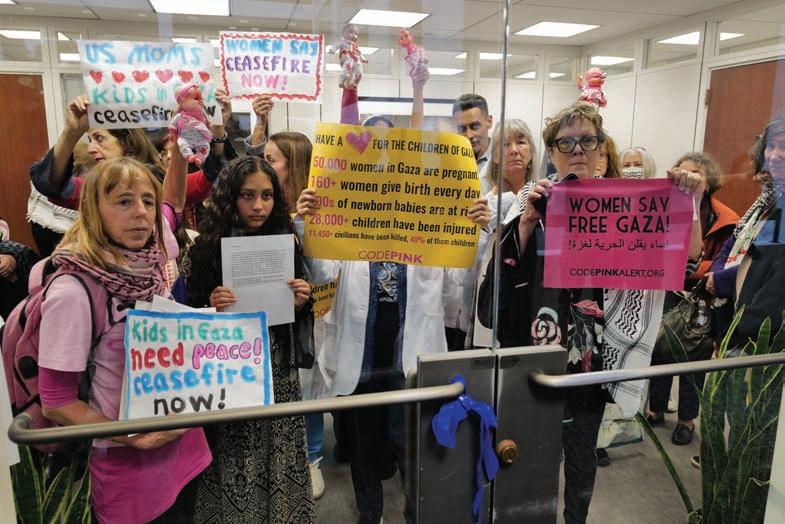
tivists. “We have to stop the bombing of the kids, our babies [paid for] with our tax money.”
“I don’t understand the concept of giving aid to provide bombs that create victims,” one doctor added. “And then we are going to ask doctors to stitch them up, to try and save them? This is idiotic. It is insanity.”
Activists also visited the offices of Sens. Tammy Baldwin (D-WI), Catherine Cortez Masto (D-NV), Maggie Hassan (D-NH), Lisa Murkowski (R-AK), Jeanne Shaheen (D-NH), Kyrsten Sinema (I-AZ), Tina Smith (D-MN) and Elizabeth Warren (DMA). Phil Pasquini
Pakistani Ambassador Advocates for Kashmiri Self-Determination
On Oct. 27, Masood Khan, Pakistan’s ambassador to the United States, addressed a gathering at the Embassy of Pakistan in Washington, DC on the 76th observance of “Kashmir Black Day.” The annual occasion honors the people of Kashmir and Jammu who lost their lives when Indian troops took over Srinagar, Kashmir’s largest city, after India and Pakistan gained independence following nearly 90 years of British colonial occupation.
“This was the day the liberty and freedoms of Kashmiris were taken away from them,” the ambassador said. “India got
freedom, Pakistan got freedom, but Kashmir did not.”
In recent years, “India has violated all international laws and conventions in IIOJK [illegal Indian-occupied Jammu and Kashmir],” Khan charged. “They have violated the political, economic, social and cultural rights of the people of Jammu and Kashmir. They have violated the ICC [International Criminal Court] statutes with impunity.” (Pakistan claims full sovereignty over the Kashmir region.)
“The people of Kashmir continue to suffer…and we will not give up the struggle under any circumstances,” the ambassador, who previously served as president of Pakistan-administered Kashmir, stated. “When you try to sweep such issues under the carpet, they erupt with intensity, as has happened in the case of Palestine.”
Khan noted Kashmir does not have a strong international voice or lobby and he urged Kashmiris to build their own “information ecosystem….Today, truth becomes falsehood and falsehood is projected as truth and, therefore, you have to have your own set of facts, data and vehicles to broadcast the truth.”
The people of Pakistan and Jammu and Kashmir are ready for bilateral talks with India under the auspices of the U.N. and through the facilitation of third parties, the ambassador said. “The right to self-determination of the people of Jammu and Kashmir is inherent even if there were no U.N. Security Council Resolutions…which were passed in accordance with the U.N. Charter, which recognizes the inalienable right of Kashmiris [and all peoples] to choose their own political future.”
Elaine Pasquini
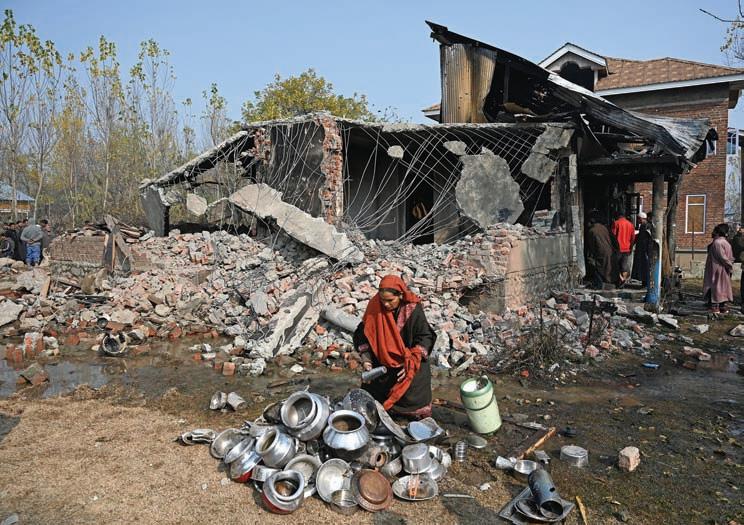

All books featured in this section are available from Middle East Books and More, the nation’s preeminent bookstore on the Middle East and U.S. foreign policy. www.MiddleEastBooks.com • (202) 939-6050 ext. 1101
The Lives and Deaths of Jubrail Dabdoub: Or, How the Bethlehemites Discovered Amerka
By Jacob Norris, Stanford University Press, 2023, paperback, 290 pp. MEB $25
Reviewed by Ida
Audeh
This wonderfully readable book describes the development of Bethlehem’s international trade routes and their impact on the town during the last half of the 19th century and early 20th century through the history of one Jubrail Dabdoub. In the 1850s, Bethlehem’s leading families were involved in manufacturing mother of pearl and hand carved rosaries and crosses, which they sold to pilgrims coming to the Holy Land. The patriarch of the Dabdoub family realized that they would remain small-time operators as long as they relied on pilgrims to come to them, and so they took their wares and headed for the Jaffa port, from there to sail to the unknown— Paris, Manilla, Chicago, San Salvador, Havana, Brazil. There they made their fortunes and set up businesses that later would prompt family members to settle in these new lands. The story ends in 1930, with the economic crash and the death of Jubrail. By then, Bethlehem had been completely transformed.
That is the storyline in brief. The author’s style makes this history of Bethlehem’s transformation read like a novel. To hold to the narrative line, Jacob Norris uses end notes to provide the basis for events, sometimes presented fancifully, and dialog that will sound authentic to
Ida Audeh is a contributing editor of the Washington Report

Arabic speaking readers (like the use of the spelling “Amerka,” consistent with the spoken form). In the notes, Norris describes his reasons for adopting a magical realist approach to the writing of this book: it captures “the sense of wonder and confusion” that simple townspeople experienced as they explored the globe and tried to convey to their kin and friends back home what they saw, which inevitably sounded like a tall tale. The author views “storytelling as an essential part of doing history,” and in this work he had to deal with a main character about whom little was directly known.
So why choose Jubrail Dabdoub? The answer lies in one of the many sources on which the author relied to reconstruct Bethlehem during this period: the notebooks of a Bethlehem nun, Marie-Alphonsine Danil Ghattas, who kept good daily records of her life, including the miracle that the book’s title alludes to. In 1909, Jubrail was stricken with typhoid and was believed to have died; the family called for the nun, she prayed to the Virgin Mother for his recovery, and soon the apparently-not-really-
dead man showed signs of life. (This nun was later canonized in 2015, and Jubrail’s recovery was cited as evidence of her saintliness.) She recorded the incident matter-of-factly, and her community believed that he had truly been brought back from the dead. (Norris discovered from his eclectic and disparate sources that Bethlehemites believed that in their town, “miracles of every kind…seemed to be occurring with great frequency.” His ability to capture the townspeople’s belief in divine intervention in daily life lends the book much of its charm.)
Take this description of Jubrail’s return to Bethlehem after making inroads in the Philippines: “His stories had the air of the khurafiyya [tall tale] about them, opening with the young hero leaving his village on a quest to find a great treasure on a mysterious, faraway island. To get there, he had to outsmart various kinds of ghouls, jinn and wicked rulers. Captivating his listeners with tales that stretched even the most fantastical of imaginations, he spoke of floating cities that glided through deserts, giant monsters of the deep and enchanted lands of magical temples.”
Storytelling aside, 19th century Bethlehemites were shrewd, trailblazing entrepreneurs. They traveled to international expositions in world capitals to sell their goods and make connections with importers—and eventually set up businesses to be run by family members. Their greatest successes were in Honduras and Chile, and there they set roots, requesting brides be sent to them from Bethlehem. By 1909, Norris tells us, Bethlehem was the richest town in Palestine, and the major merchant families built magnificent mansions with the wealth their foreign trade provided.
The townspeople were very practical, and Norris describes conversions to Catholicism to promote their business dealings with foreign (Catholic) clergy. His description of Muslims praying to Mary in a church alongside their Christian neighbors is touching in its simplicity; the author notes that people of both faiths believed in her with equal passion, and an observer seeing them both at prayer would be unable to tell them apart. Foreign clergy
found this comingling of religions incomprehensible.
Using a range of sources—the nun’s notebooks, parish records, interviews with descendants of the Bethlehem merchants who were active at the turn of the century, memoirs written during those years, other supplemental material to provide context, and his imagination—Norris has written an account that brings to life a town on the cusp of transformation and a population that bravely stepped into the unknown to secure their fortunes.
Edited by Penny Johnson and Raja Shehadeh, Olive Branch Press, 2023, paperback, 202 pp. MEB $17.95
Reviewed by Zeina Azzam
Editors Penny Johnson and Raja Shehadeh asked Palestinian essayists, poets, novelists, academics and critics to write about home and exile, to let their imaginations and memories go beyond historic facts and to cross into a space of introspection. The result, they note, is a book that “is an intimate key and its claim is to imagine, rather than to represent.” The 14 diverse voices “seek” Palestine through deeply personal rumination on the fraught meanings of exile, loss, displacement, belonging, resistance and reclamation.
“Reading and writing poetry became my means to remember, to maintain awareness of myself as a person with a singular biography and subjectivity, to explore my estrangement,” writes poet and essayist Sharif Elmusa. Novelist Adania Shibli also finds solace in words: “they are all that I can carry in my ceaseless wandering from one city to another…In all sizes and all shapes, small and large, heavy and light,
Zeina Azzam is a Palestinian American poet, writer, editor and community activist. She is currently the poet laureate of the City of Alexandria, VA. Her full-length poetry collection, Some Things Never Leave You (available from Middle East Books and More), was published by Tiger Bark Press in July 2023.
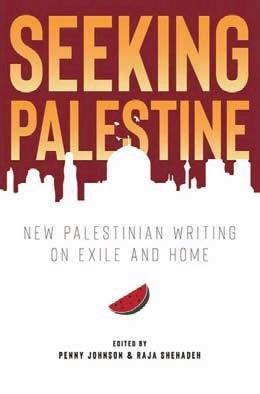
they come together to turn a strange land into a land I can inhabit, with the least possible effort.”
Novelist Suad Amiry writes about Palestine as an obsession and expresses her exhaustion at its overwhelming presence in her life. She concludes her poem with the question, “Palestine/ Will you ever set me free?” A similar view is echoed by writer and teacher Jean Said Makdisi: “Palestine encroaches on every perception: one views the whole world, and everything in it, through alienated Palestinian eyes, always aware of being in a state of incompletion, of an interrupted existence.” She goes on to say, “Is it not true that in ancient times the worst punishment was not death, but banishment?”
The idea of banishment faced Professor Rana Barakat squarely when she was denied entry and deported from Palestine in 2010. This provoked a visceral reaction regarding what exile means to her: “In time I would learn that neither exile nor conditions of alienation and displacement would be cured, rather they would add new layers to what was a rich, albeit often tragic, presence.” For lawyer and writer Raja Shehadeh, it’s his presence in Palestine that is questioned. He asks if he should have left Palestine when he realized what the future would become, saying that “I both stayed and left; I became an internal exile.”
Professor Rema Hammami chronicles the years she lived in the Sheikh Jarrah neighborhood of Jerusalem, from 1989 to 2002, describing colorful Palestinian personalities eking a living and trying to hold
onto their houses as the Israeli government and settlers continued their violent encroachment and takeovers. She writes of her everyday movement in Jerusalem: “Life was made a pitiless odyssey through the brutish maze they had made of the landscape, punctuated by spasms of military invasion and aerial bombing. Against this annihilation of our familiar links between time, place and matter, like everyone else, I doggedly made the journey, believing I could defy the physics of despair. Until one day when, at the first checkpoint, I finally broke down. I couldn’t do it anymore… Khalas [enough], I would go home. No more fighting this hopeless battle. But what was there at home? It had become the cave where I hid from the horrible world outside.”
Professor Lila Abu-Lughod writes about her father, the late academic Ibrahim AbuLughod, who went back to live in Palestine in his later years. His “passion,” she recounts, was to plan a Palestinian national museum that he insisted would “communicate the continuous existence of the Palestinians on the land, assert a living national history and serve as a resource for historical research and archiving.” She describes her own experience in the diaspora as having to face hostility and lies regarding “the everyday violence of checkpoints, imprisonment, racism and death; complicit in the rhetoric of retaliation and security; silent about the primal injustice of 1948…To be a Palestinian in America is to learn to navigate this chasmic understanding of the world.”
Novelist Mischa Hiller adds that Palestinians in the diaspora, like himself, experience “not simply their expulsion, but the gradual dismantling of their abandoned homeland…Every effort has been made to make it disappear, to remove it from the map of our consciousness.”
Although novelist Susan Abulhawa ended up in the United States, her childhood in Palestine was filled with painful and formidable hurdles. She writes, “I was without papers, without a passport. I didn’t belong anywhere but to a political discussion called ‘The Question of Palestine.’ I was an abstraction. I was nothing.” Through grit and an incredible reserve of
strength, she persevered and came to understand “what it ultimately means to resist.”
Writer and historian Karma Nabulsi explores the conundrum that despite the world’s growing understanding of conflicts and human rights, Palestinians are unable to “move on” and are stuck in “historical amber.” Poet and writer Mourid Barghouti describes an almost comedic scene that fits such imputed stagnation: as he and several passengers are in a taxi, it becomes stuck in a rain- and mud-filled trench, and a crane comes to rescue it. He recounts, “The suspended blob of air in which we seven are swinging is now our place of exile from this earth. It is our disabled will and our attempt, in a mixture of courage and fear, to impose our will through wit and cunning. This bubble of air is the unyielding occupation itself. It is the rootless roaming of the Palestinians through the air of others’ countries.”
Although visual artist Emily Jacir does not have an essay in this book, images from her work, Where We Come From, open the three main sections. Each of these comprises a photograph from Palestine and writing, in Arabic and in English, of a request made of Jacir by Palestinians who are unable to travel to Palestine, or parts of it. “Go to Gaza and eat sayadiyeh [a fish and rice dish]” is one request from a Palestinian citizen of Israel who is unable to enter Gaza. Another person from Gaza who now lives in Ramallah and cannot go back, writes, “Visit my mother, hug and kiss her…Visit the sea at sunset and smell it for me.”
This collection of essays has been edited sensitively and offers a significant and eloquent contribution to understanding the diversity of Palestinian experiences. Although this second edition was published in 2023, it is a replica of the 2013 edition, so at times depictions of the political situation feel somewhat outdated. In an ideal world, perhaps the writers could have been offered an opportunity to add to their chapters. At the same time, what they have written exposes a historical moment of thought in their evolving relationship with Palestine, one that is profound, meaningful, and in a way, timeless.
By Rebecca Ruth Gould, Verso, 2023, paperback, 176 pp. MEB $19.95
Reviewed by Alex Bustos
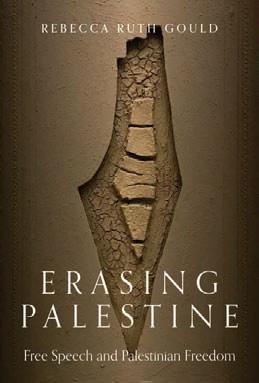
Free Speech and Palestinian Freedom is a bold and refreshing study of the debates surrounding Palestine and freedom of expression. Focusing on the International Holocaust Remembrance Alliance’s (IHRA) “working definition of antiSemitism,” Gould examines how free speech around Palestine/Israel has been suppressed—and how such attacks have contributed to the erasure of Palestinians. Erasing Palestine begins with Gould’s own experience of being accused of antiSemitism while working at the University of Bristol over an article she had written years earlier. The offending work, written while Gould was living in occupied Palestine, was taken out of context and used to accuse her of racism. This episode, which Gould recounts in detail, is used as a jumping off point to examine how university administrations handle cases of free speech regarding Palestine and Israel. What is illuminating here, and in other such cases explored later in the book, is how corporate and public bureaucracies disproportionally target Palestinians and those who support them. This reality, of course, has worsened exponentially since the events of Oct. 7, 2023.
Alex Bustos is assistant director at Palestine Deep Dive.
The strength of the book comes from Gould’s argument for moving away from broad definitions of anti-Semitism, such as the IHRA, in favor of a “materialist” approach to understanding and combatting racism. Drawing on the works of Jewish Marxist intellectuals such as Abram Leon, Leon Trotsky, Isaac Deutscher and Karl Marx himself, the author argues that an understanding of racism through “dialectical materialism” allows emphasis to be placed on the lived experiences of discrimination and marginalization, while de-emphasizing one’s alignment with a certain political position or entity. This, Gould argues, helps us avoid the counterproductive and harmful impact of tying anti-Semitism to holding a critical position toward Israel, which, in turn, contributes to the silencing of, and discrimination against, Palestinians.
Put the Washington Report on Middle East Affairs to work for you!
Have you thought about advertising your company, charity, book, craft, skills or personal service with us—but have never gotten around to it? For information on prices and deadlines, please visit www.wrmea.org/u9r3 or e-mail advertising@wrmea.org or call (202) 939-6050 ext. 1105. We will help make your advertising effective. (We offer a 30 percent discount on combinations of print and online banner advertising!)
The chapter focusing on forgotten Jewish Marxist Abram Leon, whose work was only revived following the 1967 war, is particularly relevant to the argument of the book. Gould demonstrates how Leon’s materialist critique of anti-Semitism provides important lessons for us today, as it helps us understand racism within its social and political environments, rather than through simplistic definitions. This, the author suggests, provides a much better way to interrogate and—ultimately—obliterate anti-Semitism.
Gould also details the fascinating history of Jewish anti-Zionism in Britain leading up to the 1917 Balfour Declaration, which was issued by the British wartime government promising to “support the establishment of a Jewish home in Palestine.” The author draws parallels between debates then and those over the IHRA today, arguing that Jewish interests are often cynically framed around political matters, turning the Jewish community into proxies for agendas (such as Zionism) that are unrelated to Jewish equality and human rights.
Gould also points out that just as Christian fundamentalists are among Israel’s most loyal advocates today, in 1917 the Zionist movement drew some of its strongest support from people who were also themselves anti-Semites. (As just one modern example, Christian Zionist pastor John Hagee, known for his extensive history of anti-Semitism, was an invited speaker at a pro-Israel rally held in Washington, DC on Nov. 14, 2023.)
In the final chapter, the author argues in favor of a robust defense of free speech that takes power out of the hands of the state, thwarts true anti-Semitism and prevents Palestinian voices from being singled out. Gould maintains that a more effective way of tackling racism is to change the political and sociological conditions that allow racism to flourish.
Amid such a charged and toxic atmosphere, Gould’s Erasing Palestine is a welcome intervention with thought-provoking and important suggestions for a way forward. This slim book is packed with detail and makes for necessary reading.
A Day in the Life of Abed Salama: Anatomy of a Jerusalem Tragedy by Nathan Thrall, Metropolitan Books, 2023, hardcover, 272 pp. MEB 29.99
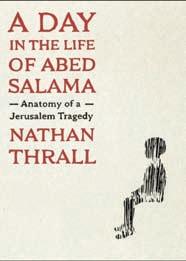
Five-year-old Milad Salama is excited about a school trip to a theme park on the outskirts of Jerusalem. On the way, his bus collides with a semitrailer. His father, Abed, gets word of the crash and rushes to the site. The scene is chaos—the children have been taken to different hospitals in Jerusalem and the West Bank; some are missing, others cannot be identified. Abed sets off on an odyssey to learn Milad’s fate. It is every parent’s worst nightmare, but for Abed it is compounded by the maze of physical, emotional and bureaucratic obstacles he must navigate because he is Palestinian. He lives on the wrong side of the separation wall, holds the wrong ID to pass the military checkpoints, and has the wrong papers to enter the city of Jerusalem. Abed’s quest to find Milad is interwoven with the stories of a cast of Jewish and Palestinian characters whose lives and histories unexpectedly converge.
Rotten Evidence: Reading and Writing in an Egyptian Prison by Ahmed Naji, translated by Katharine Halls, McSweeney’s, 2023, paperback, 263 pp. MEB $20
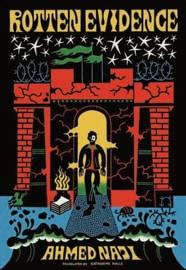
In February 2016, Ahmed Naji was sentenced to two years in prison for “violating public modesty,” after an excerpt of his novel Using Life reportedly caused a reader to experience heart palpitations. Naji ultimately served ten months of that sentence, in a group cell block in Cairo’s infamous Tora Prison. Rotten Evidence is a chronicle of those months. Through Naji’s writing, the world of Tora Prison comes into vivid focus, with its cigarette-based economy, home-made chess sets and well-groomed fixers. Naji’s storytelling is lively and uncompromising, filled with rare insights into both the mundane and grand questions he confronts: How does one secure a steady supply of fresh vegetables without refrigeration? How does one write and revise a novel in a single notebook? Fight boredom? Build a clothes hanger? Negotiate with the chief of intelligence? And, most crucially, how does one make sense of senseless imprisonment? Genuine and defiant, this book stands as a testament to the power of the creative mind in the face of authoritarian censorship.
Woman Life Freedom: Voices and Art from the Women’s Protests in Iran Edited by Malu Halasa, Saqi Books, 2023, paperback, 272 pp. MEB $19.95
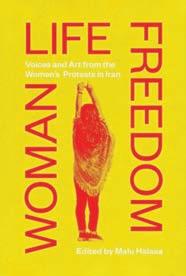
Jina Mahsa Amini’s death at the hands of Iran’s “morality police” on Sept. 16, 2022 sparked widespread protests across the country. Women took to the streets, uncovering their hair, burning headscarves and chanting “Woman, Life, Freedom” in mass demonstrations. An explosion of creative resistance followed, as art and photography shared online went viral and people around the world saw what was really going on in Iran. Woman Life Freedom captures this historic moment in artwork and first-person accounts. This striking collection goes behind the scenes at forbidden fashion shows; records the sound of dissent in Iran where it is illegal for women to sing unaccompanied in public; and walks the streets of Tehran with “The Smarties”—Gen Z women who color and show their hair in defiance of the authorities, despite the potentially devastating consequences. Extolling the power of art, writing and body politics, this collection is a universal rallying call and a celebration of the women the regime has tried and failed to silence.
By Alice Rothchild, Cune
Press, 2023, paperback, 190 pp. MEB $16
Reviewed by Delinda C. Hanley
As a mom and former high school teacher, I wanted to give a stern lecture to 16-yearold Melody in the opening chapters of Alice Rothchild’s juvenile novel, Finding Melody Sullivan. “Get a grip. Enough with the F-bombs. Wash those piles of dirty dishes and while you’re at it, get over yourself!” Melody is drowning in self-pity and anger after her mother’s death from cancer, and her well-meaning but detached, absent-minded professor father takes the brunt of her fury. Luckily, Melody copes just the way this former English teacher would actually advise, since stern lectures rarely work: “Write it down. Pour every thought into words and poetry.” And she does—and it helps. Melody, who is half Irish and half

Jewish, also gets help from her best friends in Vermont, the hijab-wearing Palestinian American Yasmina Khdour and the kippah-wearing Jewish American Aaron Shapiro.
Her father insists Melody goes with him to Jerusalem while he attends an arche-
ology conference. He leaves a sticky note message on a travel guidebook in their hotel room that says, “Your mom and I loved this city. Here’s where we met, at the Austrian hospice, when we were grad students (we fell in love to the sounds and smells of Jerusalem). She always wanted to come back.” Following the book and other stickies, Melody wanders the Old City, takes Aaron to the Western Wall (via cell phone) to leave his text prayer, and connects with her Jewish mom, who according to another sticky, “loved that place. For an atheist, she said this was where she had her finest spiritual moments.”
However, a visit with her Israeli cousins’ family in Tel Aviv turns ugly and Melody impulsively runs off to Hebron where Yasmina is visiting her family amid protests and violent attacks by settlers and Israeli forces—did I mention one of Melody’s cousins is stationed there? With
the help of a Palestinian nurse who lives in East Jerusalem and works in Bethlehem, Melody navigates unnerving checkpoints and watches young Israeli soldiers point automatic rifles at travelers as they decide whether they can come or go. Aaron accompanies her on this journey, too, texting warnings, “Those people are Arabs. THEY HATE JEWS. No really, they kill Jews... U don’t get it. Arabs want to destroy Israel. Not safe there—on their side of the fence.”
Melody takes photos with her cellphone as Yasmina’s uncle, Mahmoud, drives her from Bethlehem to Hebron, giving her a history lesson along with glimpses into Palestinian life as townspeople exist alongside fanatic settlers— did I mention Aaron has settler cousins in Hebron? She shoots photos of “DEATH TO ARABS!” and Jewish Stars of David spray-painted on the locked metal gates of Arab-owned shop doors as they walk past the closed markets on Hebron’s Shuhada Street. She takes a photo of a man wearing a kippah pointing a gun at a young boy cowering against a wall and thinks, “I gotta talk to Aaron. Wait ’til he sees this.”
Anyone who has visited a Palestinian home knows what comes next. Melody’s risky journey may have opened her eyes to the daily humiliation and traumas Palestinians face, but she also learns how they manage to love, dance, cook and eat despite living under military occupation.
Back home again, after the three friends have some difficult conversations, Melody decides, “Our lives are like tightropes. And we’re just all trying not to fall off. But we will...But then we get back up. You know, like that Beatles’ song my mom loved, the one about a little help from your friends.”
If you know a teen who is walking that tightrope or, perhaps, just wants to know what’s actually going on in Israel and occupied Palestine, this is the book for them. And go ahead and sneak a read before you hand it to them. ■
Delinda C. Hanley is executive editor of the
Report
Diary of a Country Prosecutor: A Novel by Tawfik AlHakim, translated by Abba Eban, Saqi Books, 2023, paperback, 176 pp. MEB $14.95
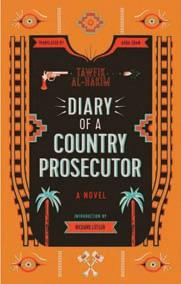
Who shot Kamar al-Dawla Alwan? Was it a crime of passion? What was the role of the beautiful peasant girl, Rim? Is the mysterious Sheikh Asfur as crazy as he seems? Diary of a Country Prosecutor is an Egyptian comedy of errors. Partly autobiographical, it is written as the journal of a young public prosecutor posted to a village in rural Egypt. Imbued with the ideals of a European education, he encounters a world of poverty and “backwardness,” where an imported legal system is both alien and incomprehensible. This newly translated book, written by dramatist and short story writer Tawfik Al-Hakim (1898-1987), is primed to enthrall another generation.
Wild Poppies by Haya Saleh, translated by Marcia Lynx Qualey, Levine Querido, 2023, hardcover, 192 pp. MEB
$17.99

Since the passing of their father, Omar has tried—and in his little brother Sufyan’s eyes, failed—to be the man of his family of Syrian refugees. As Omar waits in line for rations, longing for the books he left behind when his family fled their home, Sufyan explores more non-traditional methods to provide for his family. Ignoring his brother’s warnings, Sufyan gets more and more involved with a group that provides him with big rewards for doing seemingly inconsequential tasks. When the group abruptly gets more intense—taking Sufyan and other boys away from their families and teaching them how to shoot guns-—Sufyan realizes his brother is right. But is it too late for Sufyan to get out of this? It’s left up to Omar to rescue his brother and reunite his family.
Eleven Words for Love: A Journey Through Arabic Expressions of Love by Randa Abdel-Fattah and Maxine Beneba Clarke, Candlewick Press, 2023, hardcover, 40 pp. MEB $18.99

This lyrical narrative of a Palestinian family in exile explores universal bonds of family, loyalty and friendship through the lens of eleven Arabic expressions for love. A family has fled their homeland in search of safety in another country, carrying a single suitcase. As their journey unfolds, the oldest child reflects on the special contents of that suitcase: photo albums that evoke eleven of the names for love in Arabic. From sunshine-warm friendship to the love that dissolves all tears; from the love that makes you swoon to the love that leaves you yearning for the heart’s homeland— her family has experienced it all. Illustrated in vibrant watercolor pencil and collage on textured card stock, this moving children’s book shows a family embracing an unknown future even as they honor the past, casting immigration and the refugee experience in the light of universal human connection.
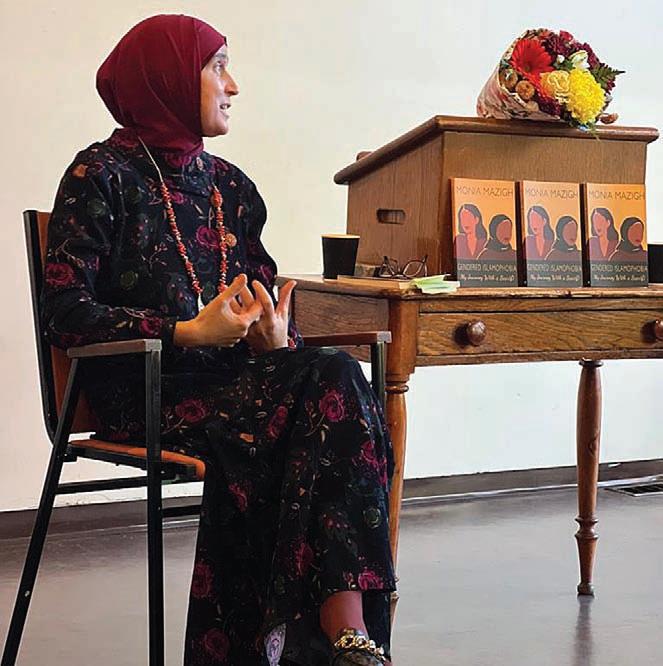
“I AM TELLING a story about how wearing a head scarf can be literally dangerous,” writes Monia Mazigh, in her new book Gendered Islamophobia: My Journey With a Scar(f), recently nominated for a Governor General’s Award. While Mazigh’s previous works were all published initially in French, her second language, this memoir is in English because, for her, French represented the language of the colonizer.
“France is probably the only country that really demonizes the scarf and Muslim women who wear it,” Mazigh said. She explained that France’s condemnation of the hijab is part of its politics.
Mazigh is also the author of Hope and Despair, the story of her husband Maher Arar’s 2002 ordeal when he was deported from
Candice Bodnaruk has been involved in Palestinian issues for the past 14 years through organizations such as the Canadian BDS Coalition and Peace Alliance Winnipeg. Her political action started with feminism and continued with the peace movement, first with the No War on Iraq Coalition in 2003 in Winnipeg.
By Candice Bodnaruk
Canada to Syria, tortured there and held without charge for over a year. She has also written two novels and is currently working on a third.
Mazigh, who lives in Ottawa, was at the Winnipeg International Writer’s Festival recently and sat down with the Washington Report to discuss what motivated her to pen her most recent work and the ongoing challenges Muslim women face, not just in North America, but globally, including what she calls “the normalization of hate.”
“I think there is a sense of urgency to share this story,” she explained. The rise in Islamophobia and the Quebec City Mosque shooting in 2017 led her to pen Gendered Islamophobia. She is hearing that more and more people, especially women, are victims of Islamophobia.
Mazigh was born to liberal Muslim parents and raised in Tunisia. She said her parents were baffled when she began to wear hijab in her 20s. At the time she also felt her own country was pushing her away—as Tunisia had previously banned Muslim women from wearing headscarves in the 1980s and had also engaged in “unveiling campaigns” against Muslim women. Tunisia “put obstacle after obstacle after obstacle until I said it makes no sense, I can’t really grow up, keep learning or be the person that I wanted to be and at the same time keep my spirituality, keep my identity, and when I came to Canada, yes, that was really because I thought that nobody was going to make these obstacles for me and there won’t be a system that is going to push me aside,” she said.
Mazigh believes that the Islamophobia Muslim women experience when wearing the hijab silences, disregards and “others” them, which she calls “gendered Islamophobia.”
Ironically, Mazigh explains, she moved to Canada in the 1990s thinking she would find freedom, only to soon realize she was expected to remove her head scarf in order to be accepted and that few people she met at the time supported her choice to wear hijab
The book includes chapters focused on a woman’s day-to-day experiences of Islamophobia: “Hijab and Employment,” “Hijab and Public Transit,” and “Hijab and the Media.” In “Hijab and Politics,” she touches on her own experience running for the federal New Democratic Party in the 2000s.
“I want to draw attention to the fact that our laws, media, politicians and institutions have contributed to this phenomena,” she writes near the end of Gendered Islamophobia.
She writes that in Canada people see her headscarf and immediately make assumptions about her political beliefs, not just her religion, and she points out how women are judged based on their clothing and appearance.
“The head scarf is not only hated, it also gives those who are Islamophobic a ‘green light’ to act upon their ideas, so I think women are doubly punished for being women and for being Muslim,” she explained.
In Gendered Islamophobia she argues that Islamophobia and the plight of Muslim women—who are at what she calls “the front end” of hate because they wear hijab—is not an issue for Canadian Muslims alone to carry. It is like all forms of racism—the business of all Canadians.
Human Rights advocate Alex Neve described the arrival of four members of a Canadian humanitarian delegation to visit Canadians detained in a camp in northeastern Syrian in August as a “stunning moment.” The detainees, many of whom had been living there for over five years, believed Canada had all but forgotten about them.
The delegation is calling on the federal government to begin providing consular services to the 23 Canadian detainees who remain in the camp.
In a recent telephone interview with the Washington Report, Neve reported that until the delegation had arrived, no representatives from Canada had visited the detainees. The Federal Court of Appeal ruled in May 2023 that Canada is not required to repatriate the male detainees.
He described the circumstances the detainees are living in as “warehousing” and called the detention camps today’s version of Guantanamo Bay, except that Guan-
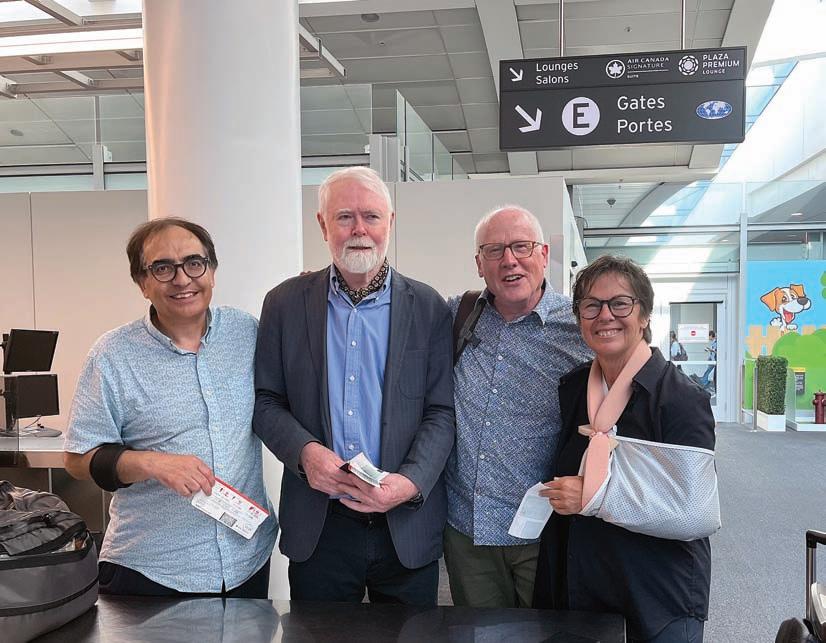
tanamo Bay had around 800 prisoners, while tens of thousands of people are detained in northeast Syria.
“More than half of the prisoners are under the age of 14, but it’s kind of the same premise, let’s tar everyone with the same broad, general accusations of being supporters of terrorism,” he said.
During their time in the region, the delegation interviewed four women, mothers of young Canadian children, and two men. They’d hoped to meet with nine men. “These are men who have had no contact with their family members or with Canadian officials for many years, so it was obviously a big breakthrough to have that opportunity,” Neve explained. He added the delegation is very concerned about the welfare of the seven men the delegation was denied access to.
Neve said the women told them they were worried about their children’s access to health services. He called the conditions in the camp “excruciating” and said women are worried about safe drinking water and having enough food to eat. Detainees are also living in very tight, congested conditions without heat. Neve noted violence and intimidation from other camp residents are also issues.
Neve explained the women have been told that the Canadian government supports bringing their children to Canada, but not the mothers. “That’s obviously a source of anguish but also trauma for both the women and the children and frankly it’s disgraceful that Canada proposes a policy that would result in mothers and children being forcibly separated from each other,” Neve said.
Neve said he would not rule out appealing the court’s decision to not repatriate the men to the Supreme Court of Canada. Neve argues racism is influencing Canada’s actions and that Islamophobia is definitely a “backdrop” in the case, noting that there is no example of non-Muslims being treated in a similar fashion.
Specifically, Neve said he has been troubled by the cases in Syria because these are lessons Canada should have learned 20 years ago. There have been numerous judicial rulings, including three from Canada’s Supreme Court, dealing with Omar Khadr’s case. Khadr was a 15-yearold Canadian child soldier detained by the U.S. in Guantanamo Bay for ten years. In 2009, Canada appealed the court order that it must repatriate Khadr and lost. The Canadian government eventually settled with
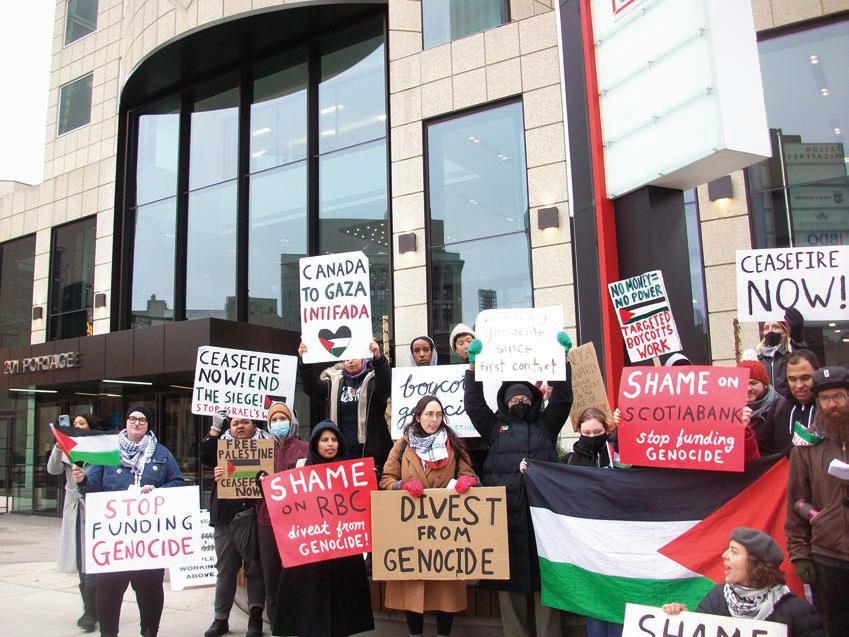
Khadr, who received $10.5 million in 2017 and also an official apology.
Neve said now Canada is using the same approach that seems to say national security concerns with Muslims are on the table and human rights don’t matter.
He maintained that regardless of the circumstances Canadians may find themselves in, if they are in distress abroad and when basic human rights standards are being ignored, they expect their government to show up for them.
Neve added that Canada’s response to those who remained detained in Syria should be a “concern to all Canadians.”
“It’s just really concerning that men have been held in prison now for 5-6 years without charges or trial, no opportunity in any legal way to challenge the reasons for their detention and gain their release, no access to lawyers, no access to family visits, it’s a complete contravention of virtually all human rights laws governing arrest, detention and fair trials,” he said.
Yet Neve said behind the scenes, the U.S. and other foreign intelligence policing agencies are very active. In fact, one man the delegation interviewed said he had been interrogated around 25 times by the FBI including just a few days before the delegation met with him.
Neve suggested that politics is also playing a role in the federal government’s deci-
sion not to repatriate Canadians from the camps, noting that the Liberal government thinks it would be bad public optics. He said if the government was in any way seen to assist the detainees, all of whom have been tarred with unsubstantiated allegations of being ISIS supporters, Canada’s Conservative Party would use that against them.
“The government has decided years’ worth of human rights violations are preferable to bringing them back and letting our own justice system handle it,” Neve concluded.
Palestinian solidarity activists took to Winnipeg’s streets in mid-November to demand the Canadian government advocate for an immediate Israeli ceasefire and called out Canadian banks for their complicity in Israeli apartheid and oppression. In what was dubbed “A Walk of Shame,” participants visited four of Canada’s big banks: Bank of Montreal, HSBC, Royal Bank of Canada and Scotiabank.
The action was part of the Shut it Down for Palestine initiative, an international call to action. The action was the creation of Queers4Palestine, a group that regularly holds rallies, direct actions and disruptions in Winnipeg and challenges the alliance be-
tween the Queer community and Israeli apartheid. The group also recently held a successful picket at Winnipeg’s Boeing plant to bring public attention to Canadian weapons sales to Israel.
Scotiabank is the biggest foreign shareholder in Elbit Systems. Canada signed a $36 million contract with Elbit in 2020 for a civilian version of a military drone (see article in the January/February 2022 issue of the Washington Report).
As the group walked through Winnipeg’s downtown to their destination, they engaged in rousing chants. Participants also leafleted passerbys on the sidewalk. The event was mainly peaceful, except for a lone pro-Israel protester who followed the group waving a large Israeli flag.
Bank reaction was mixed. As soon as people stepped inside the alcove at HSBC, security seemed immediately alerted and began to lock the bank down, but not until a few in the group were able to get into the bank itself. Their goal was to give a speech about that particular bank’s role in the oppression of Palestinians.
HSBC is a major shareholder in multiple companies that sell weapons and military technology to Israel.
When the protesters visited RBC they explained that the Canadian bank owns two Israeli banks that profit and participate in illegal Israeli settlement growth.
Organizers had written a chant specific to each bank. For example, when they reached Scotiabank, they chanted “Shame shame shame on Scotiabank/Stop the drones, the bombs and tanks.”
The Scotiabank visit was the most impactful. Staff allowed the protesters to enter the bank, and one organizer was even able to stand on a table and speak to customers and workers inside the bank. The bank continued doing business while participants dropped leaflets by the ATMs. ■
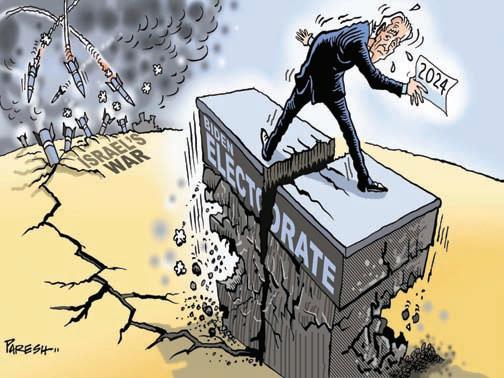
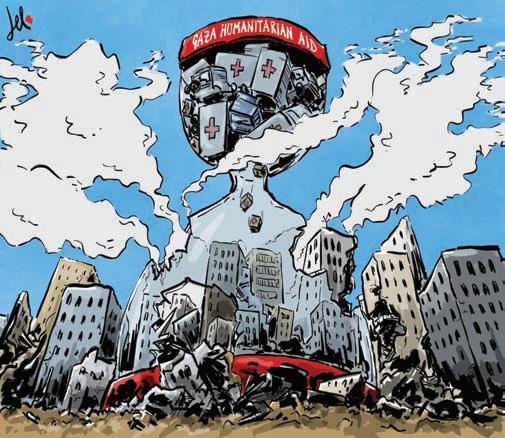
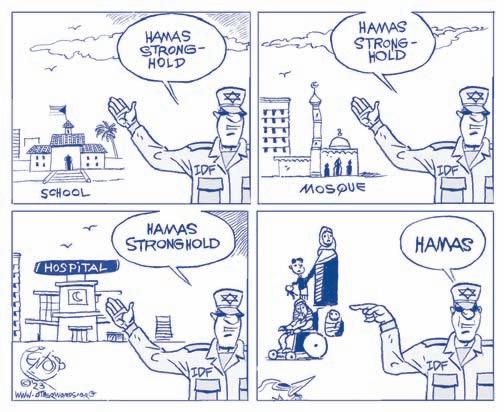
www.Otherwords.org

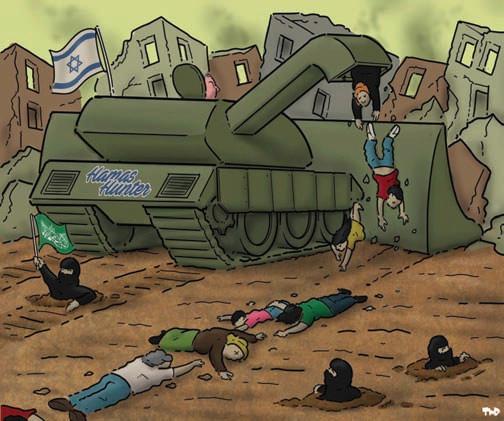
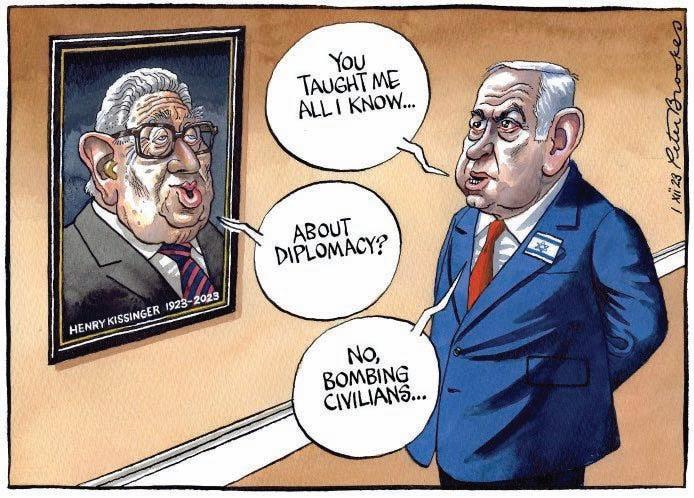
Compiled by Dale Sprusansky
To the Standard-Speaker, Oct. 29, 2023
Anti-Semitism is real and should be confronted wherever it rears its head; however, it is not anti-Semitic to criticize the policies and actions of the government of Israel.
Over two million Palestinians in Gaza live in an apartheid state and open-air prison established by Israel. If this were not the case, how could Israel choke off access to food, water, power or entry and exit from Gaza in one stroke?
Approximately 16,000 Palestinians have been killed in Gaza—6,600 of those corpses were children. The slaughter is ongoing.
It must now be apparent that Israel’s in-
Al Mokha Coffee.
American Near East Refugee Aid (ANERA).
Capitol Hill Citizen.
KinderUSA.
37
Inside Back Cover
43
30
Land of Canaan Foundation. .
Middle East Children’s Alliance. .
Palestine Children’s Relief Fund.
Palestinian American Medical Association.
. 12
49
45
21
Palestinian Medical Relief Society. . 51
Unitarian Universalists. .
United Palestinian Appeal (UPA).
PRESIDENT JOE BIDEN
VICE PRESIDENT KAMALA HARRIS
1600 PENNSYLVANIA AVE. NW WASHINGTON, DC 20500
COMMENT LINE: (202) 456-1111
WWW.WHITEHOUSE.GOV/CONTACT
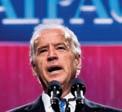
ANY MEMBER: U.S. HOUSE OF REPRESENTATIVES WASHINGTON, DC 20515 (202) 225-3121
tention is not to target Hamas militants but to exterminate all Palestinians in Gaza or expel them from their native homeland, clearing the area for more illegal Israeli settlements.
To anyone who has been paying attention to Israeli politics in recent years, it is known that Binyamin Netanyahu’s government has tacitly supported and helped to cultivate Hamas as a counter to the secular Palestine Liberation Organization. It did this in order to foment division among Palestinians and to hinder progress toward the development of an amicable two-state solution. The predictable outcome of promoting Hamas is seen in the attack of Oct. 7, which is now being ruthlessly exploited by Israel to further its colonial agenda.
The brutal violence of Israel’s response is only possible because of the billions of dollars of sophisticated weaponry supplied by the United States and the support of our armed forces. President Biden has stated that now is not the time for a ceasefire. When will the time be right? When every Palestinian from Gaza is either dead or driven to exile in Egypt?
If the United States does not demand an immediate ceasefire and peaceful resolution to this conflict, it will be judged by history and found complicit in murder.
Brian Reese, Clarks Summit, PA
19
. Inside Front Cover
We All Live in Gaza.
47
Zakat Foundation of America. . . . 27
Ziyad Brothers. . .
35
To the Anchorage Daily News, Nov. 16, 2023
I would like to thank Bill Sherwonit for his recent letter concerning the genocide of the Palestinian people. He gave a very
SECRETARY OF STATE ANTONY BLINKEN
U.S. DEPARTMENT OF STATE 2201 C ST. NW WASHINGTON, DC 20520
PHONE: (202) 647-6575
VISIT WWW.STATE.GOV TO E-MAIL

ANY SENATOR: U.S. SENATE WASHINGTON, DC 20510 (202) 224-3121
clear picture of what’s been happening there long before the horrific attack by Hamas on the Israelis.
This conflict has been on my radar for about 10 years, since I went to a talk on a college campus by a former Israeli soldier. In his words, “What Israel is doing to the Palestinians is terrorism.” He said as part of his duties, he would routinely go into Palestinian houses and lock their inhabitants in a room or closet and then proceed to eat their food or watch their television. He said one time he ordered an elderly man to sit on the curb in the hot sun all day without any shelter or water until he passed out.
I’ve watched this mass murder with anger, horror and sadness. I don’t understand how we as a country are openly supporting this slaughter of innocent people, many of whom are children. How can we sit by and watch them dying, not only because of the mass bombings, but also the withholding of basic needs like water and food? Israel is also bombing supposedly safe zones where Palestinians were told to go.
I’ve called our senators, the White House and Rep. Mary Peltola’s (D) office to ask them to put parameters and stipulations around the aid we give to Israel.
Peltola’s office is the only one where staff would speak to me. I was told that she is very aware of the situation. Her aide thanked me for calling and said she likes to hear from her Alaska constituents. I urge everyone to call and make your opinions clear. If we are truly a country that supports human rights, then we cannot support this genocide.
Elizabeth Durnford, Anchorage, AK
To Eugene Weekly, Nov. 9, 2023
Normally, I’d be sleeping at this time, but normally I’d be in Eugene relieved that the neighbors’ dogs weren’t keeping me awake with their barking. Instead, I’m in Bethlehem listening to the sound of Israeli jets overhead, likely on their way to drop more bombs on Gaza. When I contacted the KEZI reporter who’d written about Sen. Ron Wyden’s (D-OR) stop in Eugene and his comments on the Middle East crisis, an interview followed. Unfortunately, the resulting news story left out the part about the cause of this crisis, the Israeli occupation and America’s role in it.
Forty-five miles away in Gaza a massacre is underway, executed by the Israeli forces and funded by the American taxpayer, among other unknowing investors, such as Oregon Public Employees Retirement System (PERS) members. Yes, the Oregon Public Employees Retirement Fund (OPERF) has numerous equities supporting the Israeli occupation. Check out Elbit Systems for starters. I learned of OPERF investments in May 2022 and have been trying to get out of them ever since. I can’t live with or on a pension derived from investments linked to harms to people and places. Not only am I linked to the slaughter of Gazans, but also the daily indignities Palestinians are subjected to in their own land, not to mention the ongoing theft of that land. My taxes and retirement benefits are no less a part of this occupation than Netanyahu, the Ministry of “Defense” and the forces doing the dirty work.
There’s hope, though, or at least I’m hoping in hope. In the 1980s, PERS divested from apartheid South Africa. Now if only I can help the Oregon Investment Council (OIC), the appointed fiduciaries deciding OPERF investments, to understand that the Israeli occupation is apartheid against Palestinians. A review of Amnesty International’s comprehensive report on the matter can elucidate this fact. Or, I’m happy to be the OIC’s eyes and ears on the ground here in occupied Palestine. It doesn’t look or sound pretty, cer-
tainly not like something anyone would want to perpetuate with their pension fund.
I guess I have KEZI to thank for this letter, as it took the news agency some real effort to report on what began here on the morning of Oct. 7 without addressing the why. Because KEZI couldn’t or wouldn’t, I’ve turned to the one local news source that will. Thank you, Eugene Weekly
Molly Sirois, Eugene, OR
To The Frederick News-Post, Nov. 3, 2023
While I share Alice Haber’s call for “peace, now,” in Palestine and Israel (“Tentacles of evil test avoidance of the word ‘hate,’” Oct. 20), I take issue with her characterization that Israel—since its founding—“wants only to live in peace with its neighbors.”
This would be news to Palestinians who have endured decades of unending occupation, dispossession and apartheid.
Haber writes that Israel “offers jobs to the Palestinians, hospital care and other essentials.” But as Palestinian American poet Remi Kanazi recently wrote, “Palestinians aren’t victims in need of aid; they’re an occupied people in need of freedom.”
Amnesty International, Human Rights Watch and B’Tselem, an Israeli human rights organization, have recognized the devastating reality of Israel’s apartheid system.
Each of these human rights organizations has found that Israel enforces a system of oppression and domination against Palestinian people wherever it has control over their rights.
Haber wrote that she sees on campuses and in streets people “defending Hamas, and that is sad and disturbing.”
I strongly reject the suggestion that people of conscience—many of whom have been Jewish—who have participated in demonstrations opposing a military assault that has been devastating Palestinian civilians, particularly children, are “defending Hamas.”
Over the past month of Israel’s genocidal bombardment of Gaza—one of the most densely populated areas on the planet,
which has been under an illegal blockade for 16 years, trapping 2.3 million people who live there (half of whom are children) in the world’s largest open-air prison—at least 6,600 children have been killed, with another 1,000 missing, injured or presumed dead, under the rubble of entire city blocks, as Israel flattens apartment buildings and refugee camps.
More than 40 percent of all of those killed in Gaza have been children.
This devastation must end. We must have a ceasefire. But to truly have a brighter future for all, the source of this suffering and violence must be uprooted.
To quote Stefanie Fox, executive director of Jewish Voice for Peace, in The Nation: “To point out Palestinian oppression is not, as so many commentators have alleged, to justify the unjustifiable killing of Israeli civilians by Hamas. It is simply another way of asking that we treat Palestinians with the empathy and decency that we ourselves long for, and to actually take the steps necessary to ensure the only real and lasting peace—the kind that will come with Palestinian freedom, justice and equality.”
Ian Thompson, Frederick, MD
To the Toronto Star, Dec. 2, 2023
I’m deeply troubled by Rosie DiManno endorsement of the notion that pro-Palestine rallies are “hate rallies.” I am Jewish and a member of the Jews Say No to Genocide Coalition. We, like many other Jews of conscience, have had our voices silenced by the media as the notion of nonZionist Jews undermines the Israeli myth that diaspora Jews are a monolith of Zionism.
Ironically, the perpetuation of this myth is, in fact, anti-Semitic.
Sadly, other Zionists (including my own family and friends), will label me “selfhating” or “not a real Jew,” because I won't toe the pro-Israel line.
Israel does not represent my Jewish values: social justice, compassion, truth and peace.
Mark Birnbaum, Toronto, ON
The following are individuals, organizations, companies and foundations whose help between Jan. 1, 2023 and Dec. 2, 2023 is making possible activities of the tax‐exempt AET Library Endowment (federal ID #52‐1460362) and the American Educational Trust, publisher of the Washington Report on Middle East Affairs. Some Angels will help us co‐sponsor the next IsraelLobbyCon. Others are donating to our “Capital Building Fund,” which will help us expand the Middle East Books and More bookstore. We are deeply honored by your confidence and profoundly grateful for your generosity.
* In Memory of Farhana (Lunat) Rana
**In Memory of Dick & Donna Curtiss
***In Memory of Dr. Jack G. Shaheen
****In Memory of John Goelet
#In Memory of Andy Killgore
##In Memory of Diane Rose Cooper
###In Memory of George Hanna

GIFT A BOOK OR A ONE-YEAR SUBSCRIPTION
Let Middle East Books and More and the Washington Report help you complete your holiday shopping! Visit MiddleEastBooks.com and wrmea.org/subscribe.










































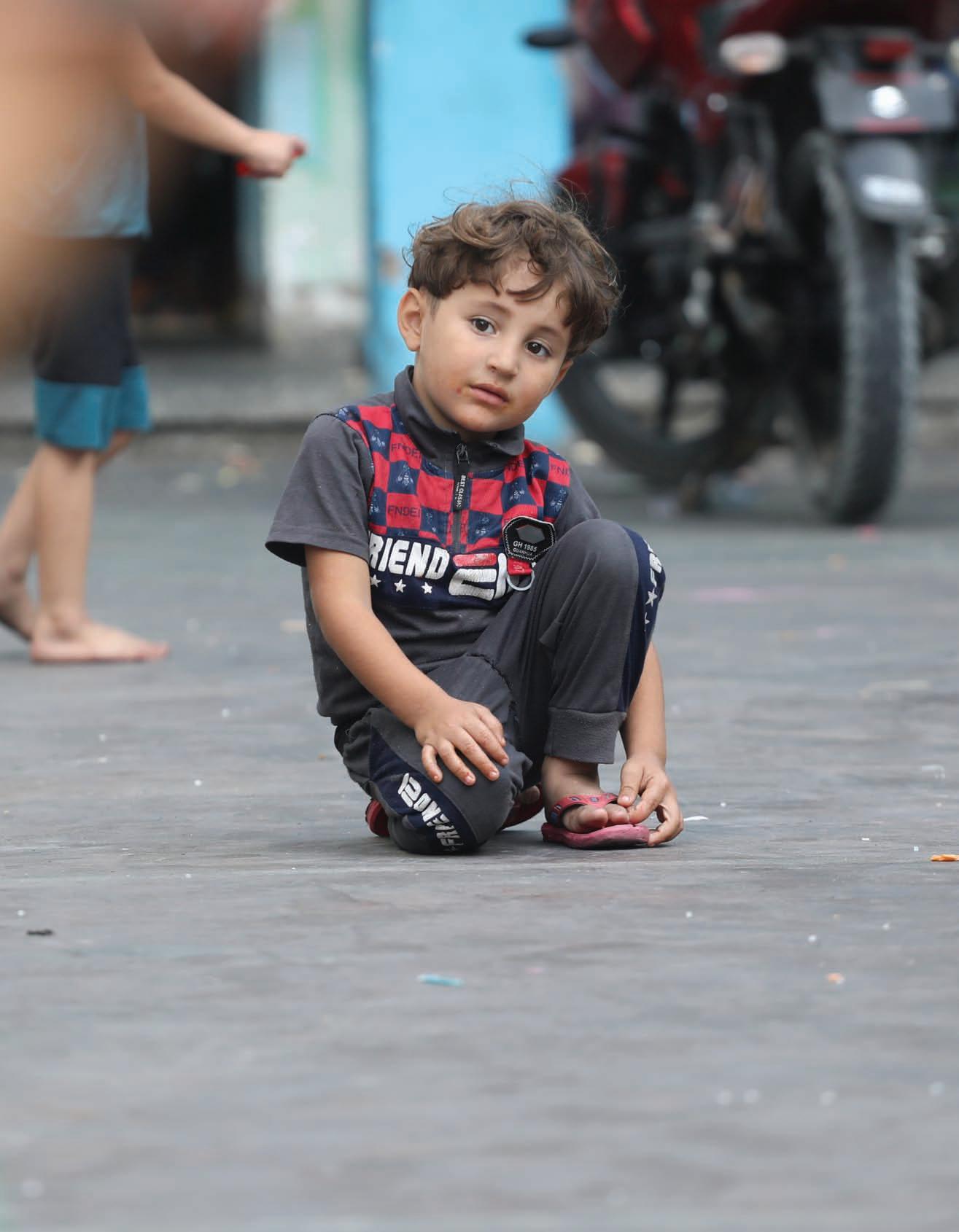













American Educational Trust
Washington Report on Middle East Affairs
P.O. Box 53062
Washington, DC 20009
January/February 2024
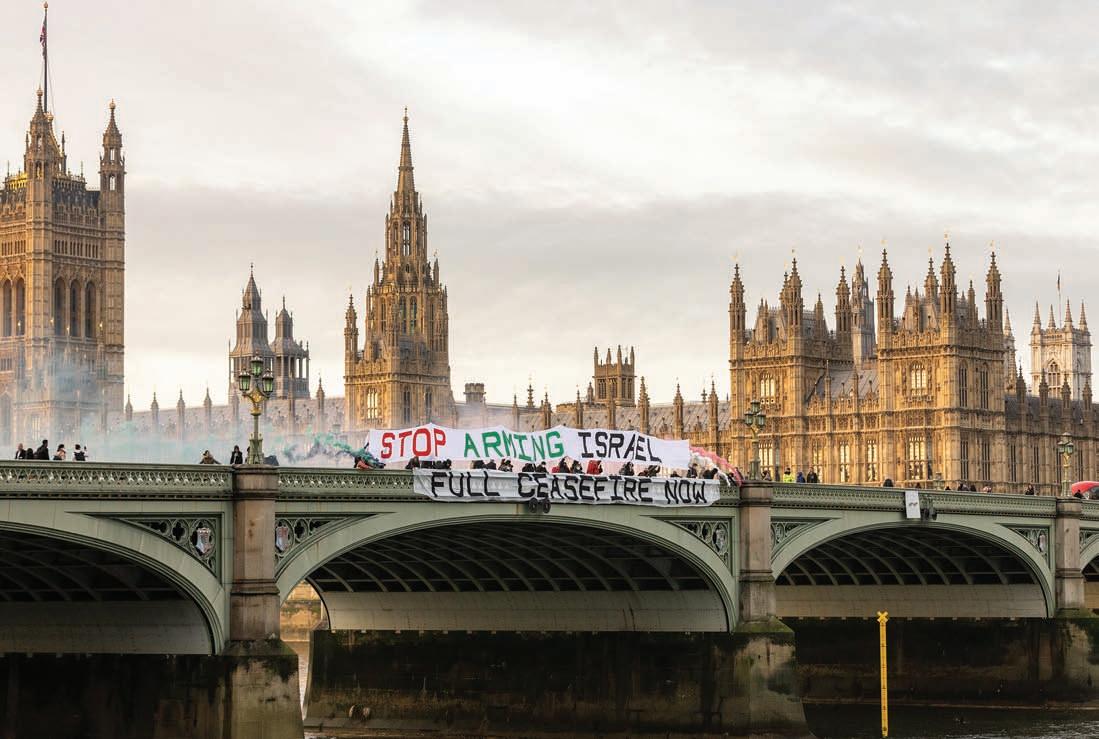
Pro‐Palestinian activists from the Free Palestine Coalition stand in front of Parliament on Westminster Bridge with banners calling on the UK government to demand the cessation of arms sales to Israel and a full ceasefire in Gaza on Nov. 29, 2023 in London, United Kingdom. The action took place on the U.N. Inter‐national Day of Solidarity with the Palestinian People, which has been observed on or around Nov. 29 every year since its creation in 1977.